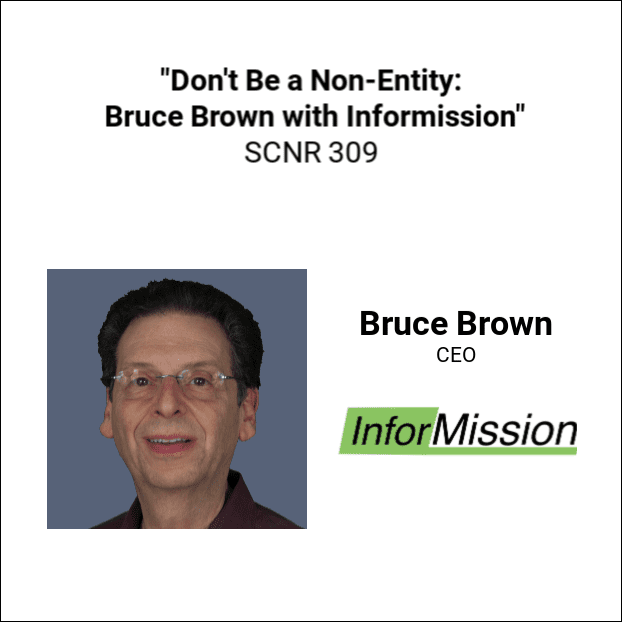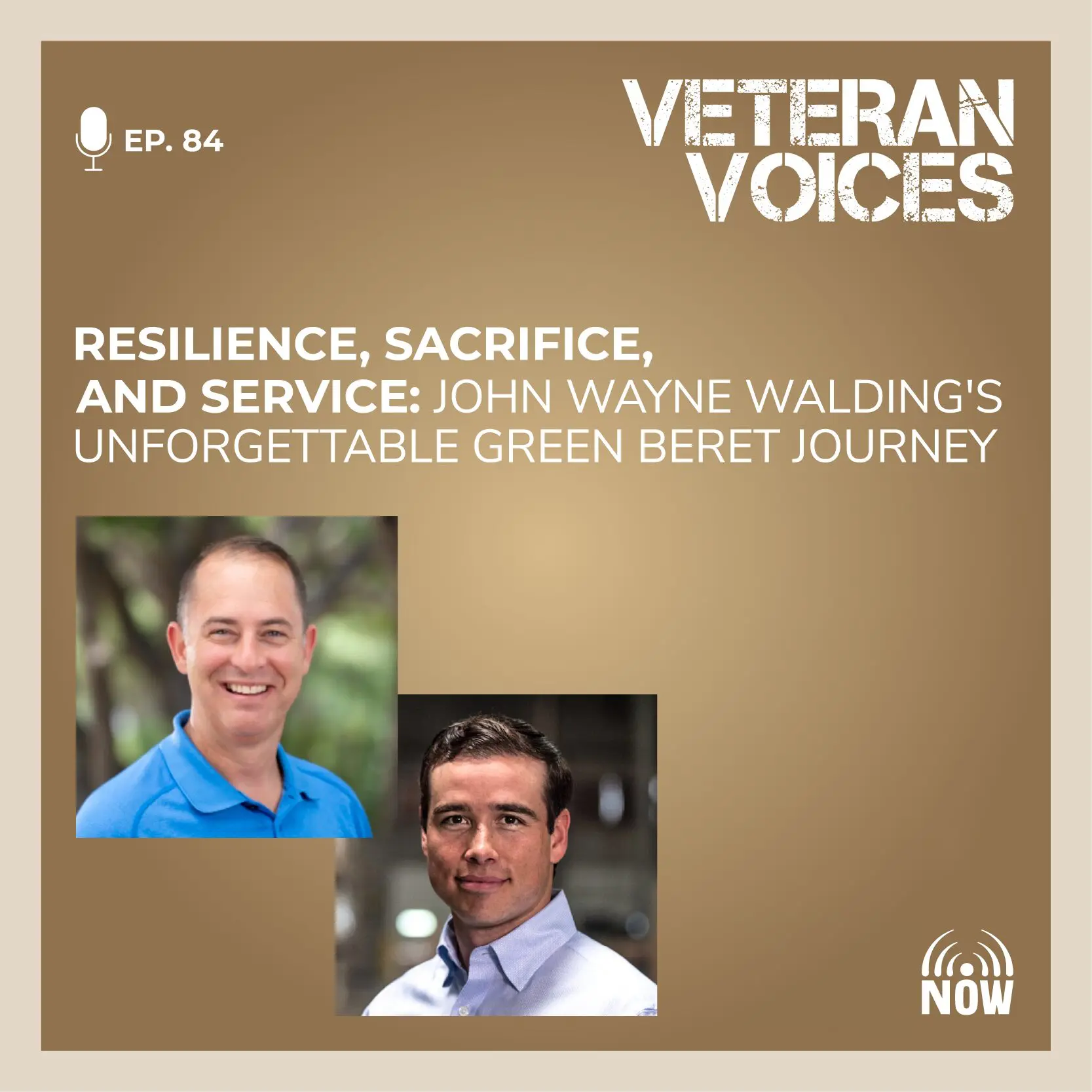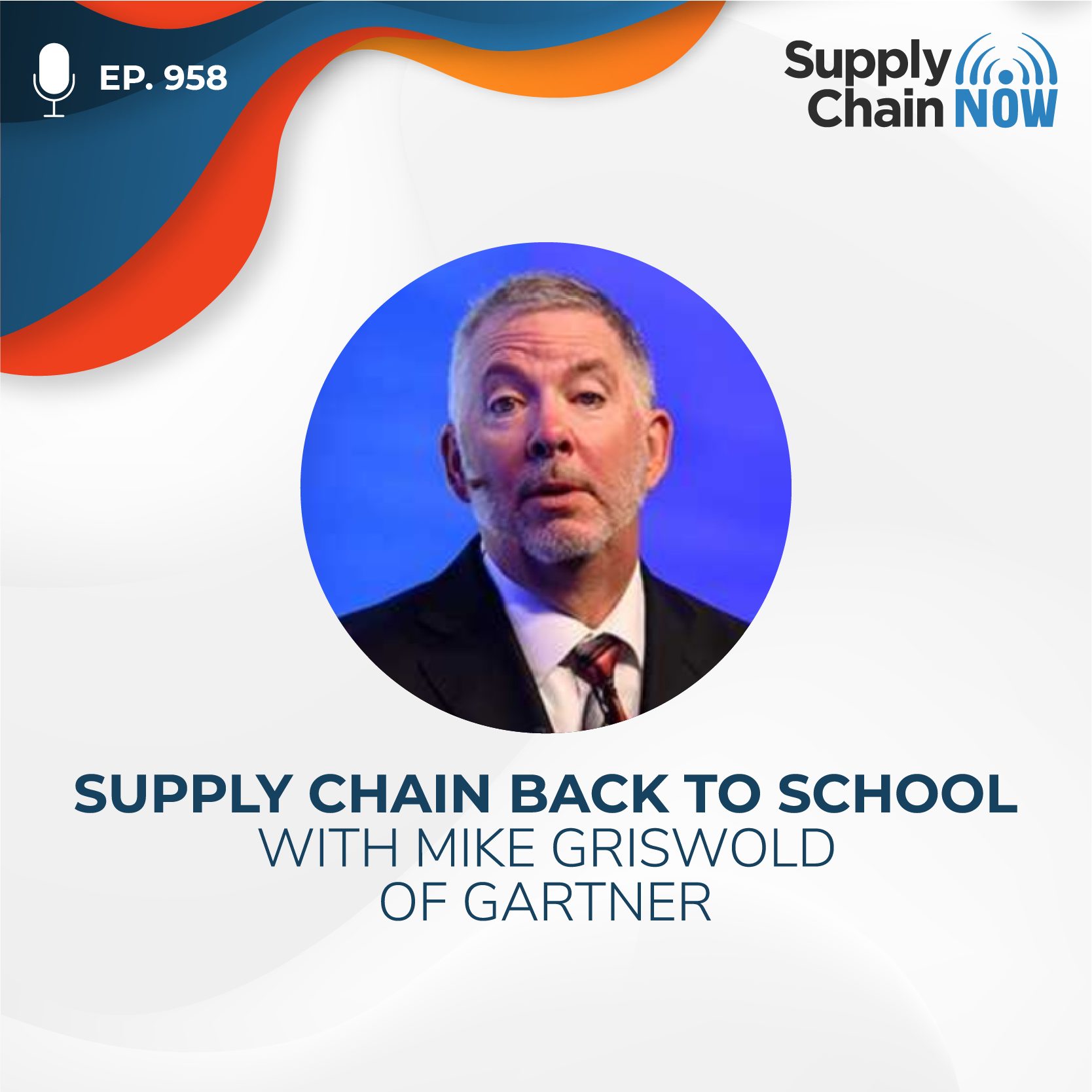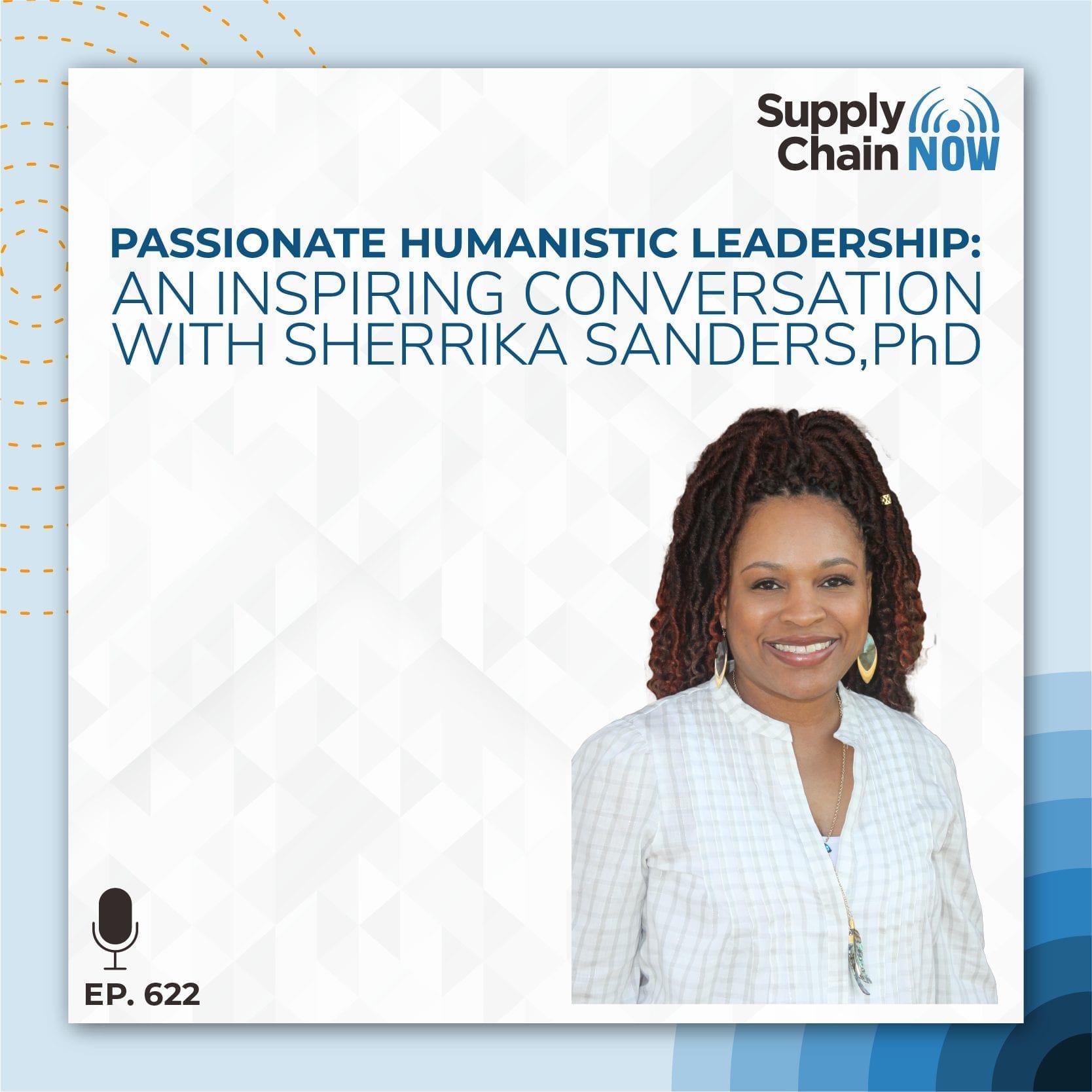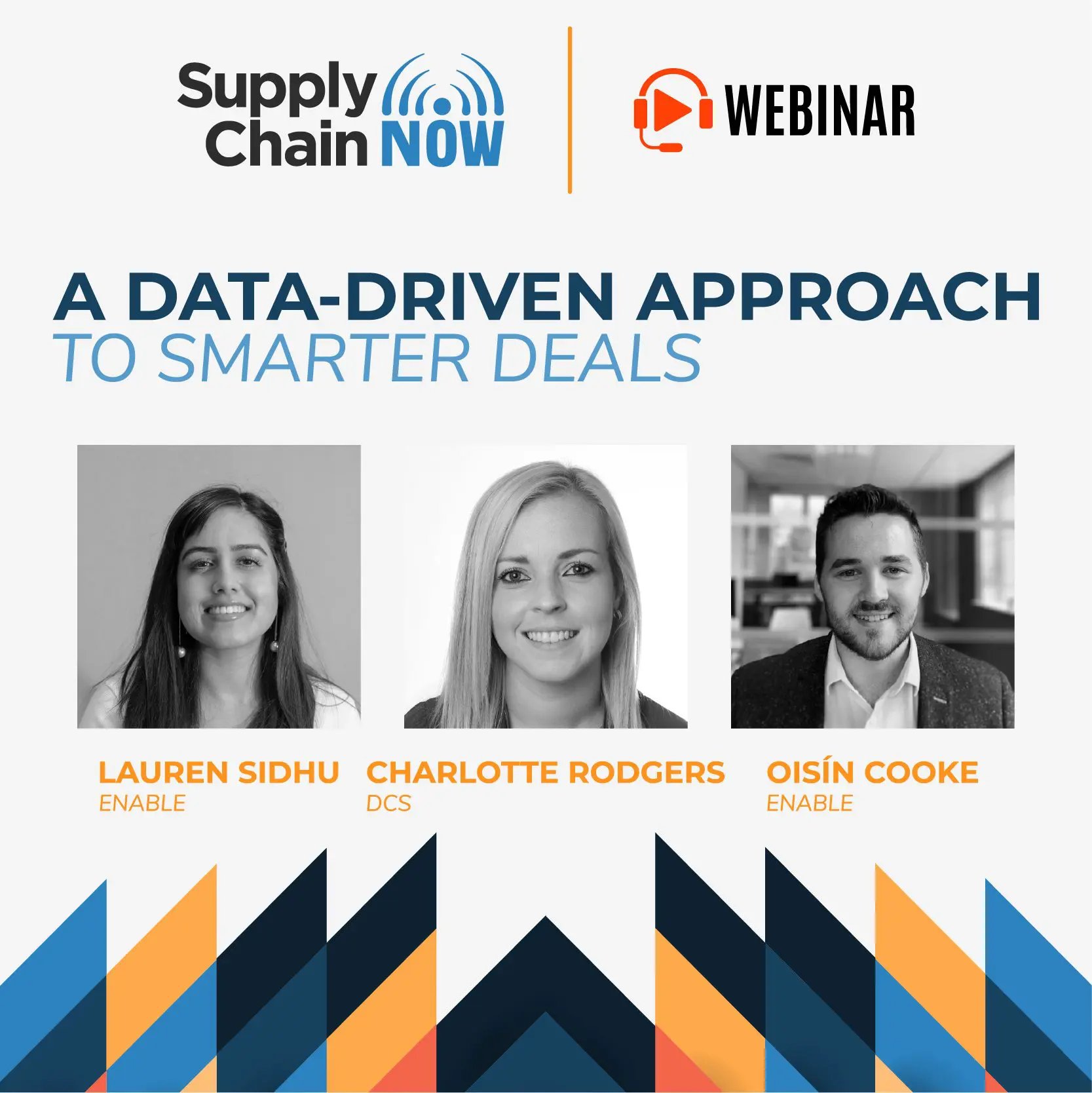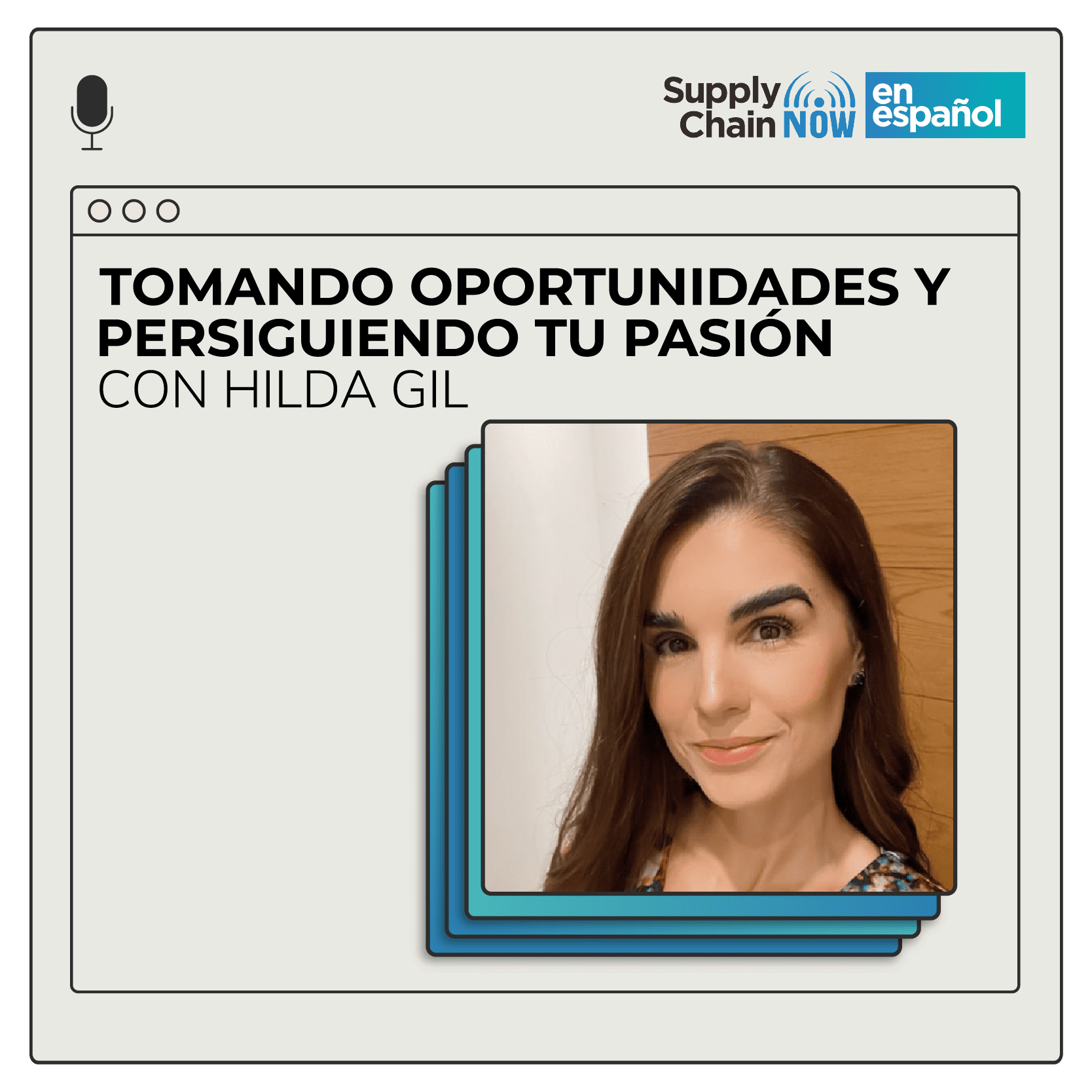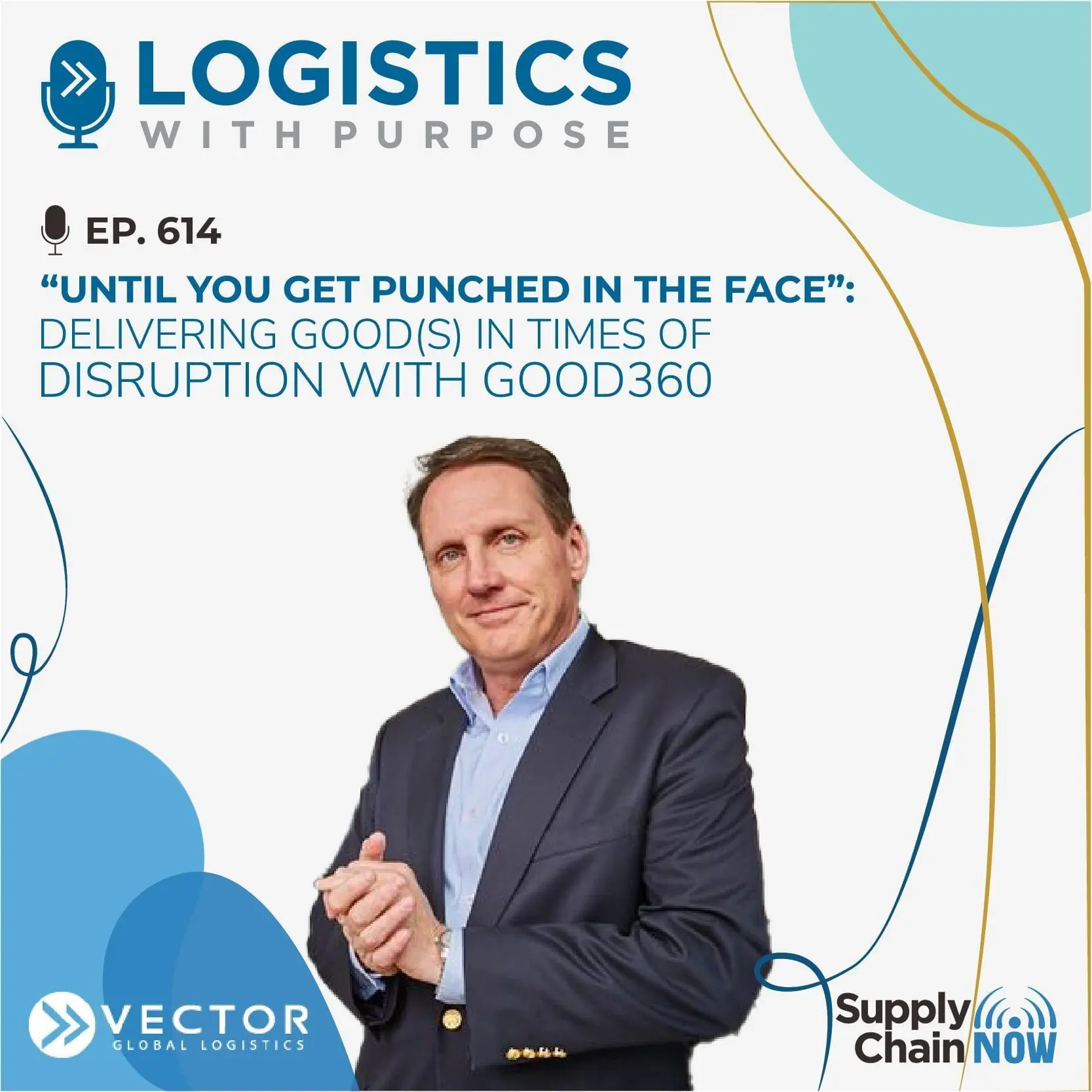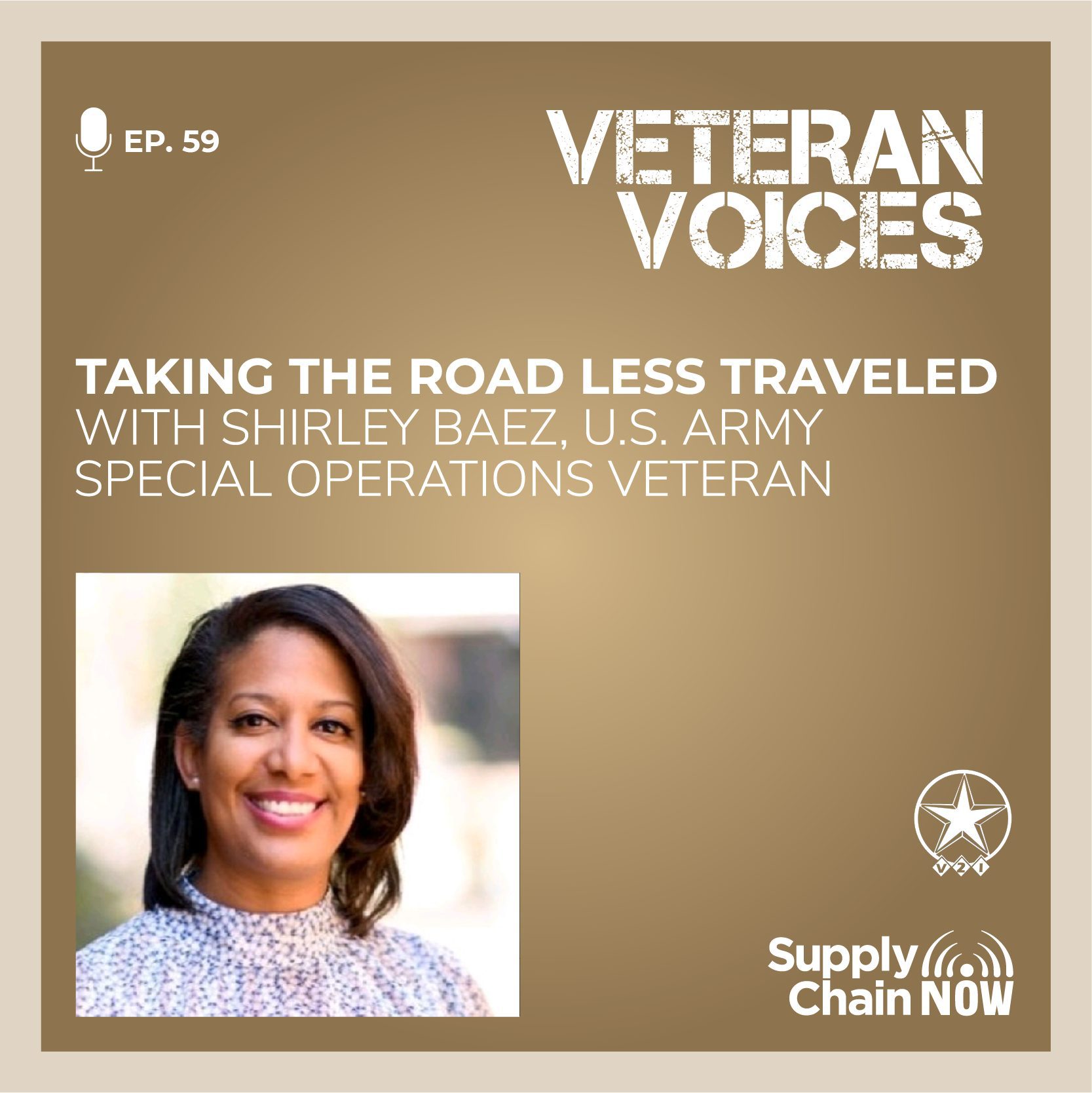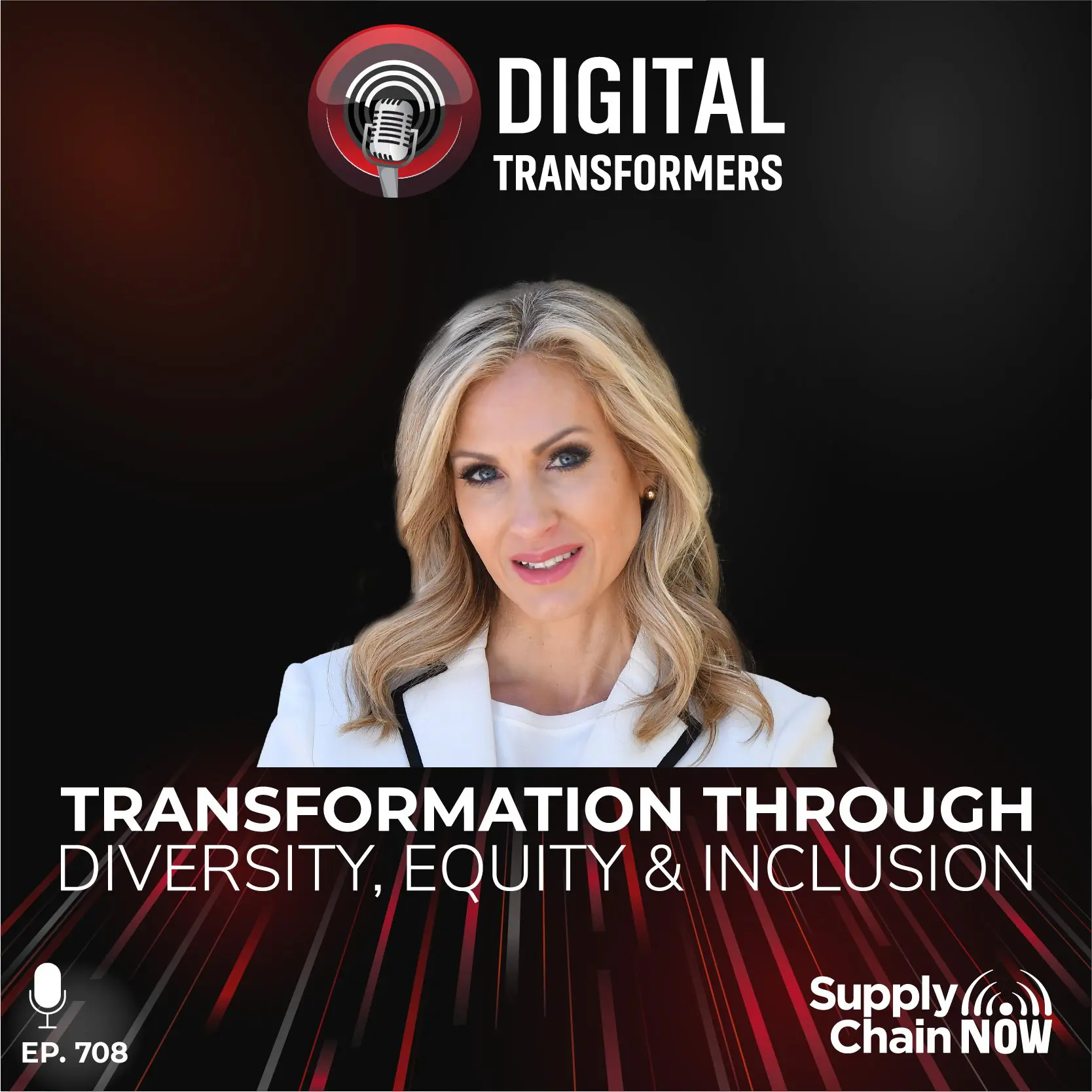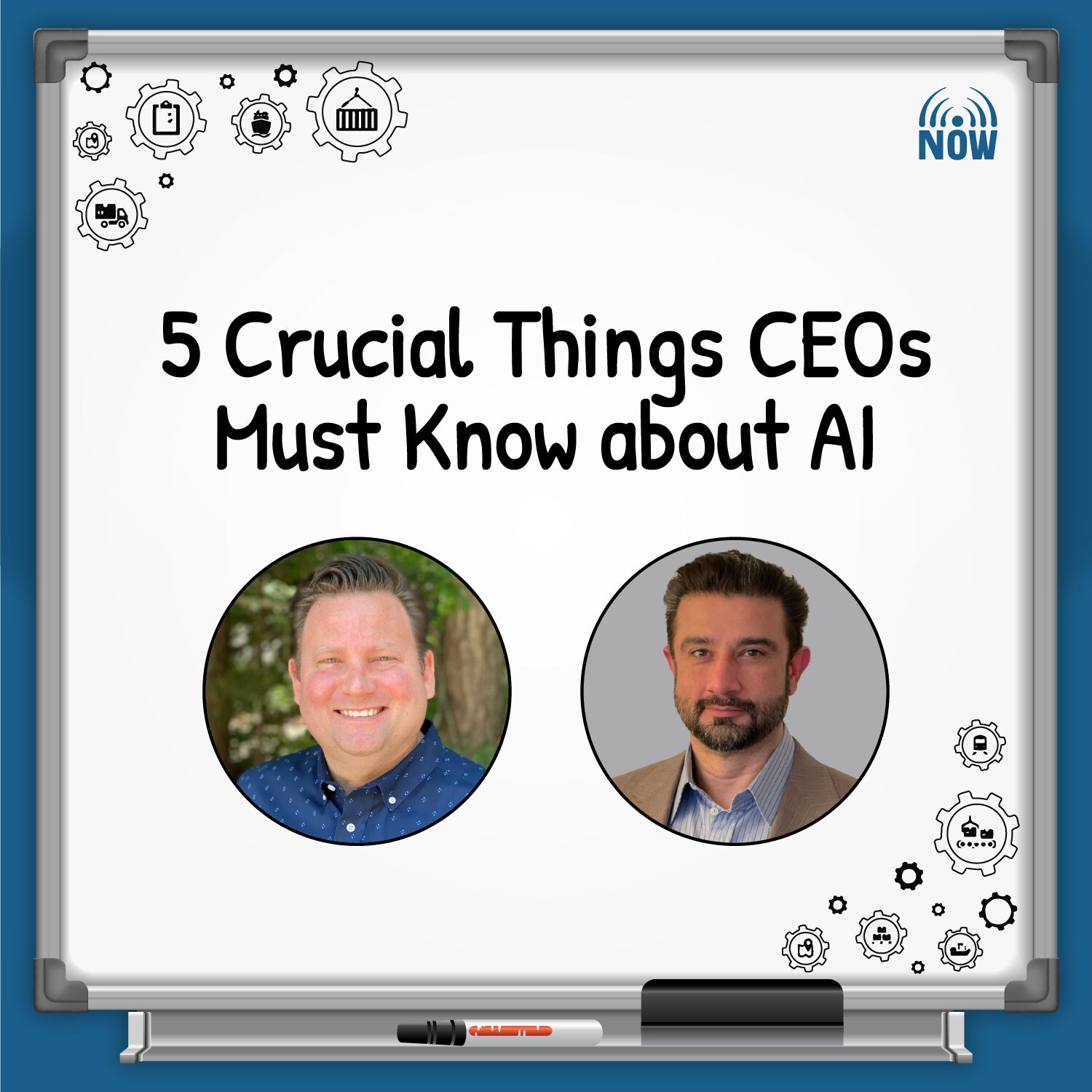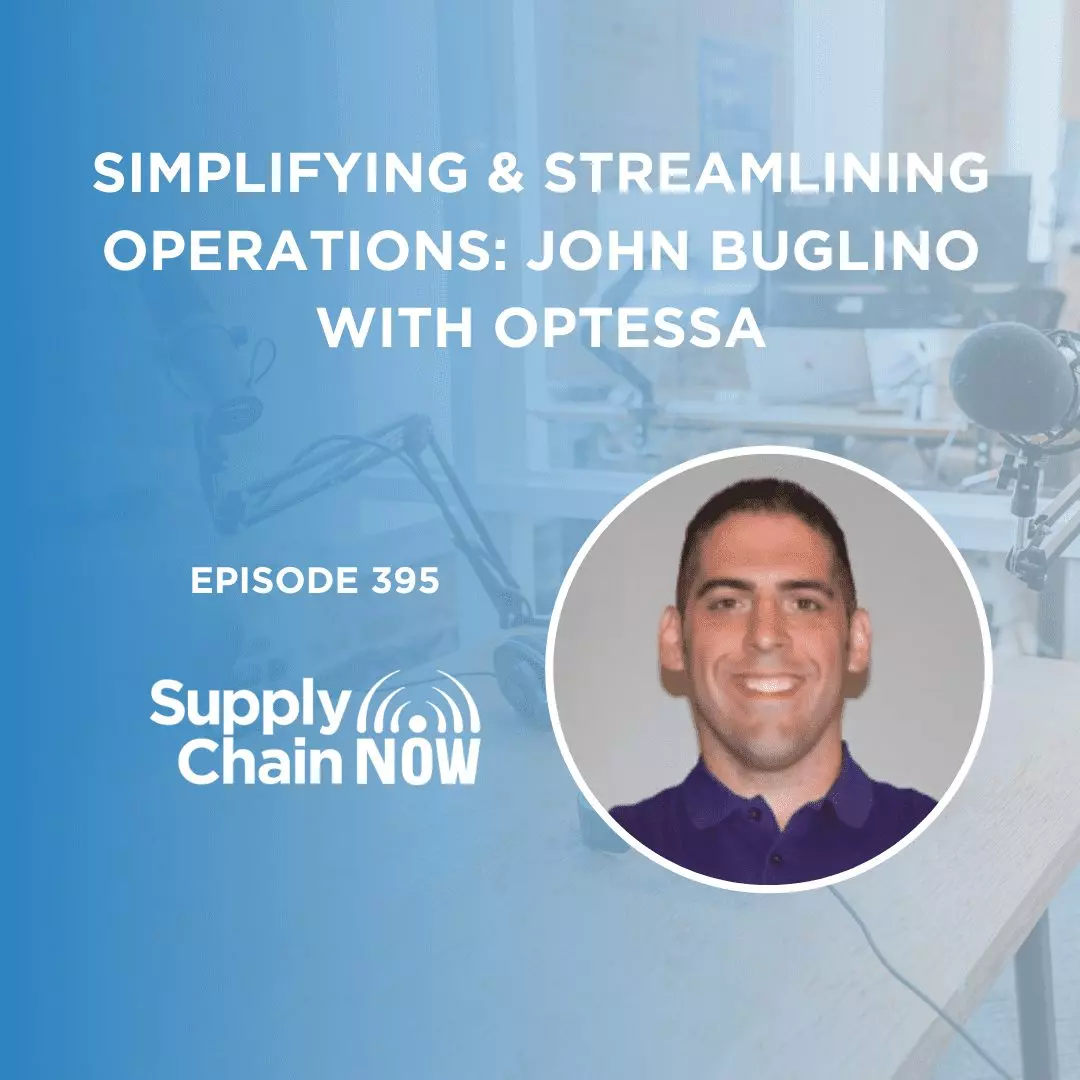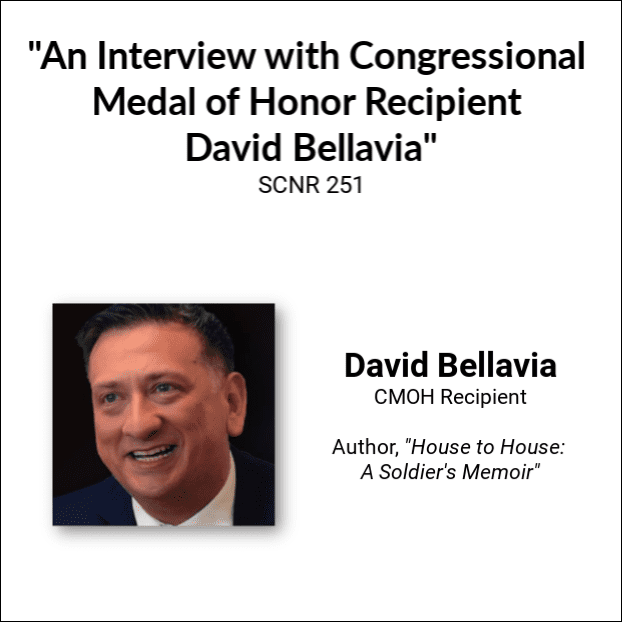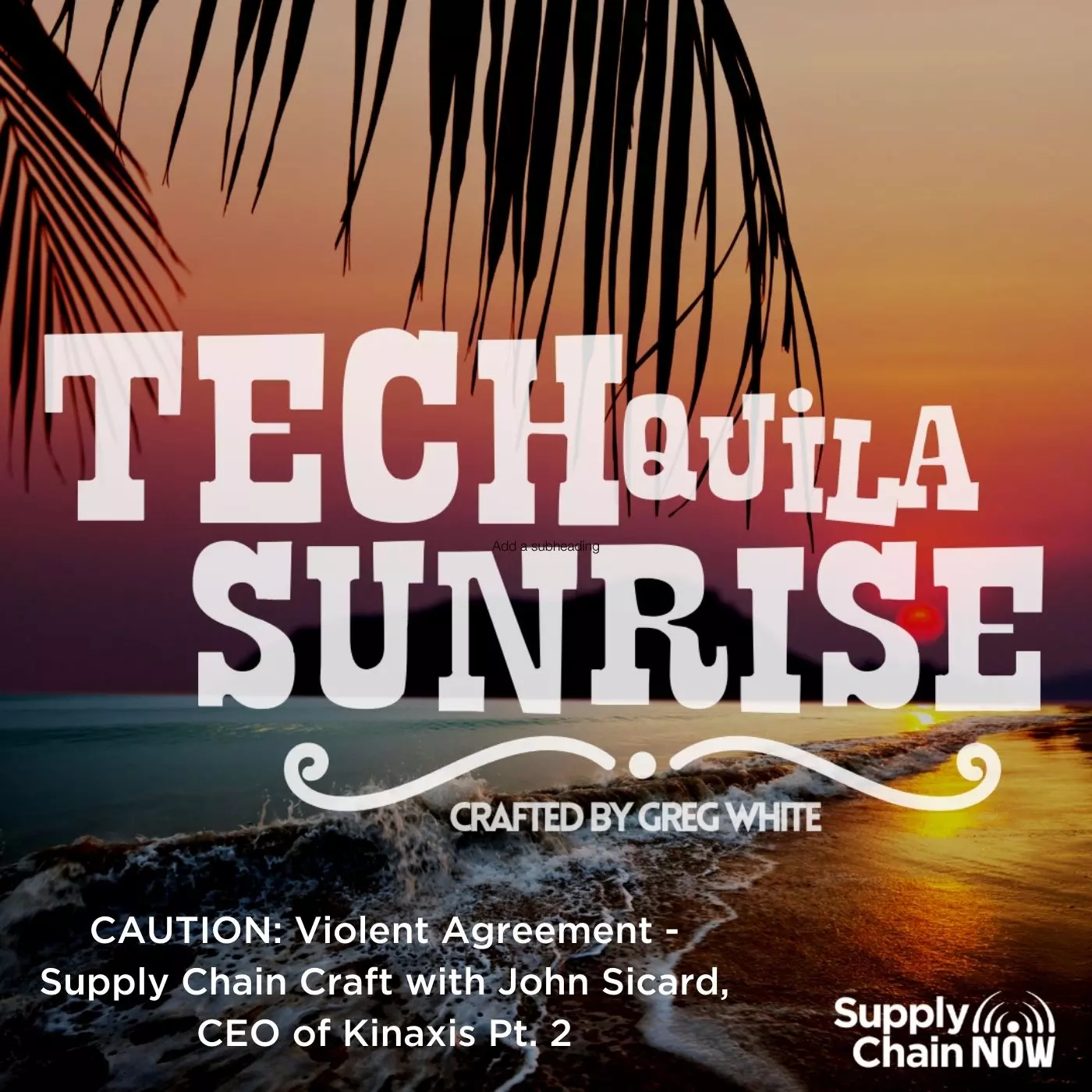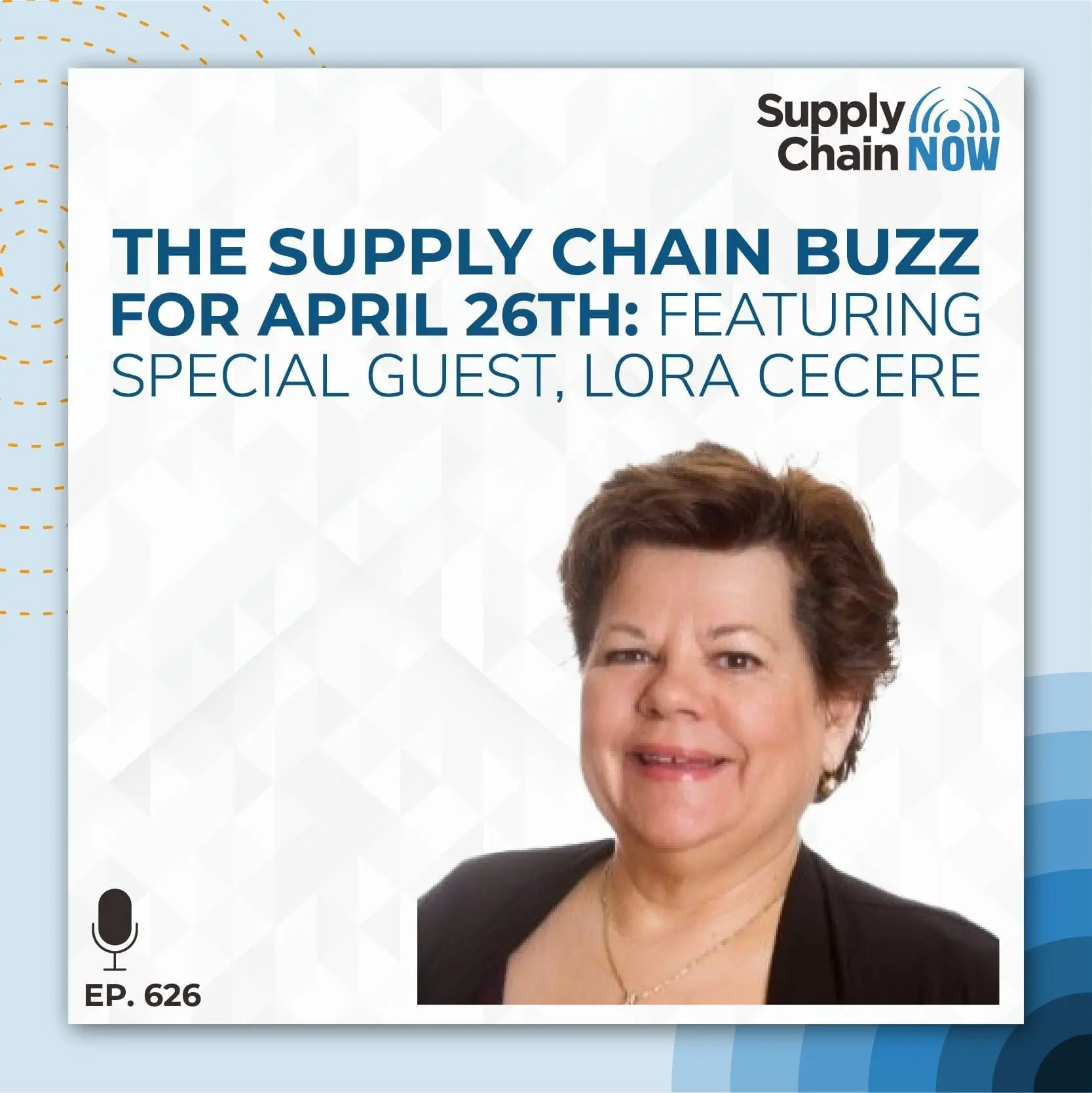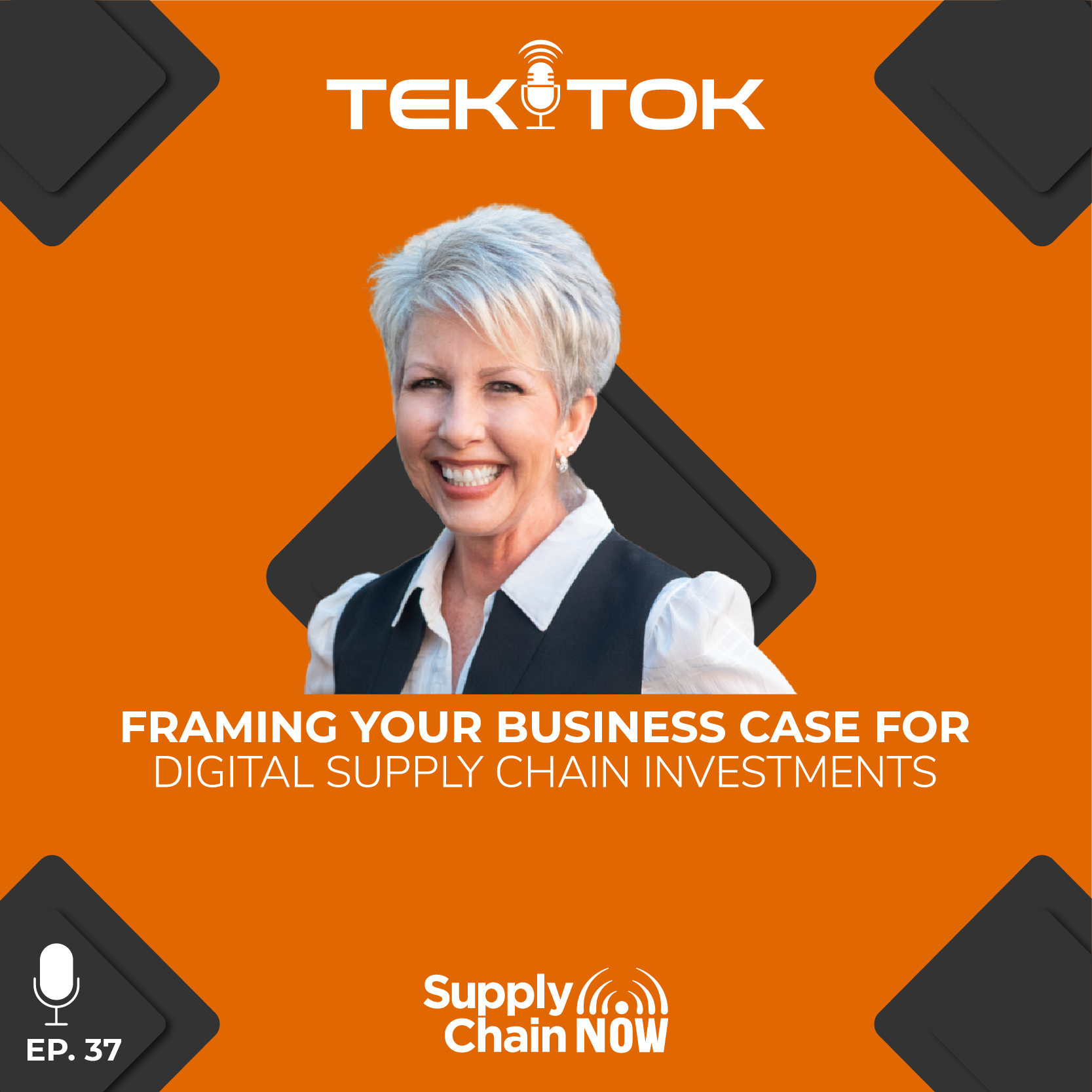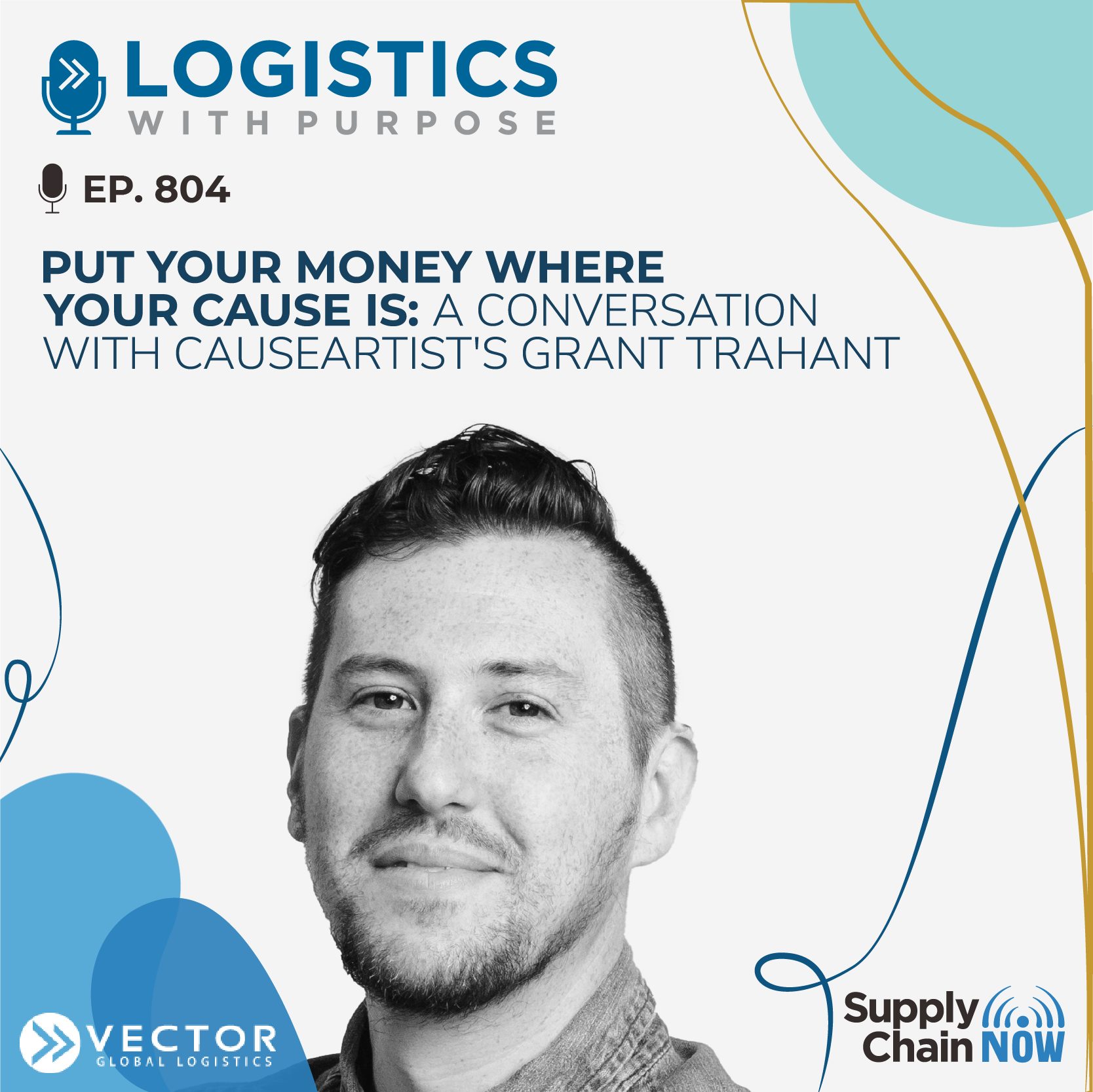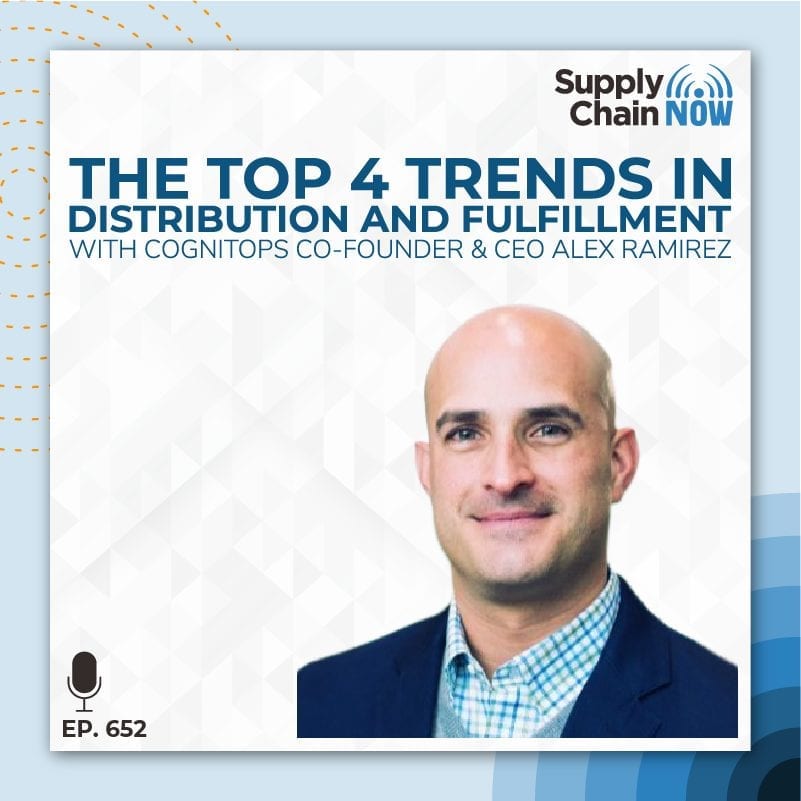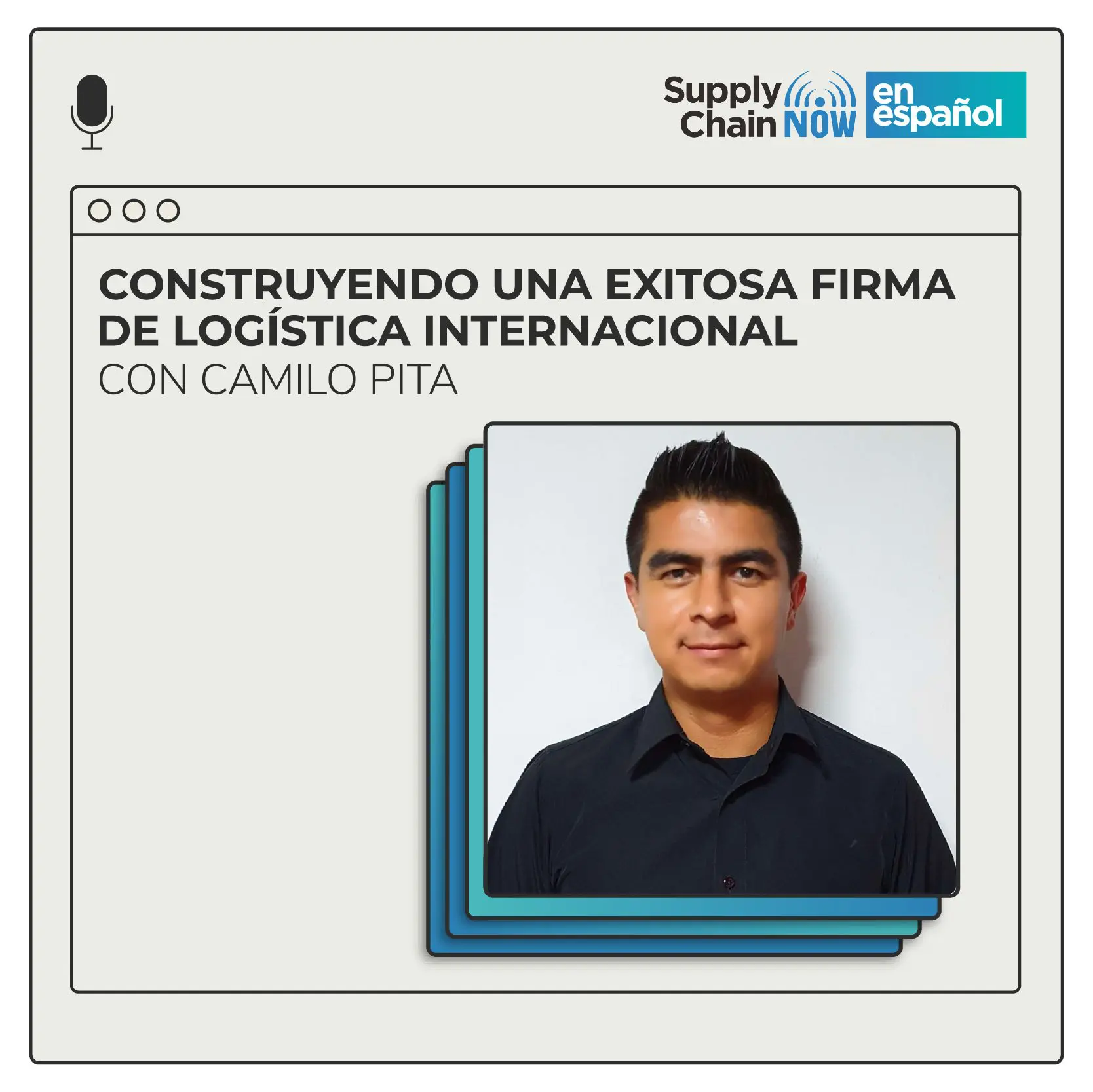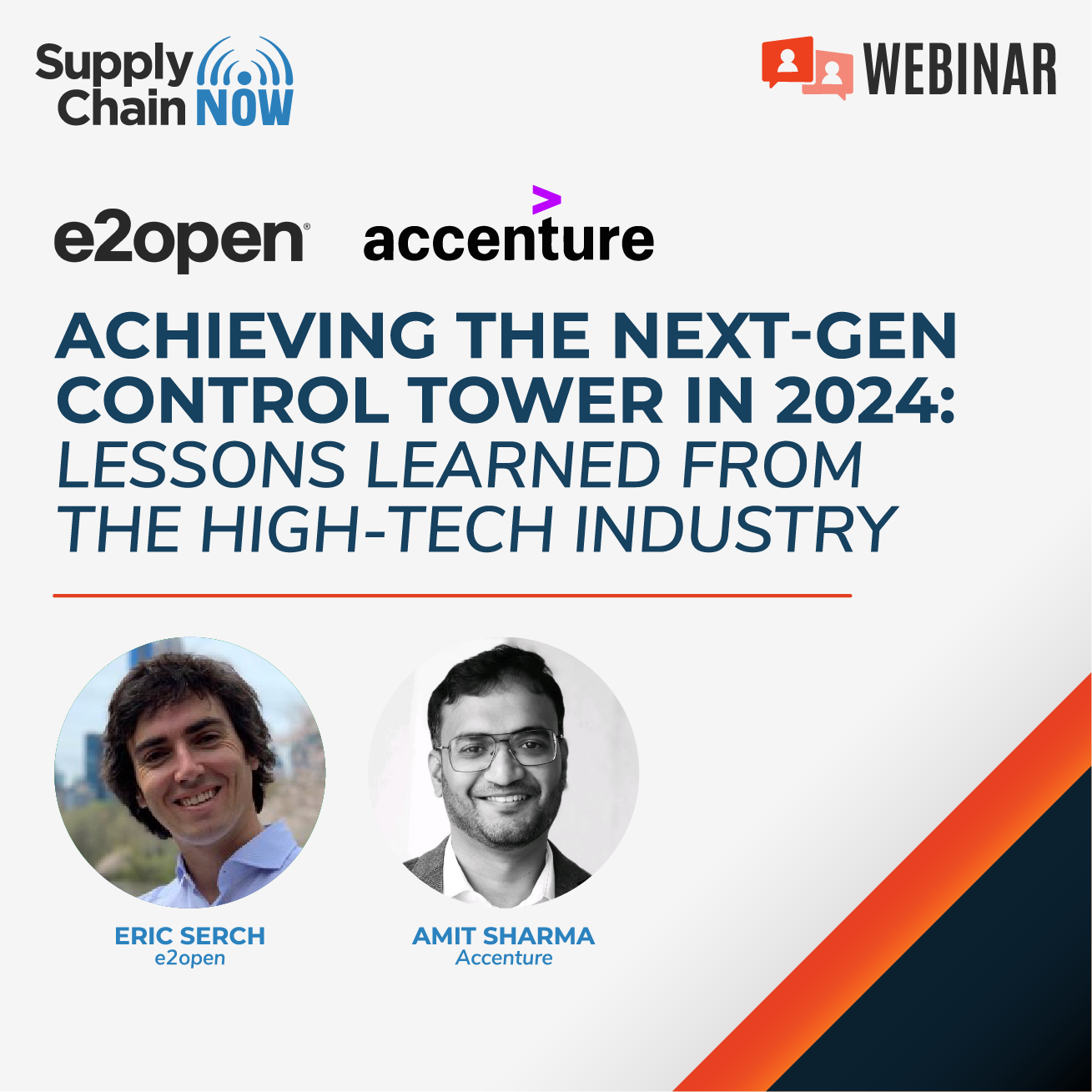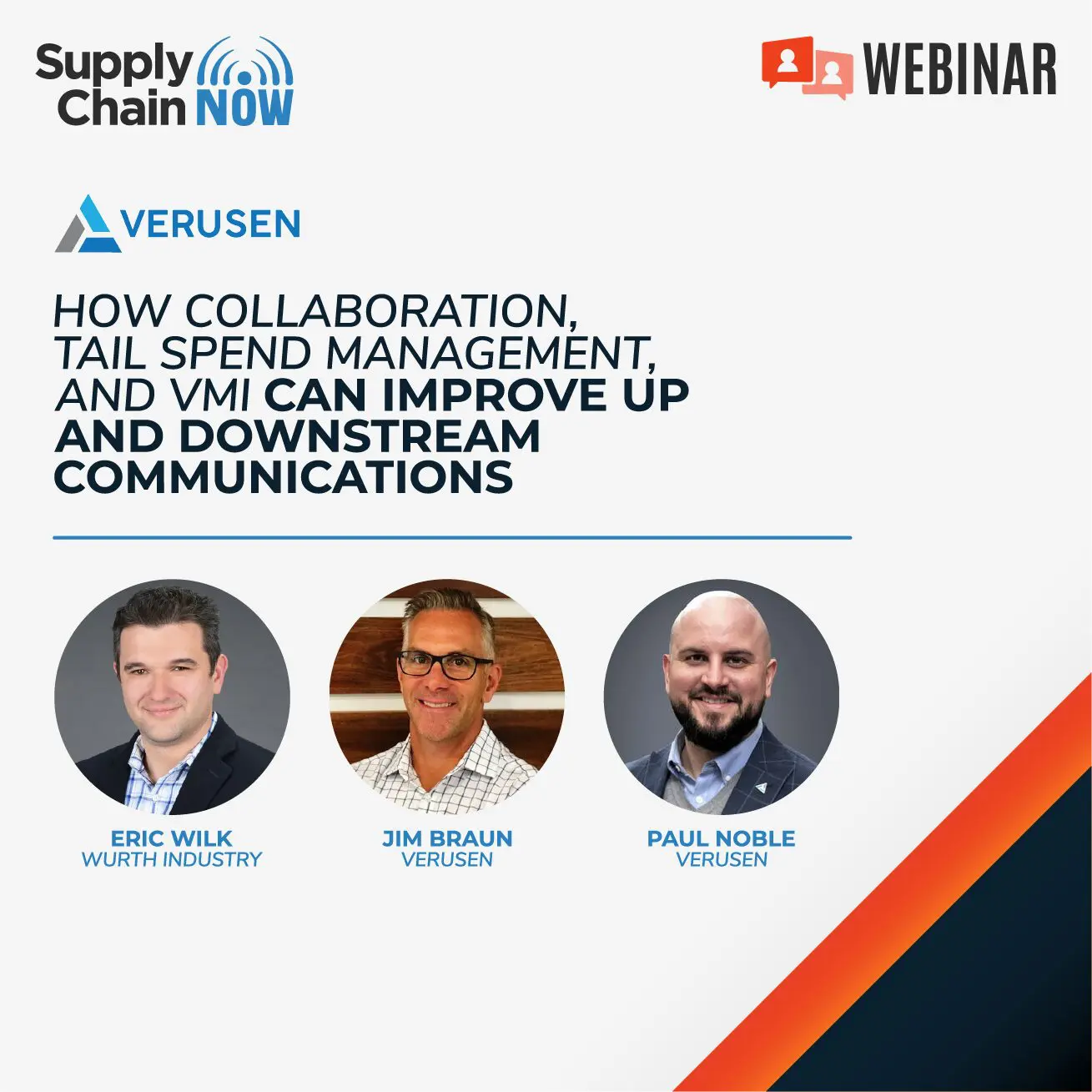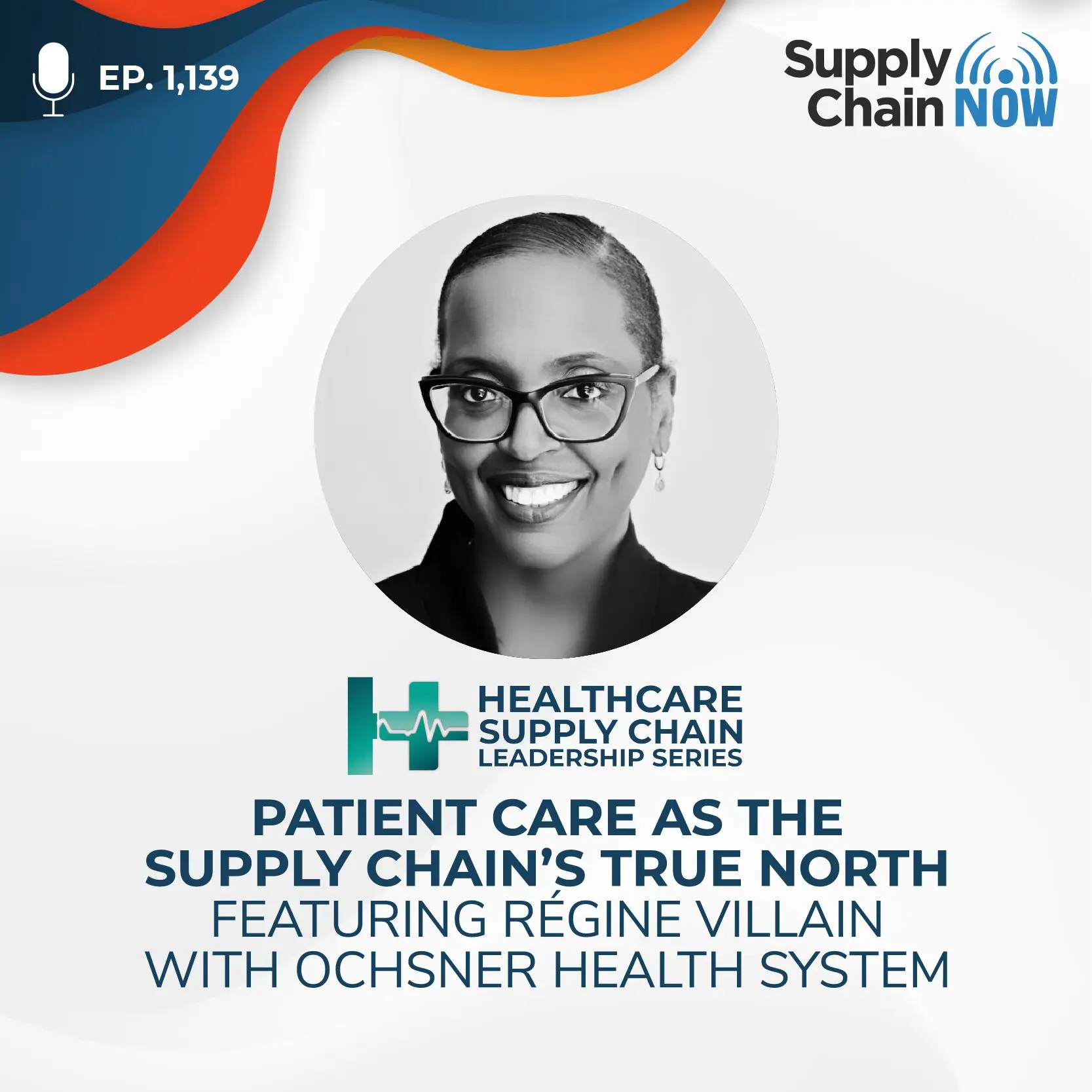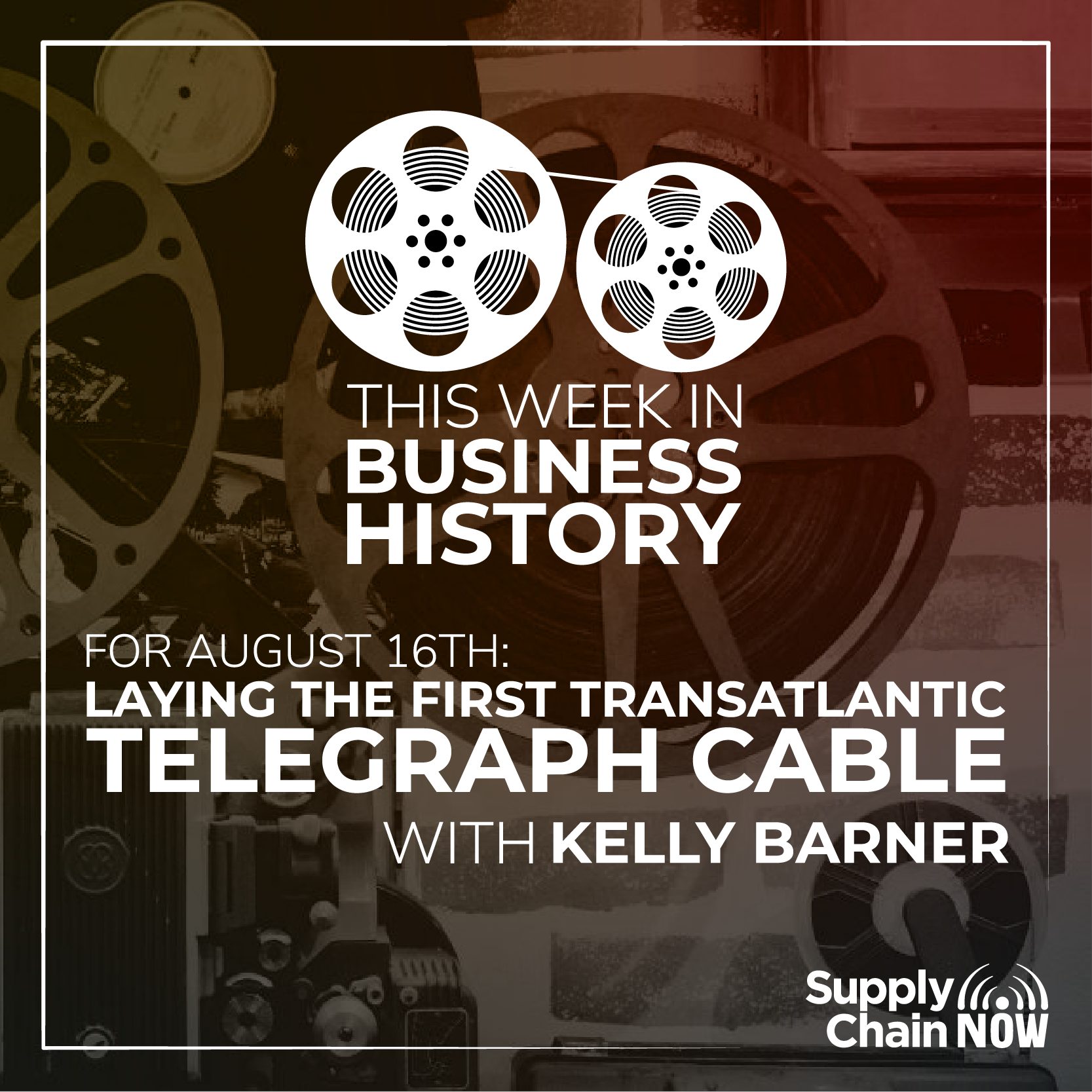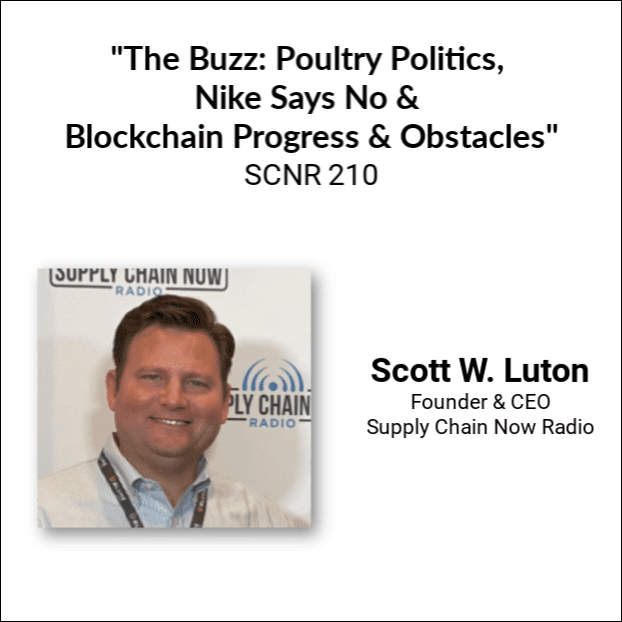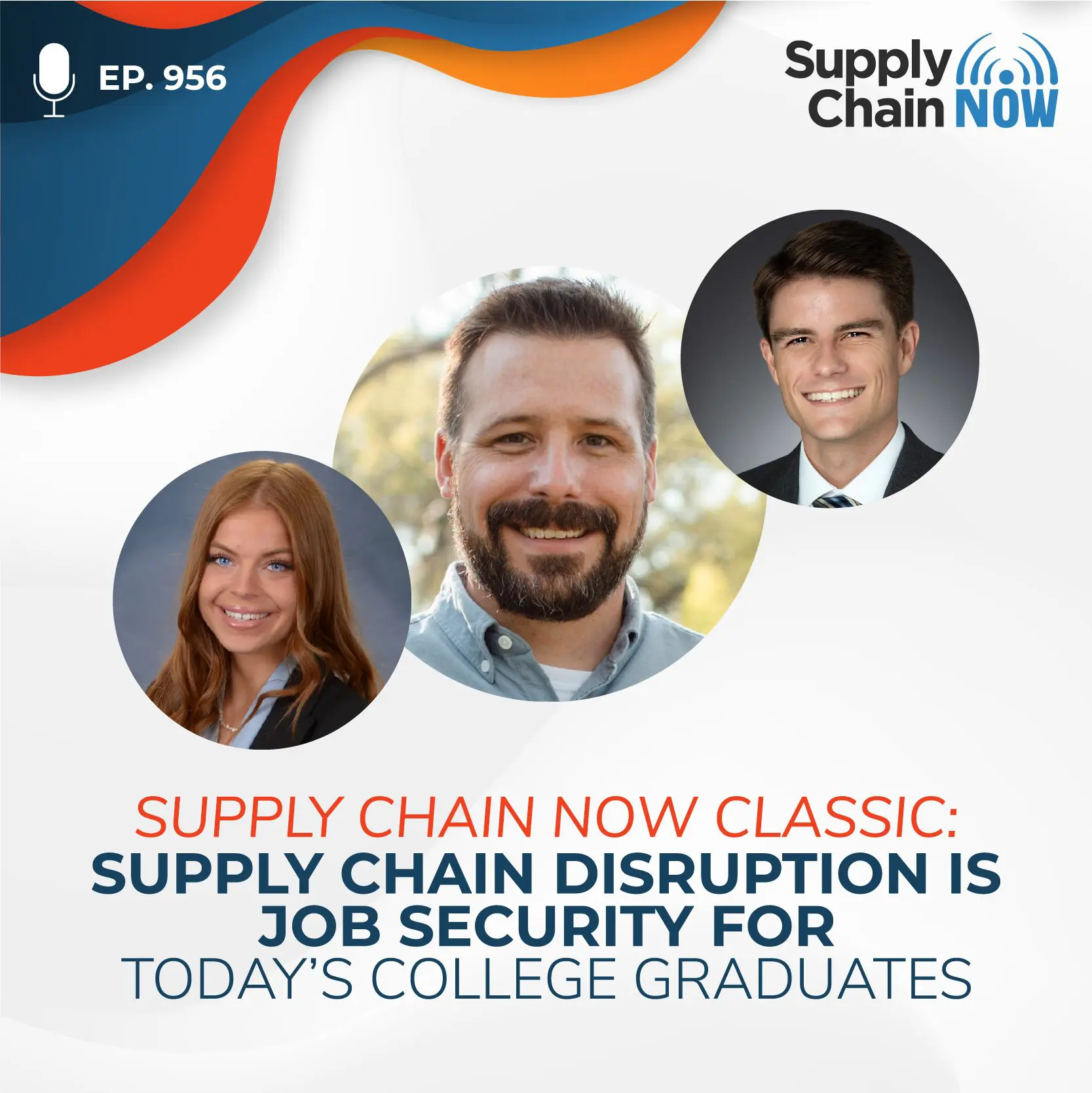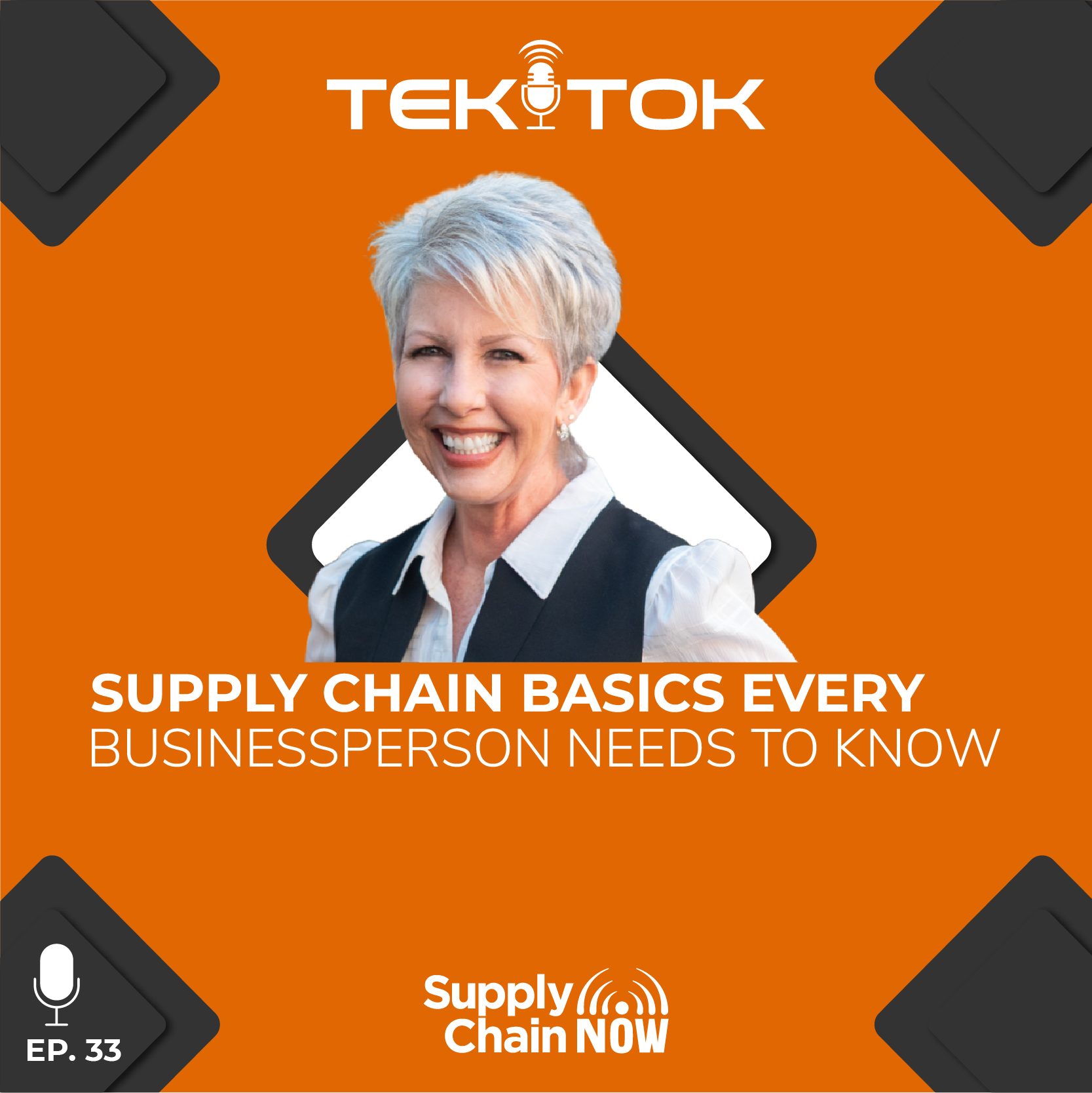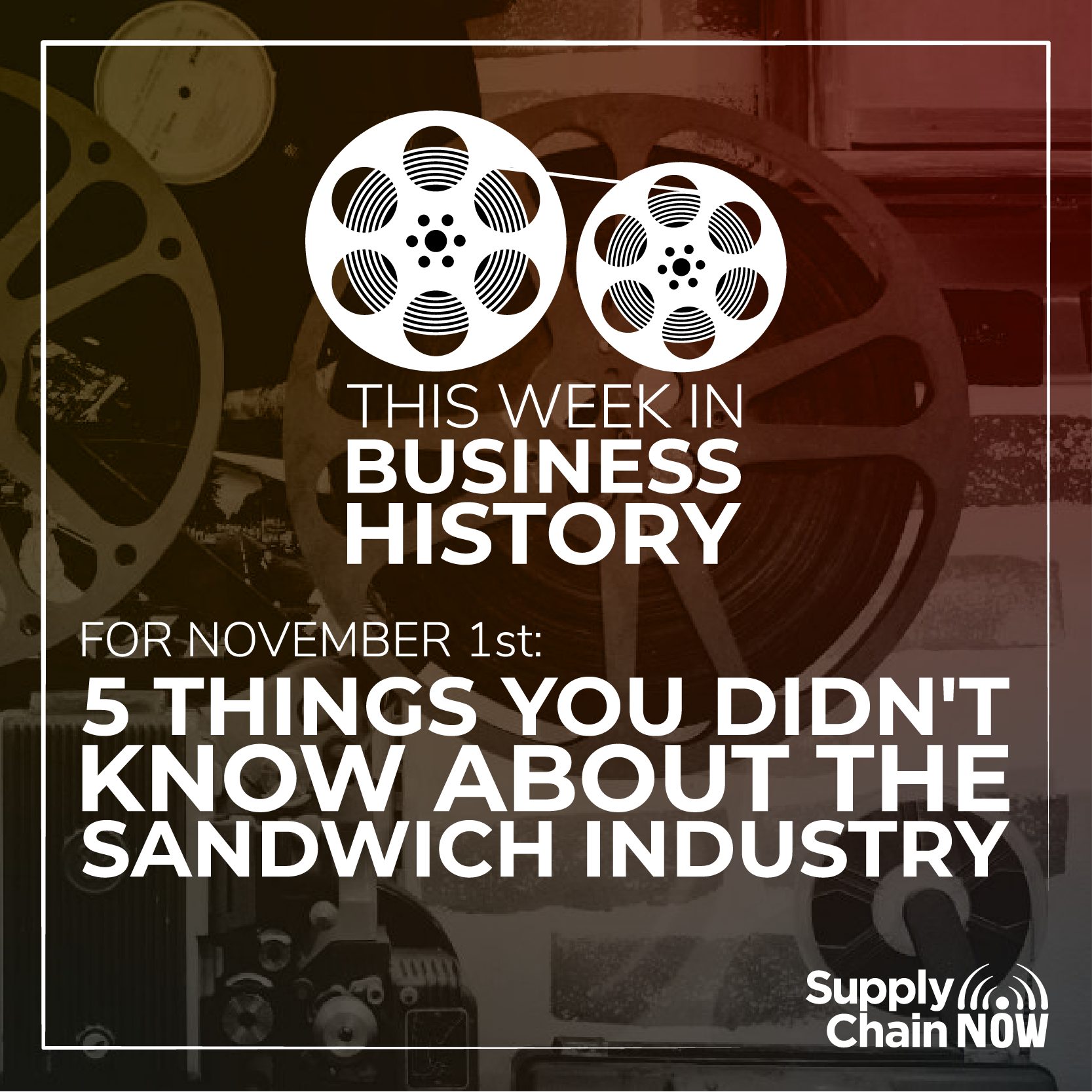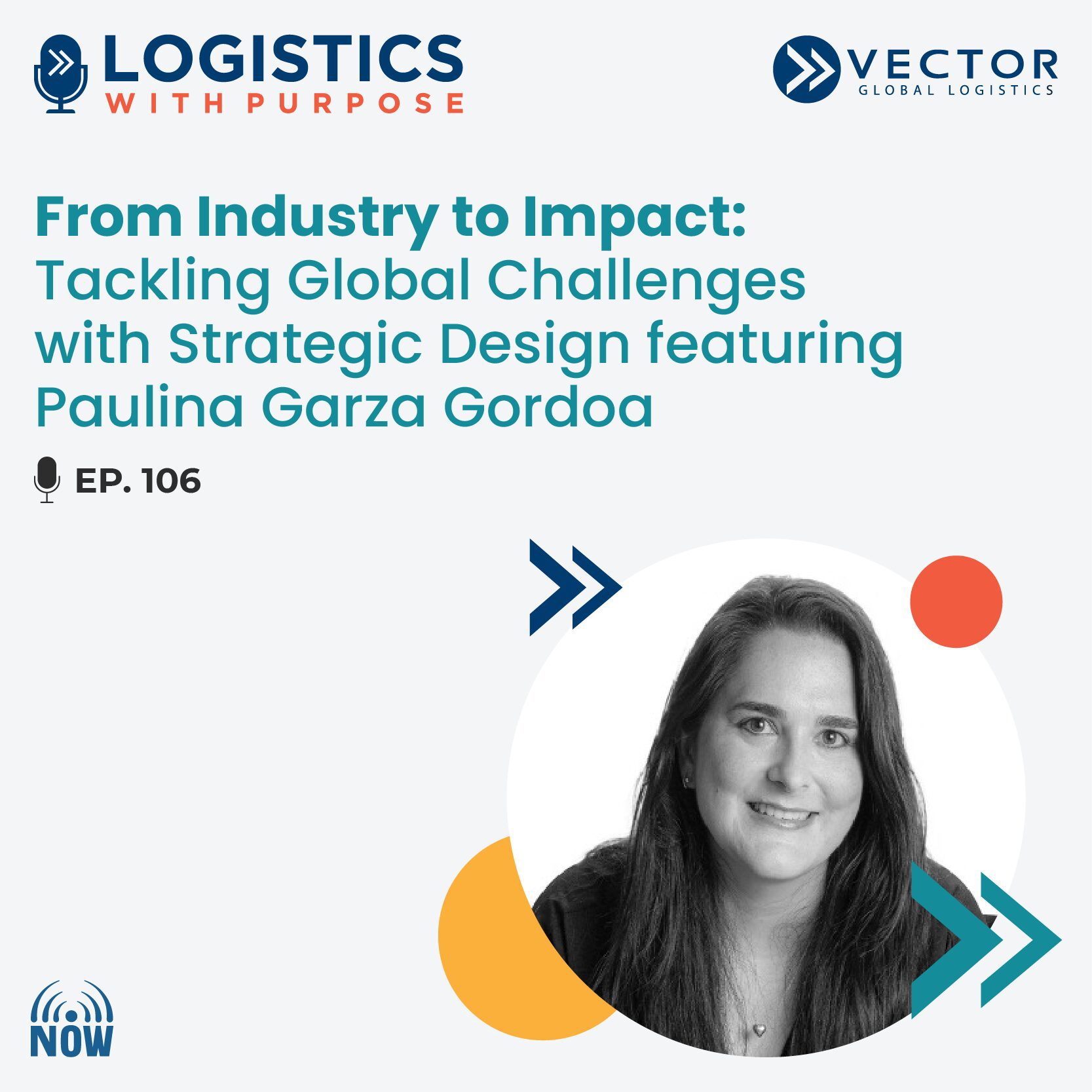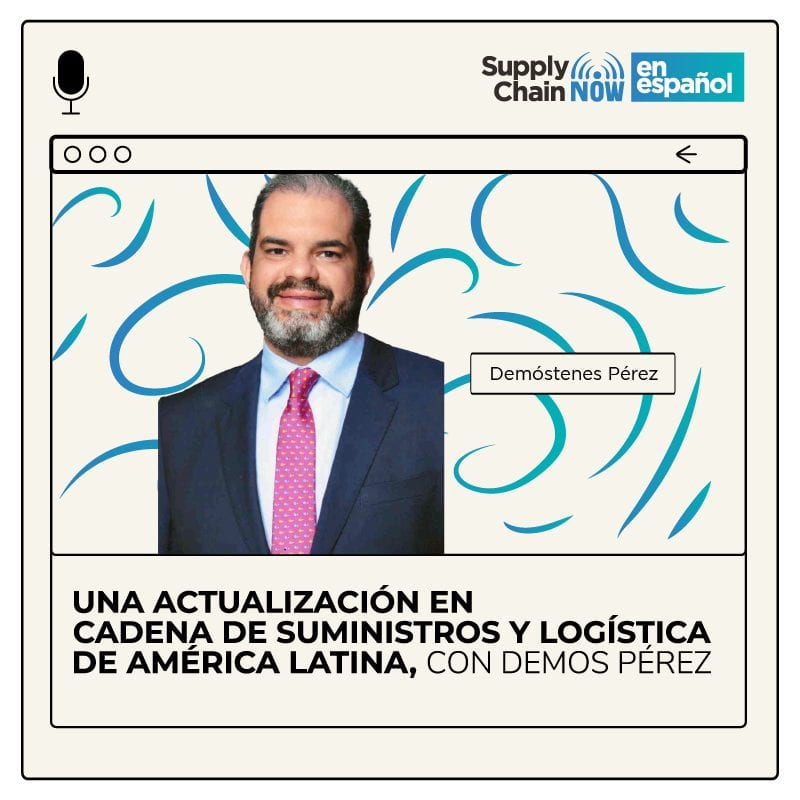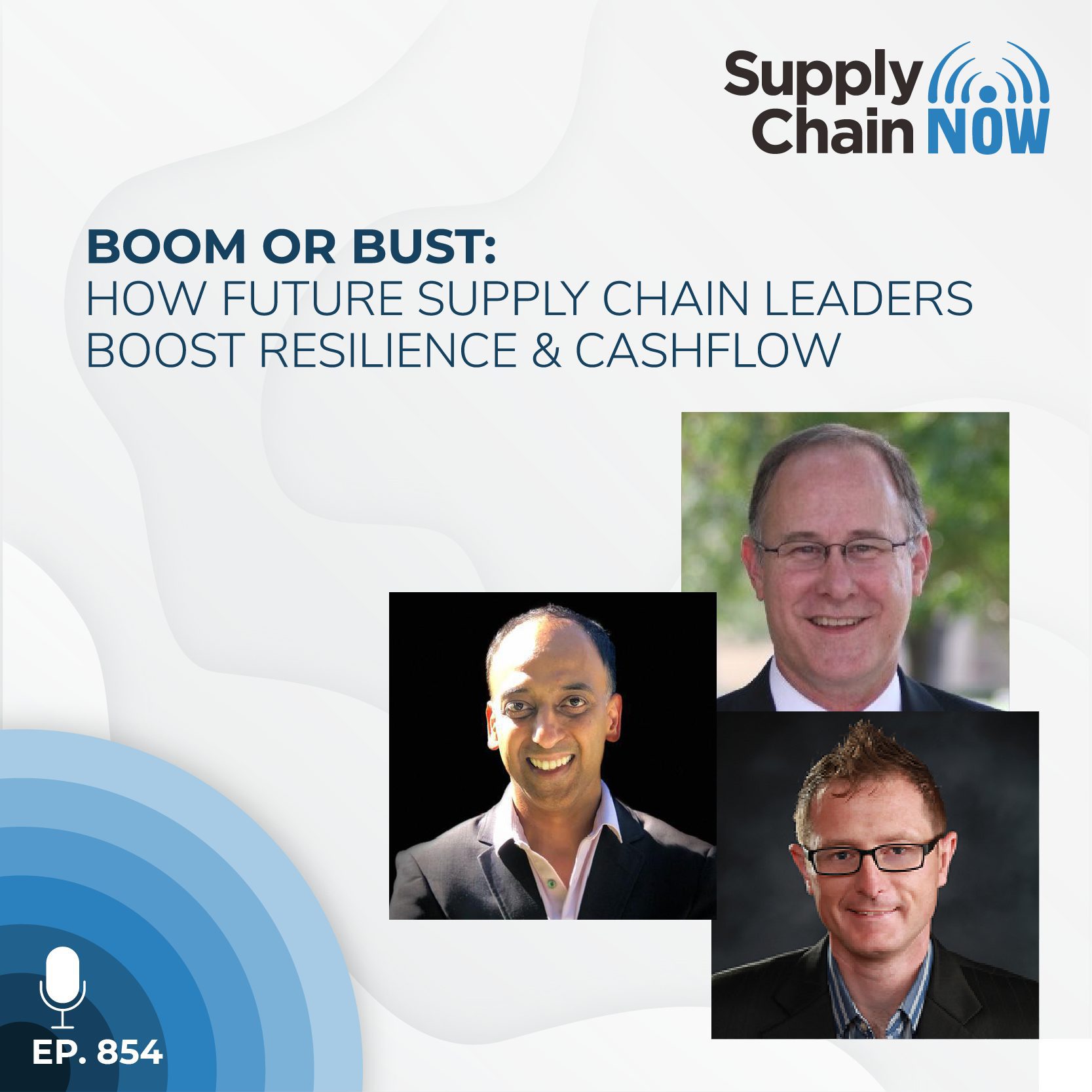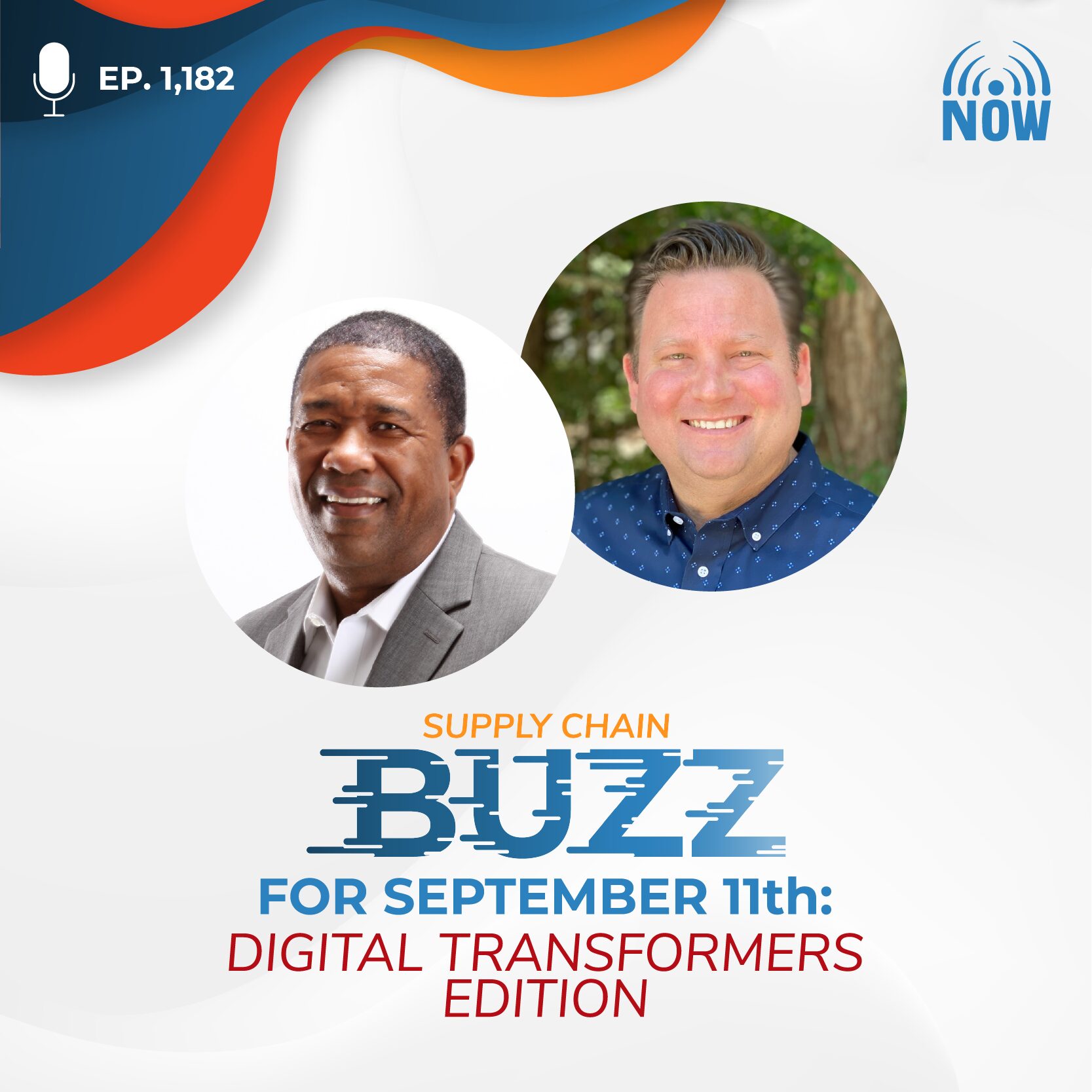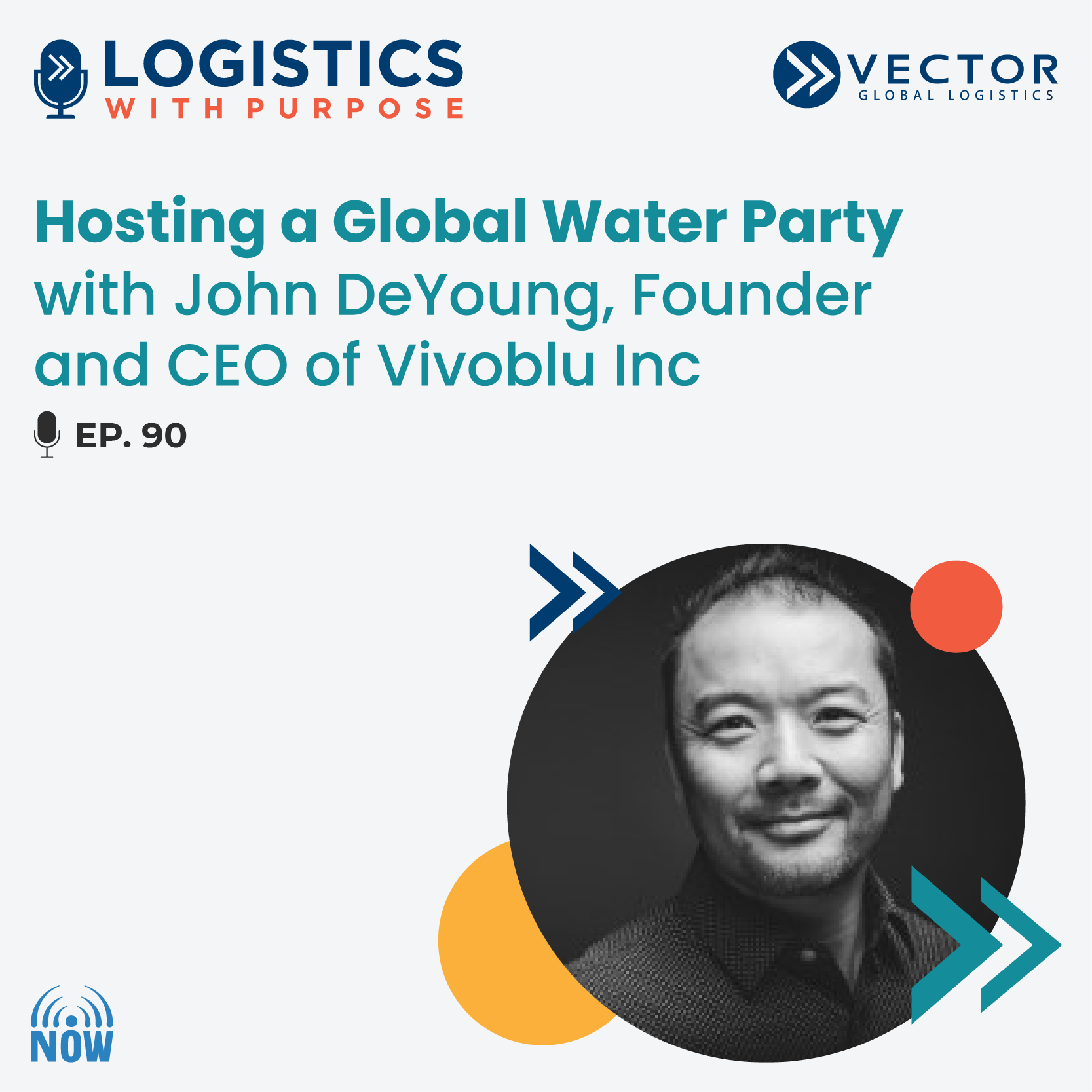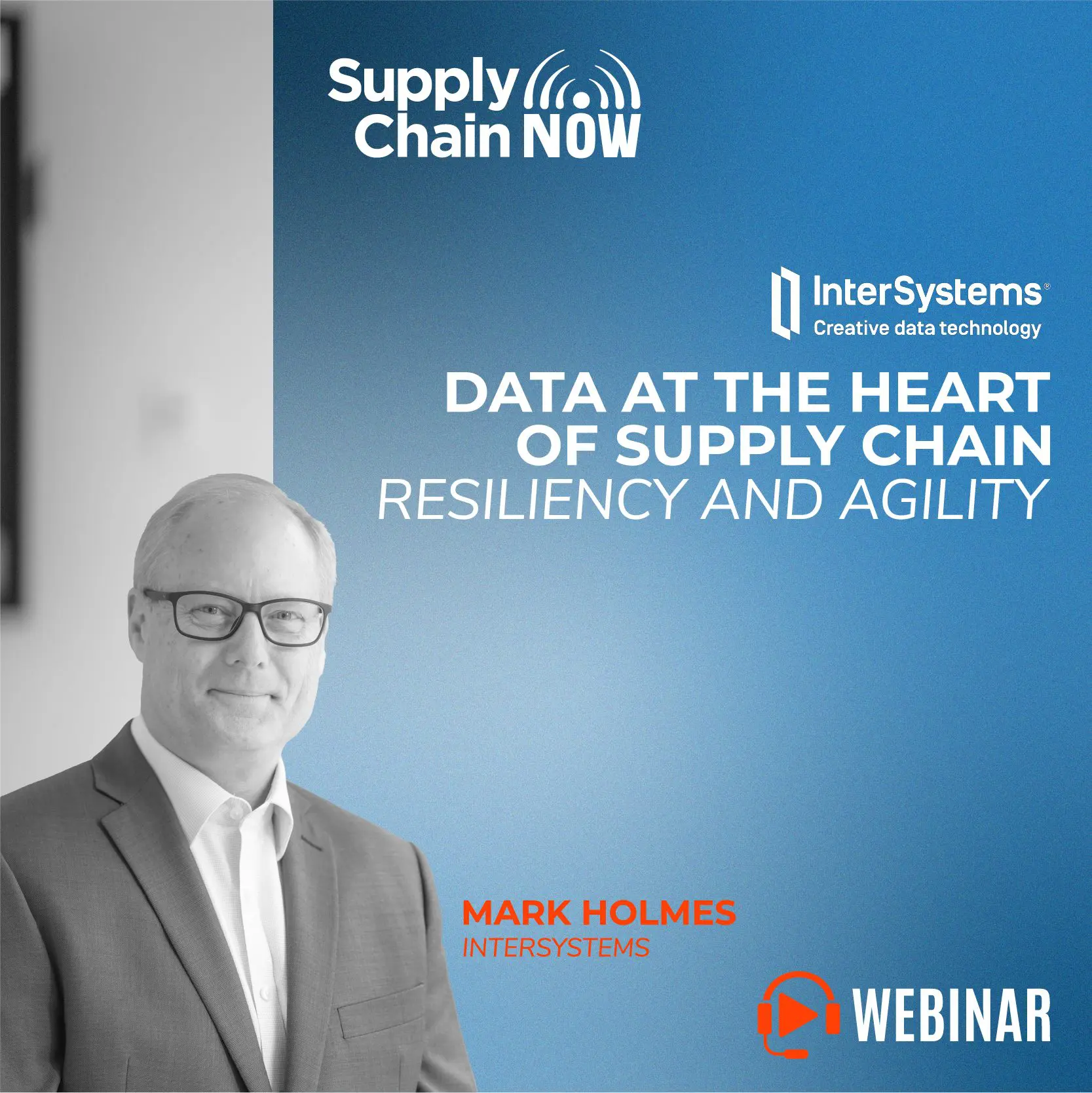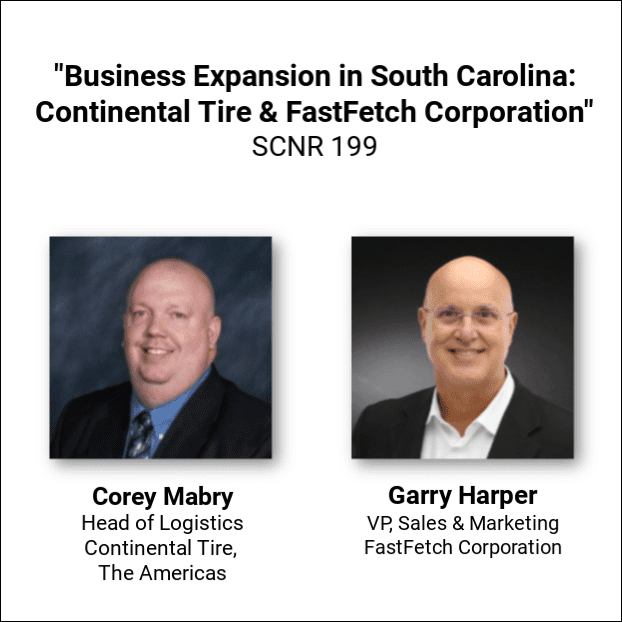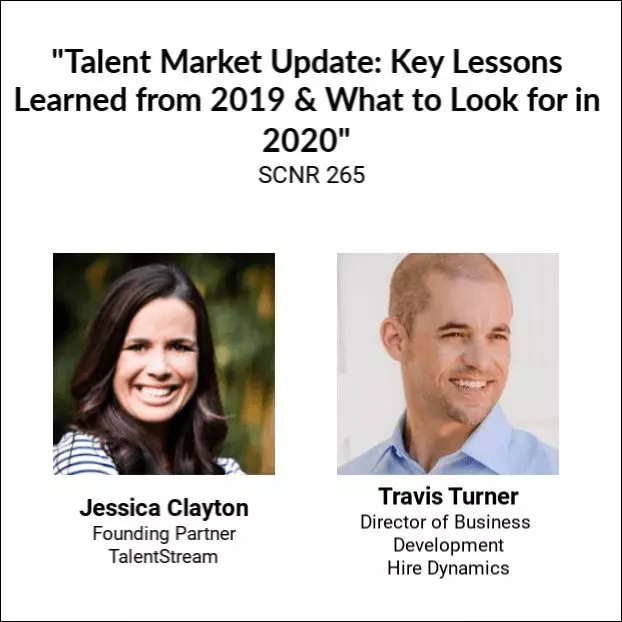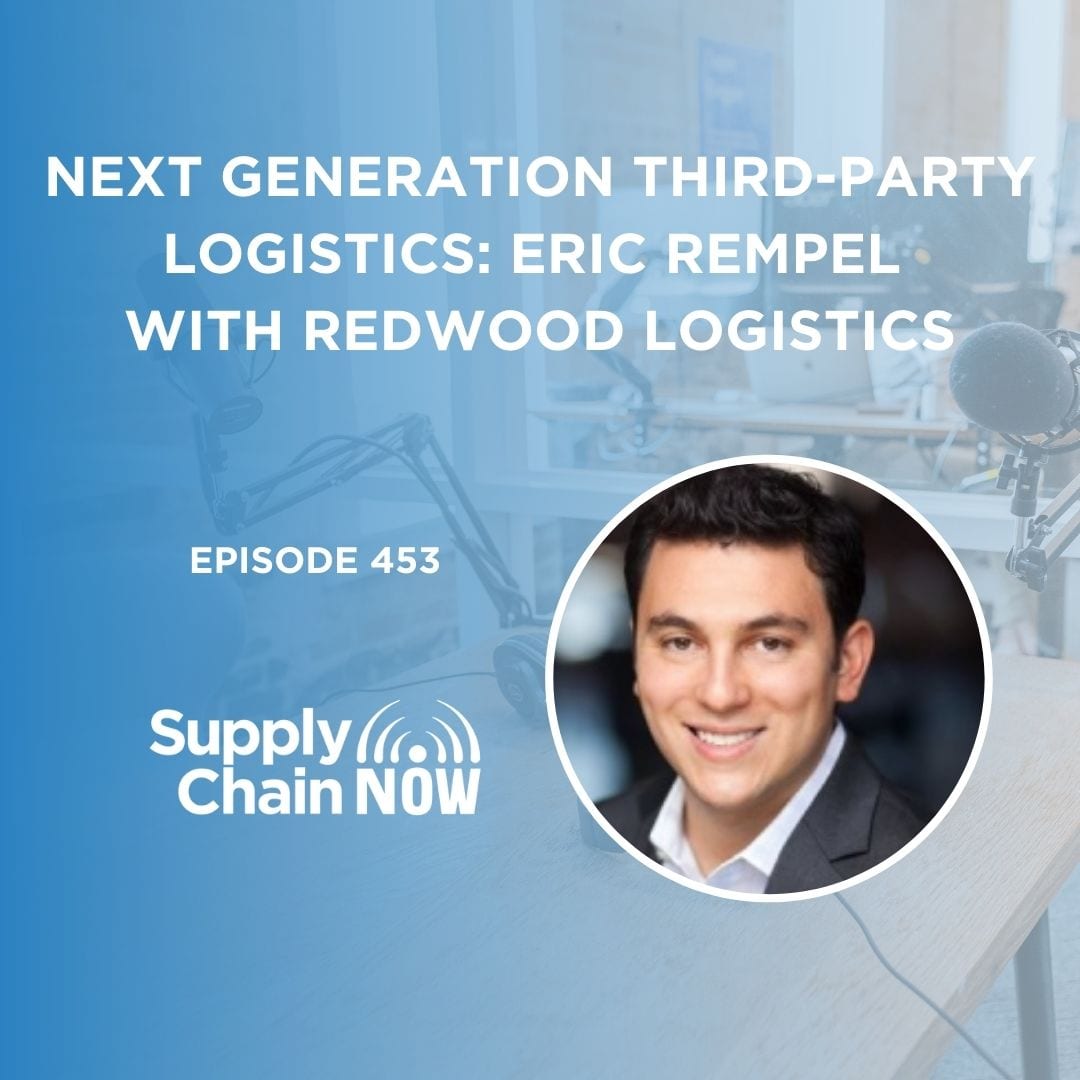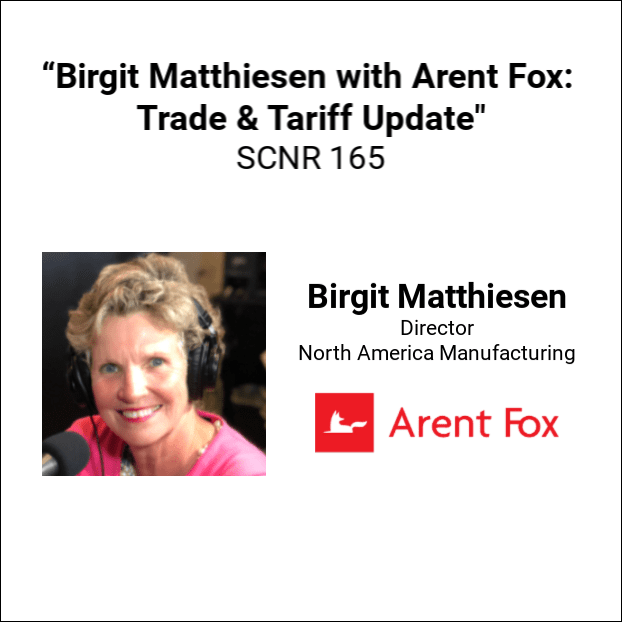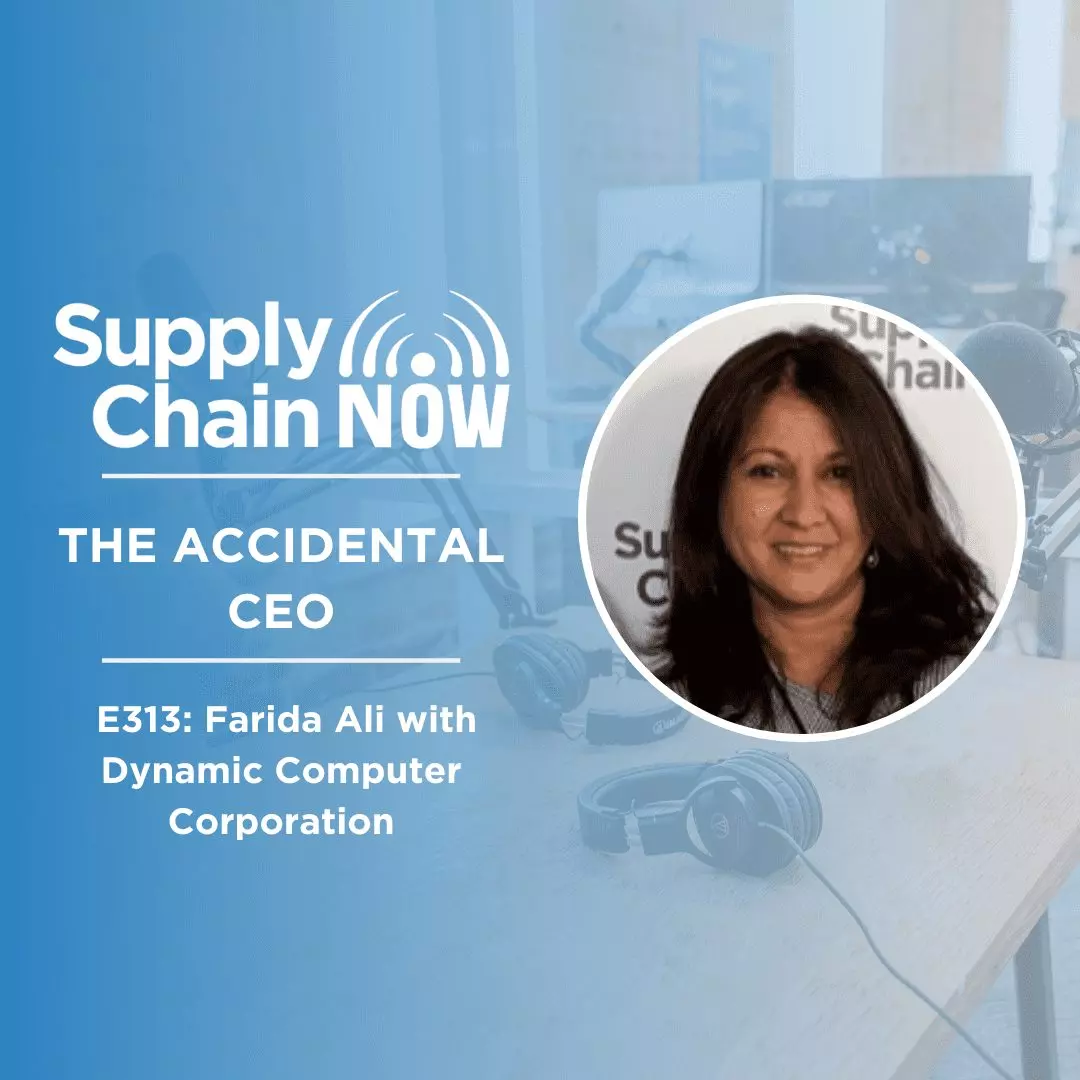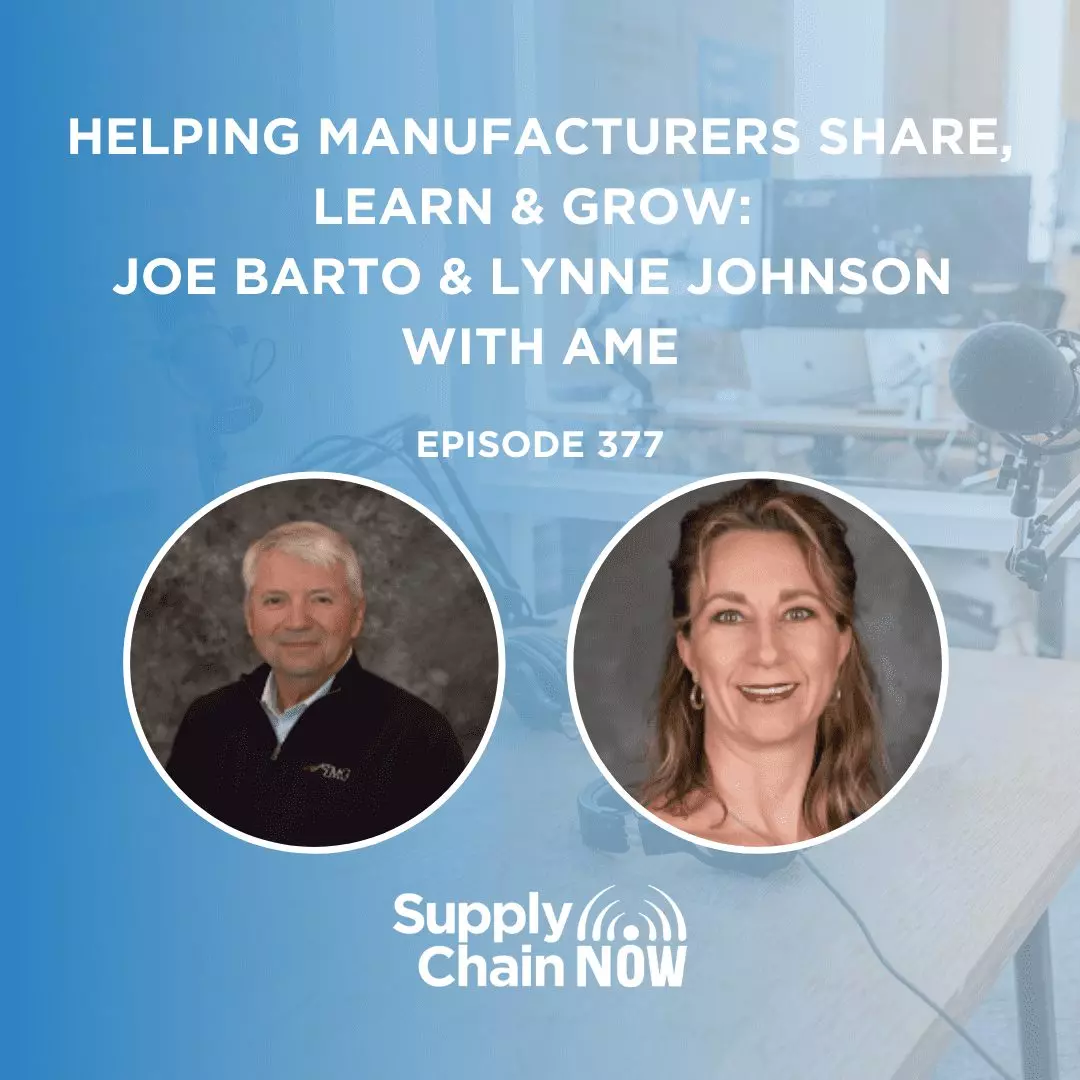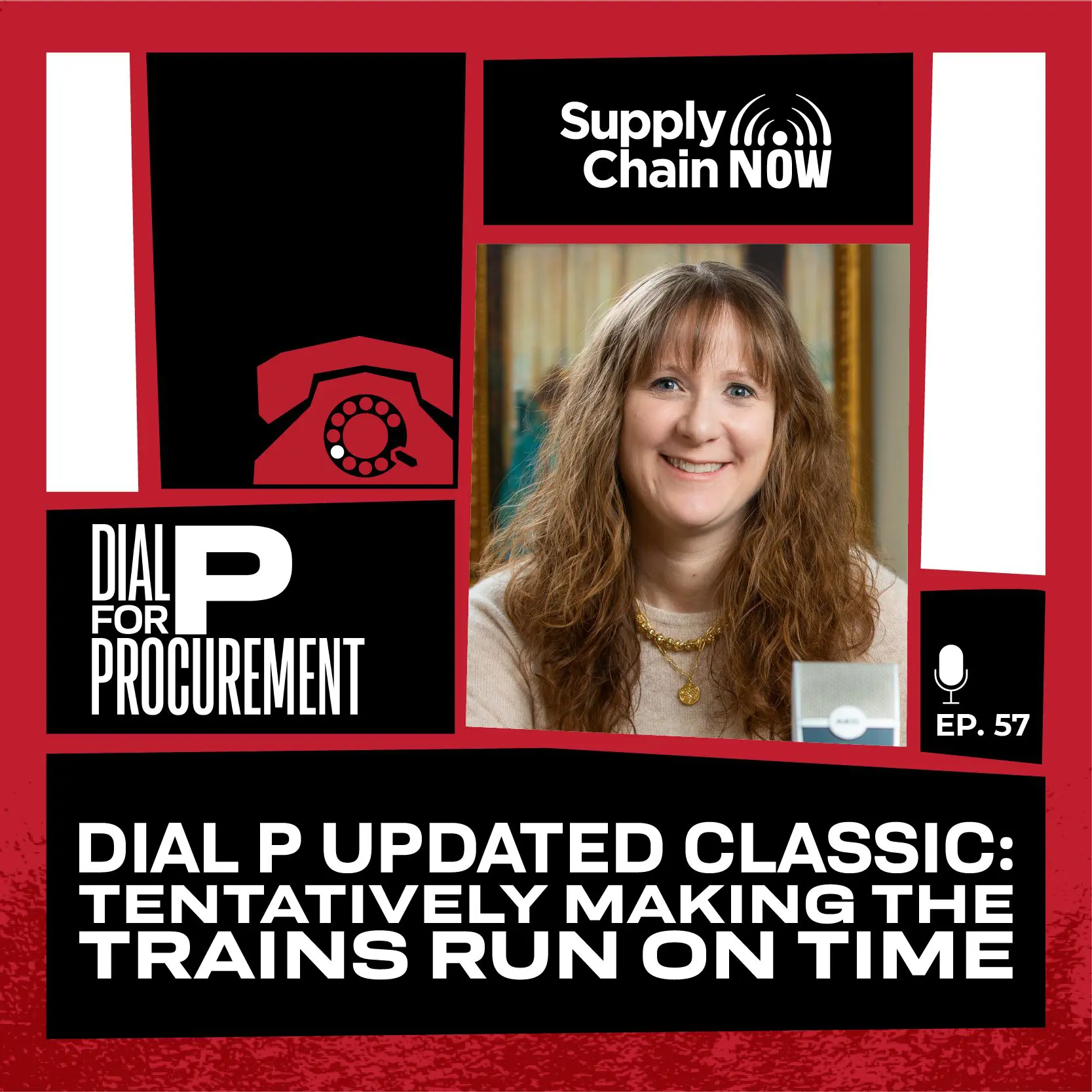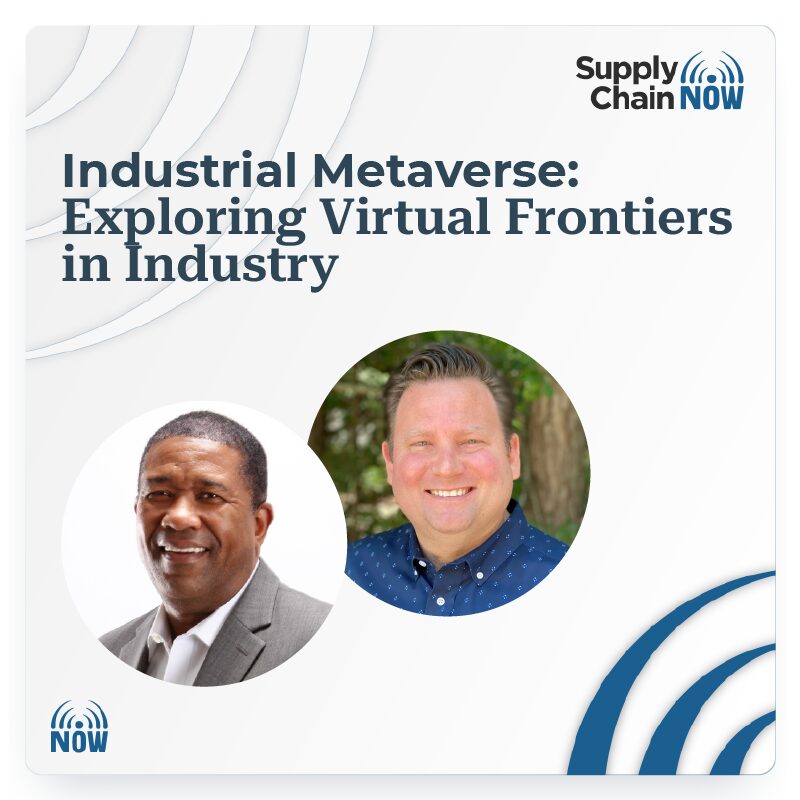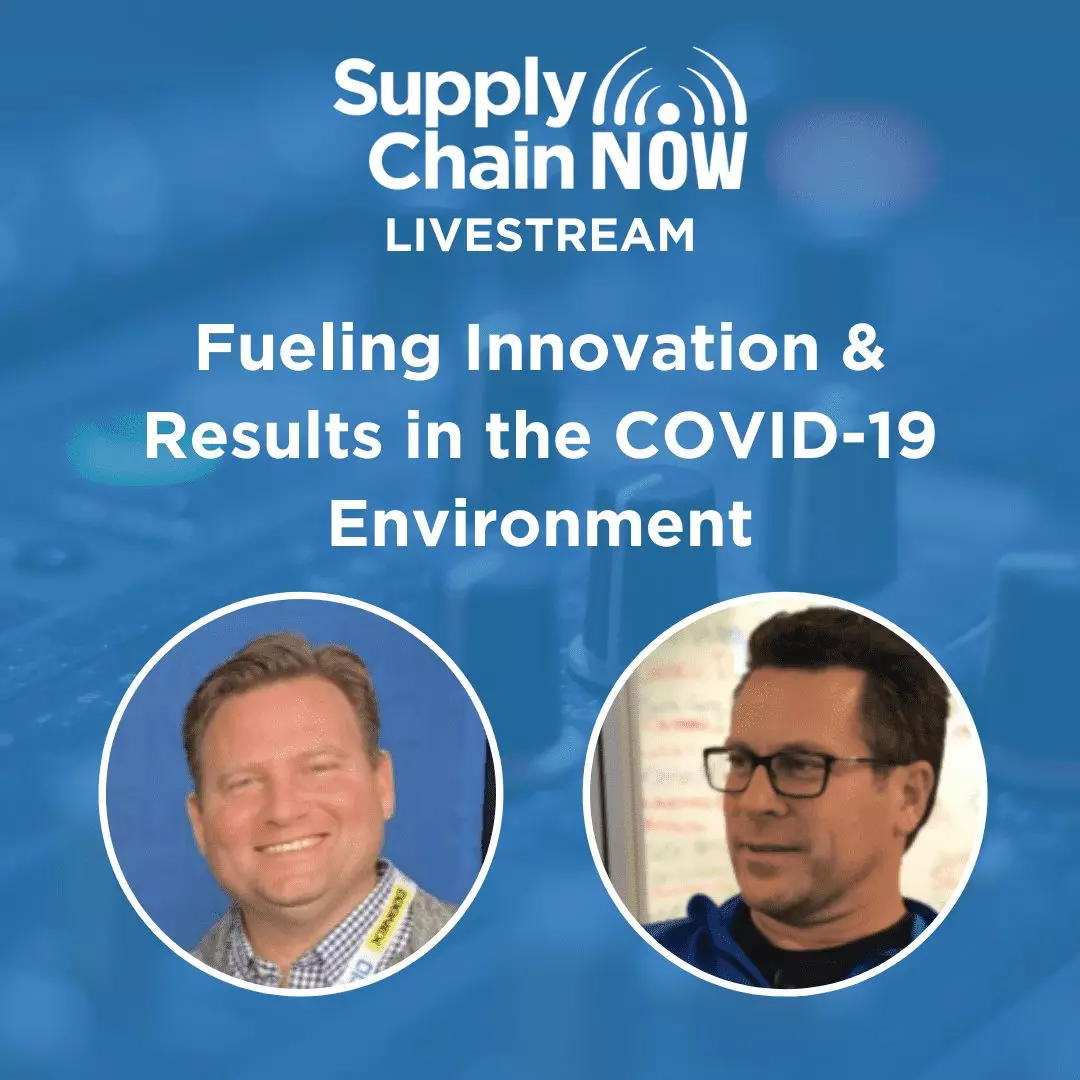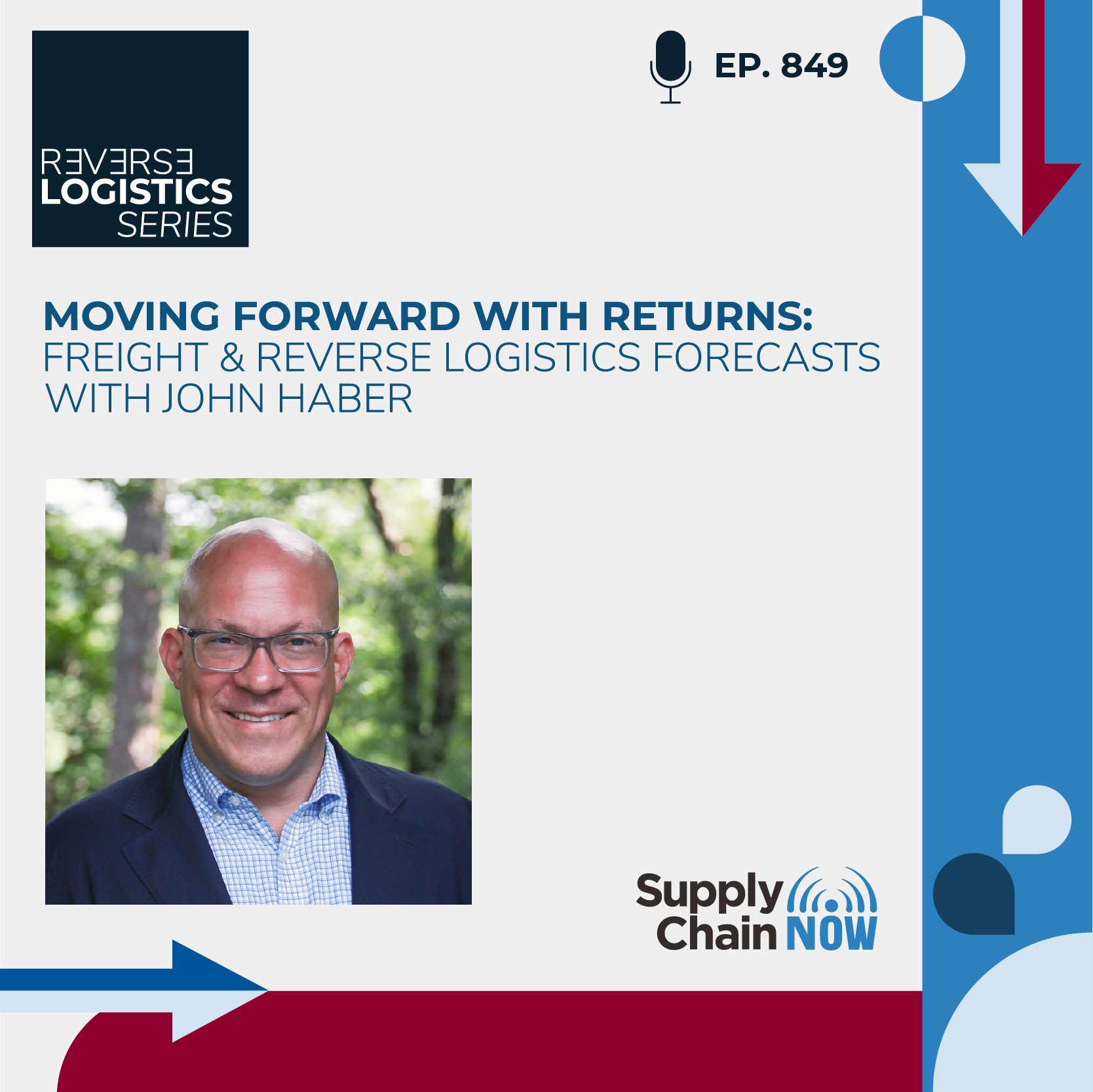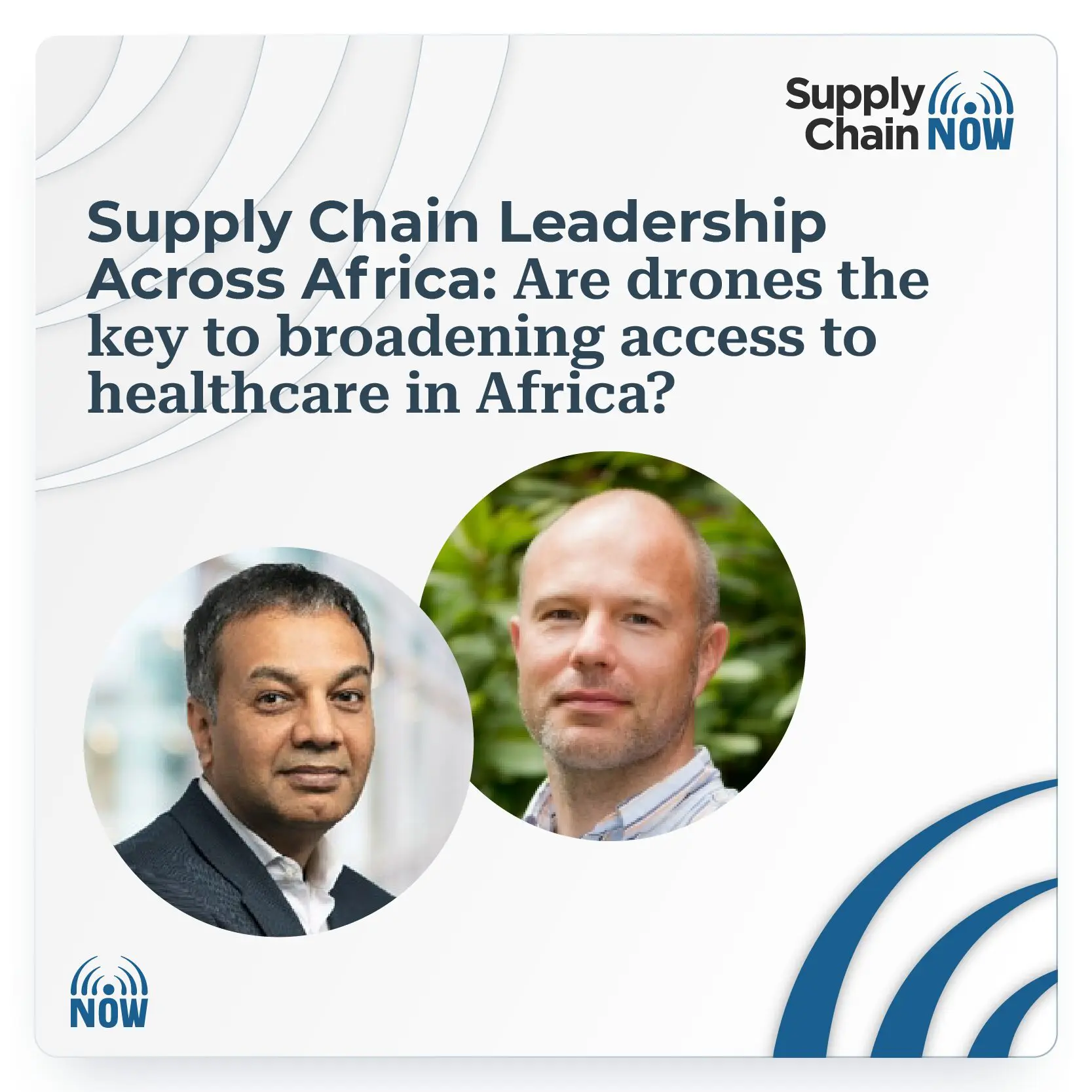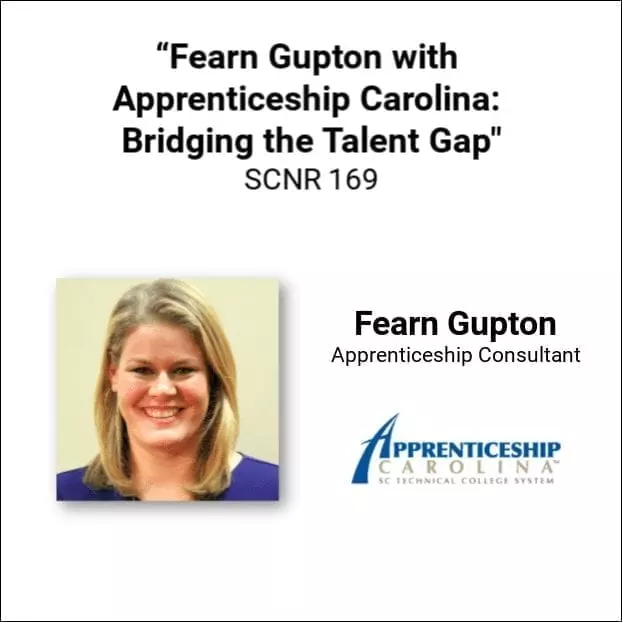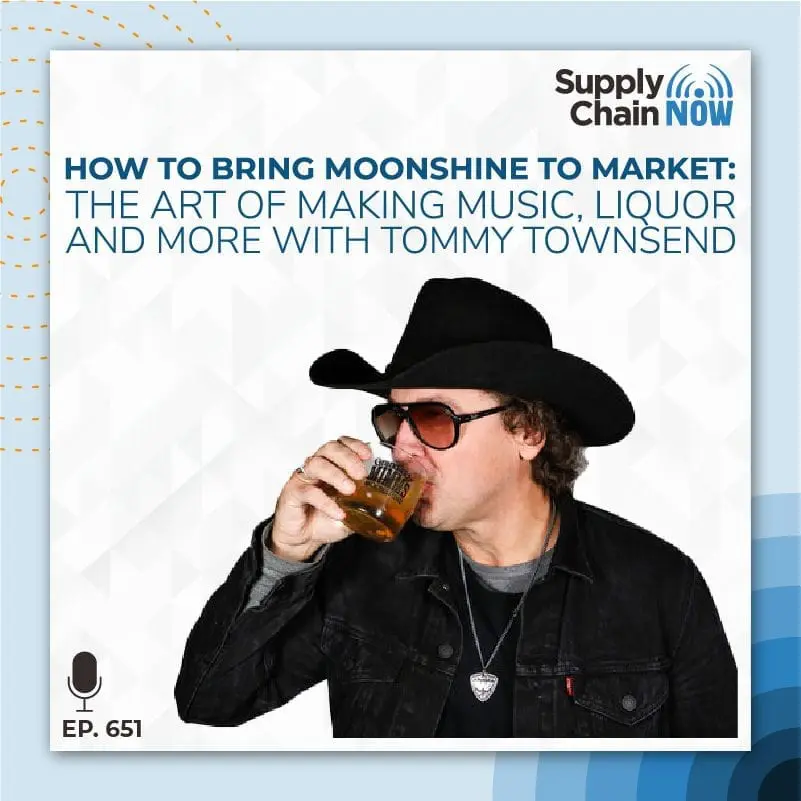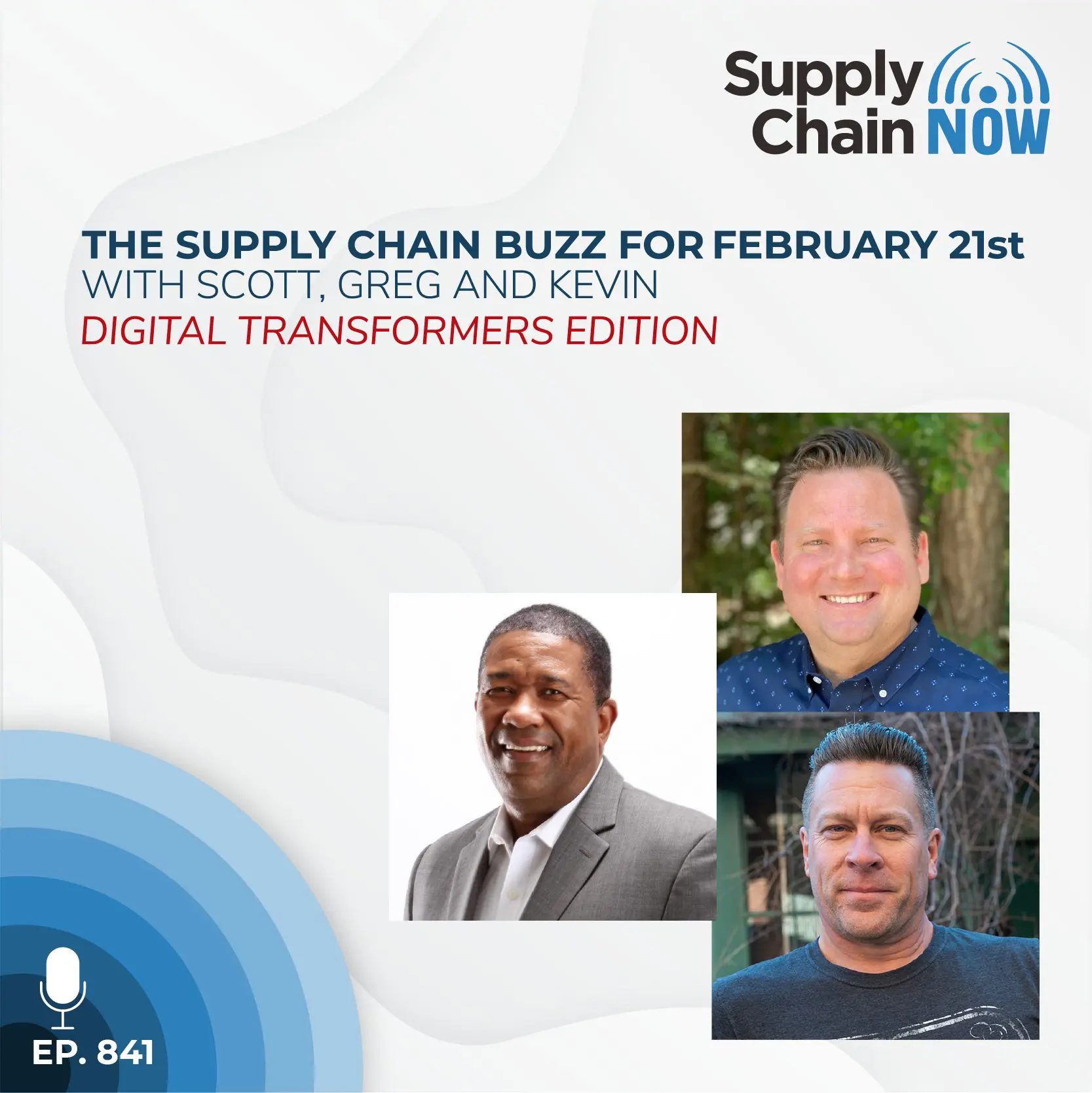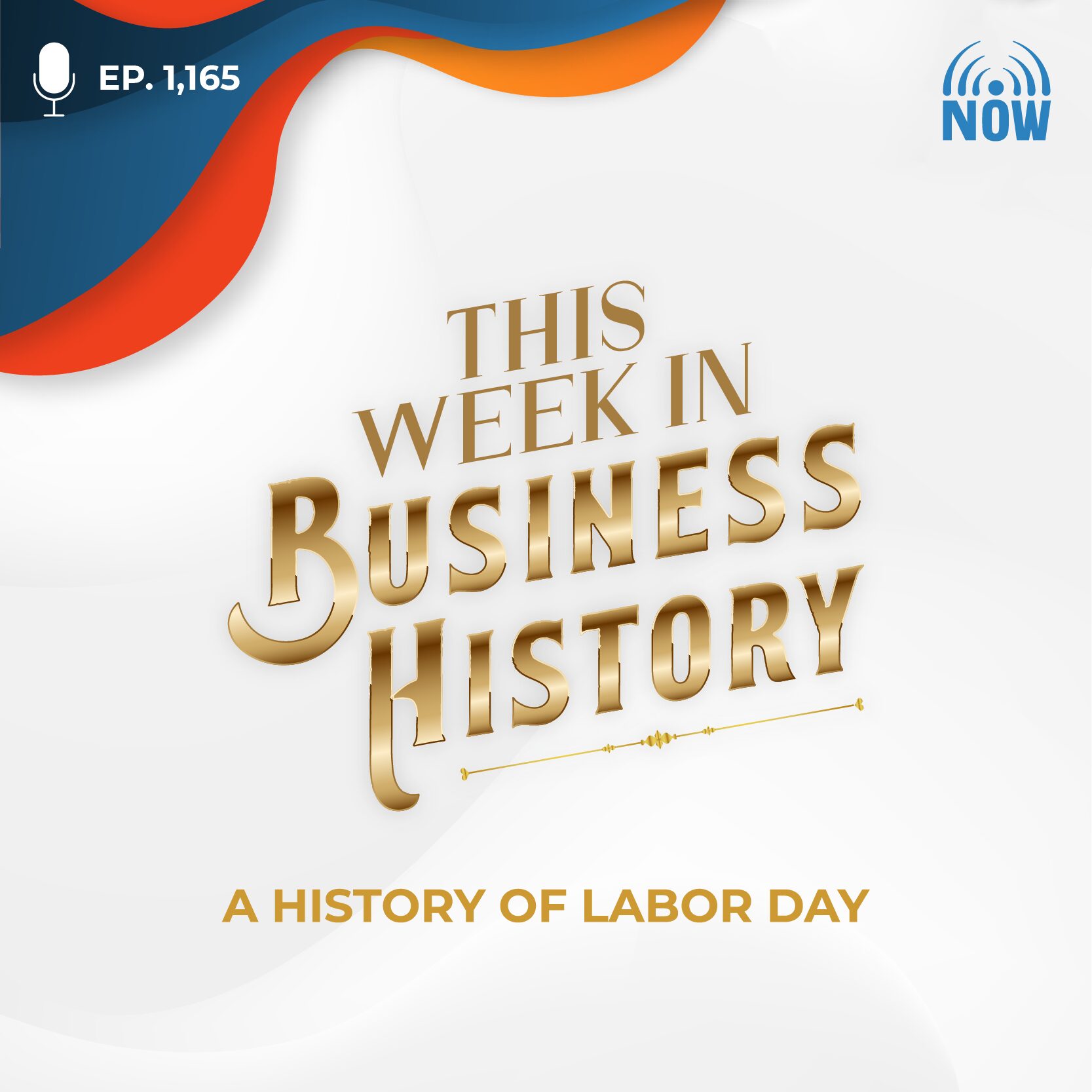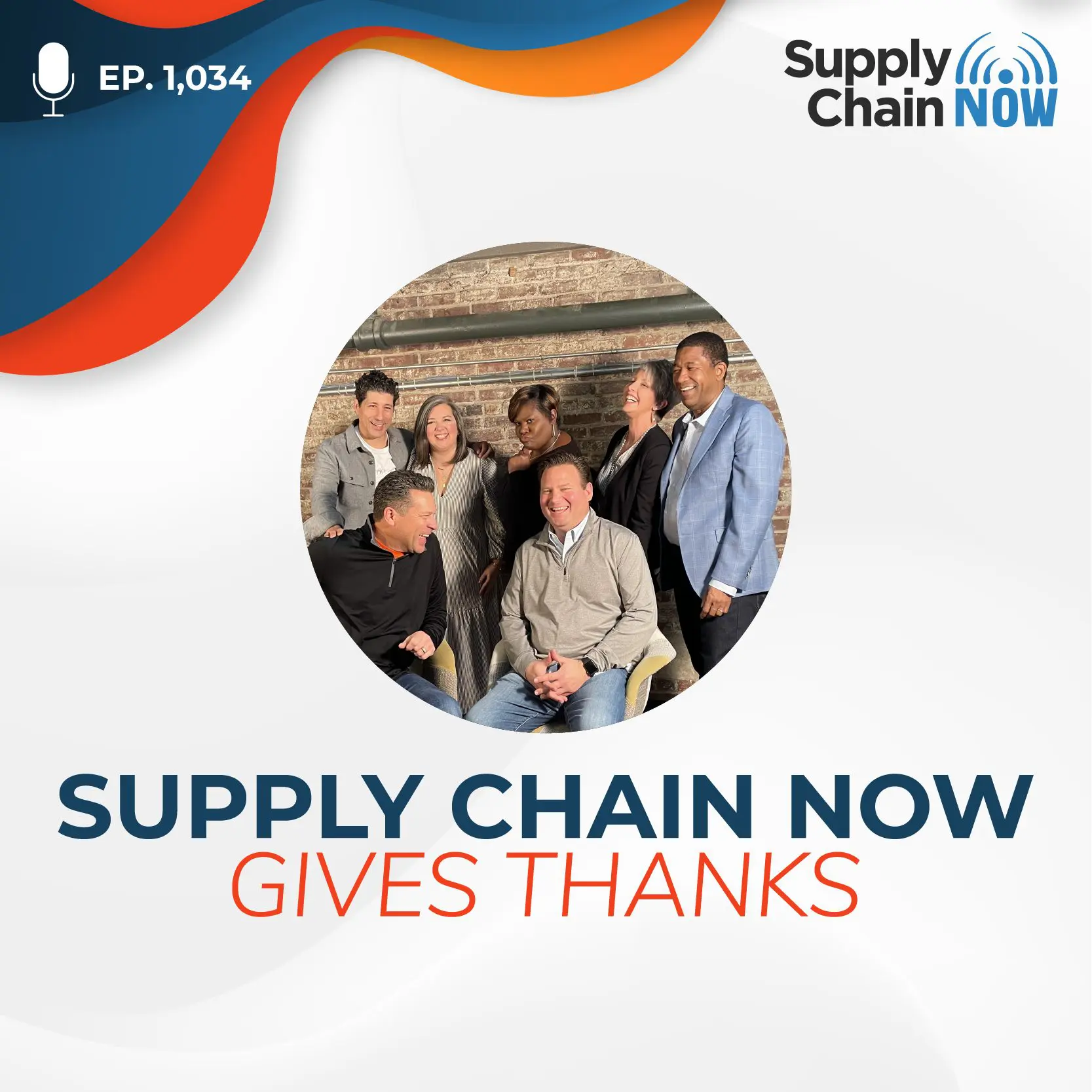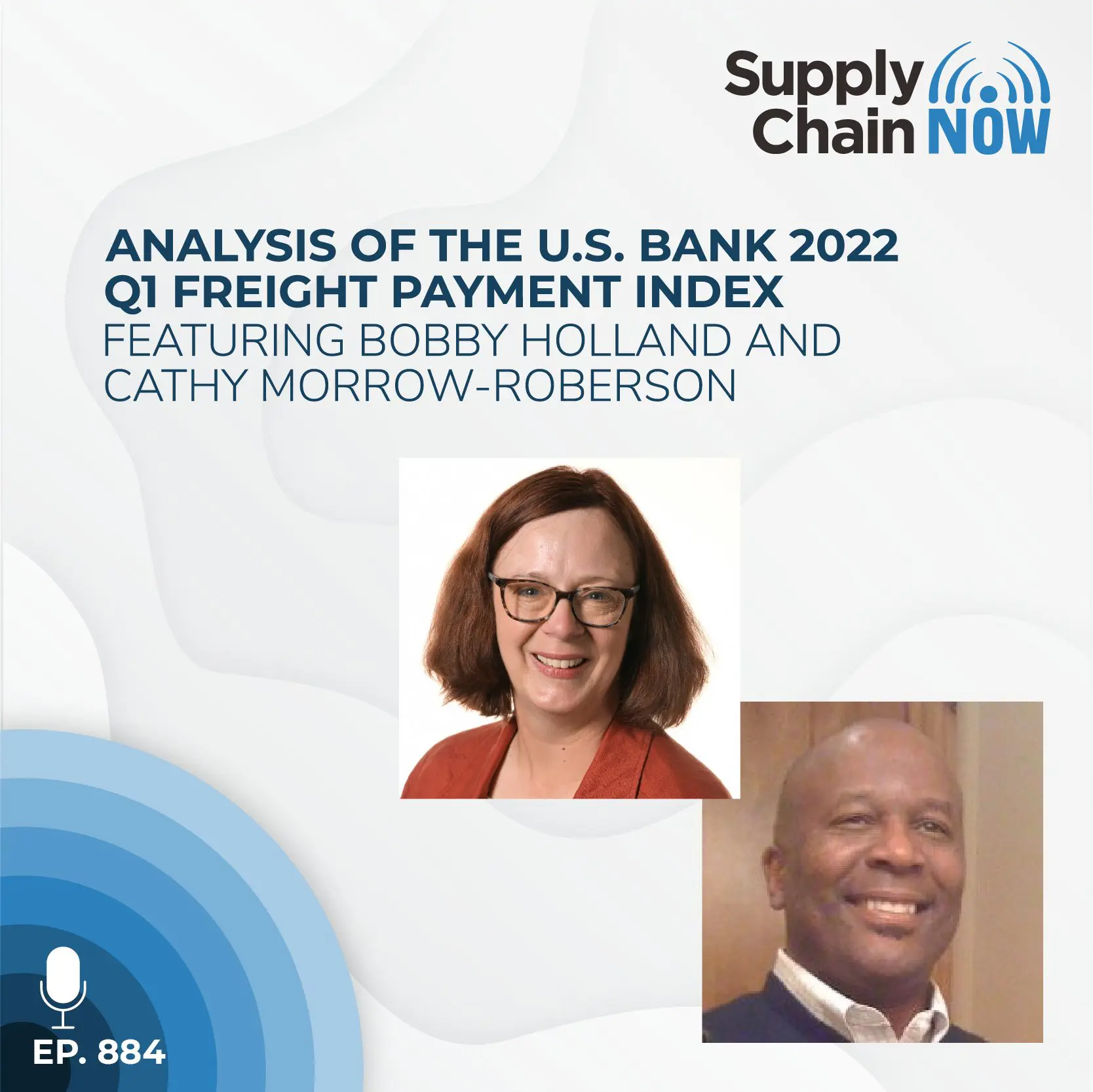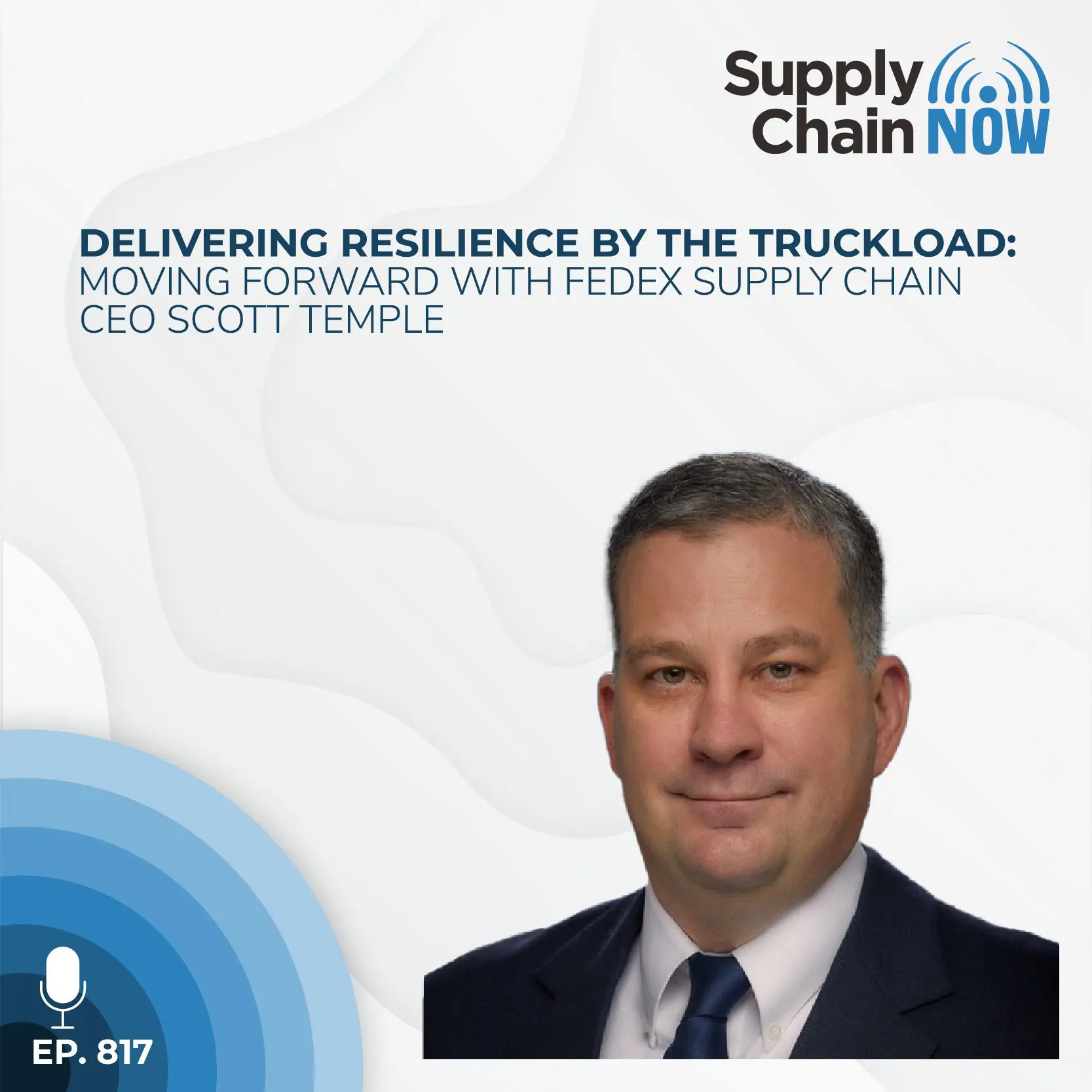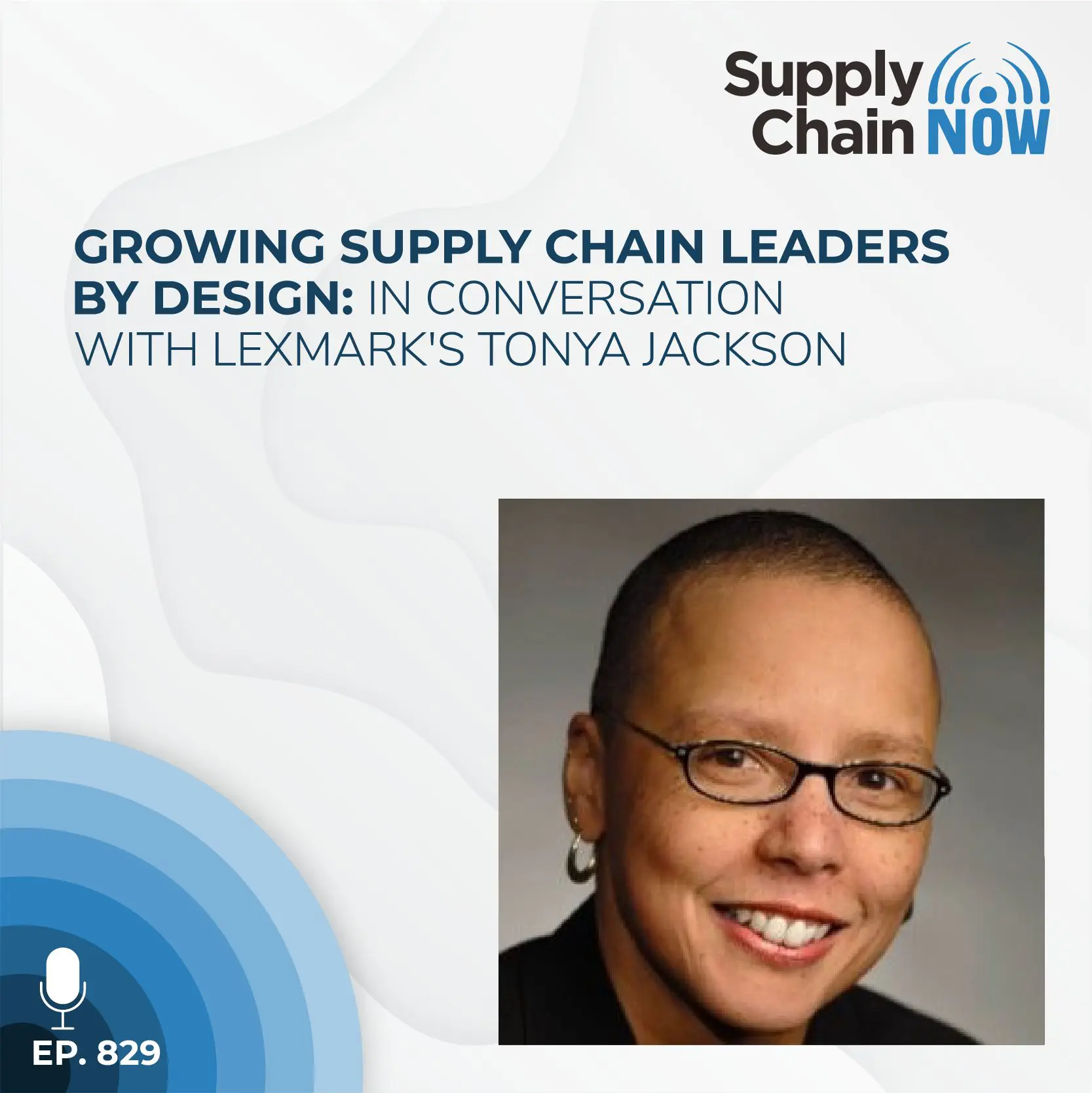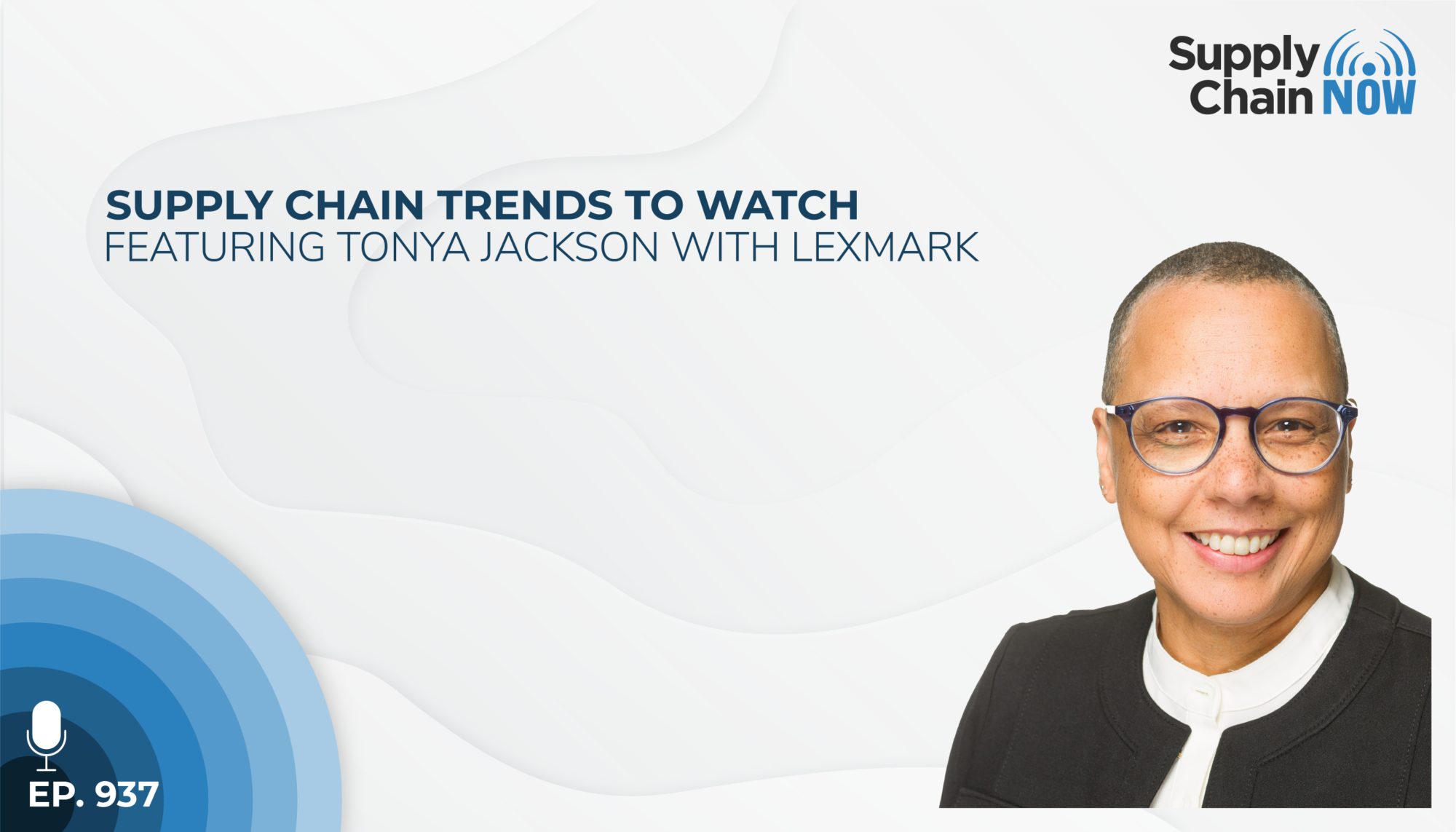
You can't just keep doing the same thing. That's not how you advance.
- Tonya Jackson, Vice President and Chief Product Delivery Officer at Lexmark
Episode Summary
The key to resilience is purposeful risk-taking. During the pandemic, supply chain leaders had plenty of opportunities to take calculated risks… and then watch how they played out.
Tonya Jackson is the Senior Vice President and Chief Product Delivery Officer at Lexmark, and she has been recognized as a Notable Woman in Supply Chain and Logistics by Inbound Logistics. Tonya is leading the way in driving healthy tension between supply chain and R&D, introducing design thinking to the innovation process—and helping grow tomorrow’s supply chain leaders, today.
In this interview, Tonya speaks with hosts Greg White and Scott Luton about:
• Why you can’t necessarily take something already in motion and just simplify it
• The importance of visibility to supply chain transformation
• What she sees as the top talent trends given today’s challenges
Episode Transcript
Intro/Outro (00:03):
Welcome to supply chain. Now the voice of global supply chain supply chain now focuses on the best in the business for our worldwide audience, the people, the technologies, the best practices, and today’s critical issues. The challenges and opportunities stay tuned to hear from those making global business happen right here on supply chain now.
Scott Luton (00:31):
Hey, good morning, Scott Luton, Greg White, here with you on supply chain. Now welcome to today is livestream Gregory. How we doing,
Greg White (00:38):
Doing great here on the 5th of July, which feels distinctly different than the 4th of July. It also feels like it’s been a minute since we’ve been on, you know, on the air. Right?
Scott Luton (00:48):
Well, we had a wonderful time unplugging a bit down in Puna Vira Florida last week, after a quick, quick drive, back to knock out the buzz, which we had a great time, right?
Greg White (01:00):
<laugh> yeah. Tell ’em how the sausage is made there. <laugh>
Scott Luton (01:05):
Well, Hey, you know, the rental wifi was not, uh, was not cooperating, so it, it was good to get back and, and, and see the pups, you know, and knock out a great conversation with you as always on the buzz. But today, Greg, today, we’re fast forwarding, you know, vacation times over Florida’s over today, it’s back to doing the work we’re talking supply chain trends and keep your eye on all with a very special guest, Tanya Jackson from Lexmark. Are you geared up for this, Greg?
Greg White (01:34):
I am. I’m pretty excited. We’re coming back with a flurry, right? Bringing in a fantastic practitioner, right? Somebody who’s making things happen in supply chain.
Scott Luton (01:43):
That’s right. One of our favorites, a repeat guest, what we’re also gonna touch on. Of course, what, what she and the, the supply chain, uh, and her team’s doing over at, uh, Lexmark, but we’re also gonna touch on the awards. You know, Tanya, uh, we are very grateful to have her serve as an executive judge on the 2022 supply chain and procurement awards. So all of that, plus some of the trends that you don’t wanna take your, your finger off the pulse sub. So, and Greg, as always, we invite all the folks in the cheap seats and, and the sky boxes. You name it to bring their voice and perspective today, right?
Greg White (02:16):
Yeah. I wonder if I wonder if everyone around the world knows what knows bleed seats means. You just made me think of that. <laugh> I everybody’s input on that.
Scott Luton (02:26):
That’s right.
Greg White (02:26):
I know when you were a kid, but I got a very keen awareness of what the nosebleed seats were and why they were called that <laugh> they’re up there.
Scott Luton (02:36):
Hey, only tickets we could afford. I don’t know about y’all Greg.
Greg White (02:39):
Yeah. Two bucks man. Two bucks to go to a ballgame. Can you believe that
Scott Luton (02:44):
He was either a row or two down, uh, with no popcorn and a drink or you’re sitting, <laugh> sitting on the top row, the old stadium, but that’s OK. Fond memories, fond memories.
Greg White (02:54):
Yeah, no doubt.
Scott Luton (02:54):
So Greg, we’re gonna say hello to a few folks in one, uh, momentarily, again, folks stick around. We got Tony Jackson from Lexmark today, one of our favorites, but in the meantime, we do want to, uh, make one quick announcement. We wanna invite folks to this ongoing initiative, leveraging logistics for Ukraine. Uh, our friends at vector global logistics are leading this pro bono work. Uh, Greg, as we know, I think four or five, I’m not sure what the latest count is, but four or five containers full of humanitarian aid for vetted needs have already made it across, uh, the Atlantic to pull in. Yeah. And, and Ukraine and, and elsewhere. And, uh, it depends on people across the supply chain world that wanna plug in on these working sessions, uh, figure out how they can help. And then, and then deeds not words, take an action, right?
Greg White (03:43):
Yeah, no doubt. I mean, it’s been a manifest effort by the, the folks at, at vector Enrique and Maureen and their team have really, really stepped up. And we even got a little bit of video of the containers being loaded. I think it’s approaching 10 Scott. Wow. I think it’s up. Well, not that not all of them have landed right. To your point, but that’s how many are headed that way. So that is fantastic. That’s a lot of help from a lot of people around the world to make that happen. That’s right.
Scott Luton (04:12):
Excellent point, Greg, appreciate that update. And by the way, folks, uh, these are working sessions. The next one’s July 12th at 11:00 AM. Eastern time. There’s no need, you know, they’re not gonna twist your arms off to give or to work or to volunteer, whatever, if you wanna come and just sit in and listen to the conversation from folks around the globe that are all are, have kindred spirits to help folks in need. Hey, feel free to do that. We’ve got a link in the comments and we’d invite y’all to join in, uh, the conversation. No doubt. Okay. So talk about logistics with purpose, which is of course the podcast series, uh, that Enrique and veteran the team here host at supply chain. Now that is logistics with purpose, for sure.
Greg White (04:52):
Indeed.
Scott Luton (04:52):
Let’s say hello to a few folks. Josh goody. He’s basically our Seattle correspondent these
Greg White (04:57):
Days. Yeah. And where do you see? You might have to scroll down, but where do you see his weather report? You’re gonna
Scott Luton (05:03):
Good morning from
Greg White (05:06):
Sunny
Scott Luton (05:08):
In Seattle. Great to see you, Josh.
Greg White (05:11):
Scott ahead. I woke up this morning, six 30 this morning looked at the temperature before I went outside, said 83 feels like 92, 6 30 this morning,
Scott Luton (05:27):
AC on a AC on full blast. Uh, Ammad is tuned in via LinkedIn. Hey, Ammad let us know where in the world you are tuned in from. We love to connecting those dots. If we can Raul, same for you. Let us know where you’re tuned in from, uh, via LinkedIn. Great to see you here. Uh, Mohamed. Great to see you here via LinkedIn. Uh, welcome. Welcome. Looking forward to your perspective. Let us know where you were tuned in from Shelly Phillips is back. Greg Shelly. There we go. We brought it a live stream or two ago if you recall.
Greg White (05:56):
Yeah. And uh, she’s probably feeling TE’s much more like we are than Josh. I’m guessing
Scott Luton (06:03):
<laugh> probably so,
Greg White (06:05):
Although you never know, you know, some days it’s 90 and some days it’s 50 and there in Colorado,
Scott Luton (06:10):
So, well you beat me to it. Shelly Shelly says good morning from the foothills of Colorado. So that paints, the nice picture Ahmad asking you shall receive is tune ninja, Egypt via LinkedIn. Hey, the dog, uh, the diesel, your pick of the, all the nicknames clay Phillips from Maggie valley today via LinkedIn. How about that?
Greg White (06:33):
We need a weather report from there. I bet it’s at least cooler there.
Scott Luton (06:37):
That’s right. He
Greg White (06:39):
And also a golf score from this weekend. Clay <laugh>
Scott Luton (06:43):
All right, clay. You’re on the hook, man. Uh, Katherine of course, uh, part of our production team here. Big, thanks to what Katherine and Chantel Amanda do for us. Uh, so great to see you. Hey mark. Preston is back the legendary Mark Preston, Greg many folks call mark the lean guru. Uh, the Southern Sinay. Some of his nicknames, mark. Hope this finds you. Well, congrats. I think Greg, I wanna say mark joined the Kohler organization a few months back. So gosh,
Greg White (07:14):
Seems like I saw something. There was that right. Kohler
Scott Luton (07:18):
Mark. Let us know. I might be tracking you wrong, but greatness. Hope you and the family are doing well.
Greg White (07:22):
Hope everything’s good. Do need to a new faucets,
Scott Luton (07:29):
Right? Uh, no. I tuned in from Dubai via LinkedIn. Great to see you here today.
Greg White (07:33):
Okay. So there’s gonna challenges for heat right there. Be interesting. Interested to hear, right,
Scott Luton (07:40):
But probably Greg it’s sunny. Yes. Sunny, but a bit more of a dry heat. I would, I would imagine least when I was there, it was
Greg White (07:47):
Like a blast furnace,
Scott Luton (07:49):
Right? <laugh> a Hugo is tune in from Guadalajara 77.
Greg White (07:56):
Beautiful. Say hello to our business. Associate Joshua while you’re down there. Yeah,
Scott Luton (08:02):
You got to. Um, alright so I, we could hit everybody here. I’m gonna hit shoot through some of these folks. Wanna hear your comments throughout the session here today? We’re about to bring in our, our special guest. Hey Ron. She online from the great city of akin, South Carolina trade compliance guru. Great to see you, Ron. Anela please let me know. Make sure we get it right. Uh, I tried, I might be over for two there, but from Hampshire, UK, gene pledger. Hello? From what feels like equatorial <laugh> so it’s hot. It is hot there in Alabama.
Greg White (08:34):
Yeah. Clearly.
Scott Luton (08:36):
Yeah. Good to see you, Jean. Hello, Joey from sunny, Minnesota. Um, yes, mark confirm. He just joined Kohler. Great to see you. Outstanding. Congrats. Gotta celebrate it. Okay. One final comment that we’re gonna bring on our guests here. Clay says one figure is a hundred plus <laugh> one figure is 75. I’ll let you guys guess which is temp and which is score <laugh>
Greg White (08:56):
We’re gonna give you the benefit of the doubt clay. That’s right. Good game. Yeah. Round go.
Scott Luton (09:01):
Well, Hey clay. I hope you have a lot of fun with the family there in Maggie valley. Okay. So Greg, I am stoked about our guests here today. I’ve had a chance to, uh, not only let’s talk to you. I have yeah. Have the variety of conversations with, uh, Tanya Jackson. But we also did a one on one interview probably about two months ago or so. And I left that interview as recorded interview and I’m like, you know what? Our audience is gonna love Tony. We gotta figure out if we can bring our own live here at some point. And today we have Tanya Jackson live. So I wanna welcome in folks. You’re gonna get a as big of a kick as I, I did about this, uh, Tanya Jackson, senior vice president and chief delivery officer with Lexmark. Hey, Hey Tonya, how you doing?
Tonya Jackson (09:45):
I am doing well. How are you? How are you? Both
Scott Luton (09:49):
Doing
Greg White (09:49):
Wonderful. Thank you. Good to have you back.
Tonya Jackson (09:52):
Thank you. I appreciate all the, uh, dialogue about the temperature. It’s pretty hot here too. Yeah.
Greg White (09:57):
<laugh> yeah. Is it’s hot. You’re supposed to be able to escape that in Kentucky, but yeah,
Tonya Jackson (10:04):
Nine zero. Yeah.
Scott Luton (10:06):
And you know, the day after a holiday, uh, lots of last minute problem solving, you know, Murphy’s law is still alive and well in the wide world of technology. Right?
Tonya Jackson (10:16):
Right. Yes. It went right down to the wire here. Yep. <laugh> but we have great, had great support. One of my best friends over here, Emily helped me out here. So that’s right. We’re good. Very
Scott Luton (10:25):
Good. Big shout out to Emily and the whole team there, but great to see you again. And, and as I was sharing, as we were introducing you, man, we are tickled to have you here live with, you saw some of the folks from really around the globe. They’re gonna really enjoy your perspective. But before we get into Tanya Jackson, the senior practitioner, I wanna get into a little bit of food, Greg. <laugh> it is national.
Greg White (10:49):
I mean, we’re coming off a holiday weekend, so
Scott Luton (10:51):
That’s right, right. I’m still trying to get rid of all the extra food we had, uh, from, from the holidays, but it’s national apple turnover day. So Tanya and Greg, Greg, I’m get your take here, but I’m gonna start with Tanya. So Tanya, did you grow up eating apple turnovers in wide awake Wilson, North Carolina. <laugh> uh, and if you, if it wasn’t your go-to, if apple turnovers were weren’t your go-to dessert, what was one of your family’s favorite? Go-to desserts. Oh,
Tonya Jackson (11:22):
I’m so I’m glad you remember wide awake. Wilson. I’m actually gonna send you a newspaper article name, heads up there. Wide awake Wilson. Okay. Uh, so yeah, I did grow up eating apple turnovers, but I, you know, I’m more, much more partial to peaches, honestly. So it would be like peach cobbler, peach pot kinds of things. Oh, man.
Greg White (11:41):
Been separated at birth
Tonya Jackson (11:43):
<laugh> well, we were on our last interview thinking that we were related at some point that’s right. We had so many things in common, but yeah, I mean, but for sure apple turnover is good, but I am more partial is peach season right now last
Scott Luton (11:57):
Month. Yes. Uh, one quick comment. Did y’all know, at least as of, as of a couple years ago that even though Georgia is known as, as the peach state, South Carolina actually produces more peaches than Georgia. Well, did you know funny how
Greg White (12:09):
Often you get stopped in a South Carolina parking lot when you have Georgia tags for people to tell you that
Tonya Jackson (12:14):
<laugh> yeah, I was gonna say he, you definitely know Scott from South Carolina with that good attributed.
Greg White (12:18):
<laugh>
Tonya Jackson (12:20):
Not just, everybody knows that the South Carolina people know that, but it’s true. I actually, that is true.
Scott Luton (12:26):
One quick follow up then. So Pete, you mentioned Pete cobbler. That is one of our favorites around here. Mm-hmm <affirmative> so before we get Greg’s take Tanya, do you have, do you always have a scoop of ice cream with your peach cobbler or no ice cream?
Tonya Jackson (12:39):
Usually no ice cream, but I’m fine with ice cream, but I’ll I, the cobble itself is I’m good just with, but I’ll, I’ll be happy to take the ice cream as well. I’m
Scott Luton (12:47):
Good. Greg,
Greg White (12:49):
Can I ask just one more question, please, Scott, um, your cobbler, is it crumbly top or is it more like pie top as you, as you know it
Tonya Jackson (12:58):
Crumbly top.
Greg White (12:59):
Okay. Yeah. That’s my favorite too. Is
Tonya Jackson (13:01):
That pass? Okay. Good answer. Well,
Greg White (13:02):
I was just curious, you know, I thought there was only one way to make it and I’m I’m from the Midwest. You come to the south and there’s like all kinds of tops that you can handle. Right. <laugh> so <laugh> I was, I was brought up with a crumbly top too, Tanya, so
Tonya Jackson (13:17):
Yeah, I like the crumbly top.
Greg White (13:18):
Yeah, yeah. Crumbly top.
Scott Luton (13:21):
I’ve probably had it a number of different ways. I like the corner section. You get a little more
Tonya Jackson (13:25):
Crunch, more
Scott Luton (13:26):
Crunch mm-hmm <affirmative> but I’m a, I’ve gotta have ice cream. Cause for me it’s the contrast, you know, it adds that Creamery. Anytime you add that creamy element with the crunch and it tastes delicious. Oh goodness gracious. I could probably eat a whole cobbler, but uh, we gotta, we gotta save that for another day. Hey, really quick. Uh, before we dive into, uh, things forth, rightly let’s I wanna share a couple quick comments here. Josh says shout out to Dubai, who we had. We had, nor from Dubai. He says shout out to Dubai for producing plastics used for medical devices. Save my job more than on one occasion last couple years.
Greg White (14:01):
That’s interesting. Yeah.
Scott Luton (14:03):
Oh, the stories. Oh, the stories that you’re gonna have to share with us, uh, Josh, Annie, Ella, thank you for the guidance. We’d like to get everybody’s names. Right? So Annie, Ella, uh, appreciate that feedback. Let’s see here. Josh also says Dutch oven cooked apple cobbler.
Greg White (14:18):
Oh yeah.
Scott Luton (14:20):
That sounds delicious.
Greg White (14:21):
That’s old school man. Yeah. Is
Scott Luton (14:23):
It <laugh> so by the way, really quick old school, soul food is a channel I’ve been following this summer on YouTube. Chef Jeff is his name. He’s from the Houston area and he offers up all the F all the types of dishes we probably grew up with, at least especially me and Tanya. Uh, so y’all gotta check that out. Um, and also one quick shout out before I turn over to Greg, here we move forward. Tanya. Good morning, Dr. Rhonda za Zimmerman.
Greg White (14:48):
Yeah. And it is morning for everyone who wonders it is morning where she is. So she is in’s funny. And I don’t even wanna know the temperature in theory.
Scott Luton (14:57):
<laugh> quick shout out. Uh, so Dr. Ronda, even though we’re still making everything official, we’re gonna be MCing, a upcoming virtual session called veterans and logistics. Right. Uh, we’re gonna be tackling a lot of different, uh, veteran related issues from transition to kind of trends in supply chain to kind of, uh, inform the veteran community. We’re also gonna be touching on mental wellness and, and health, which is, you know, important for everybody. And Rhonda has volunteered. We’re still nailing everything down, but Rhonda’s volunteered, you know, that’s, that’s part of her expertise to share some of her knowledge on, on that late July event. So thank you, Rhonda. I’ll be back in touch soon. Okay. So Greg, Tony Jackson here with,
Greg White (15:38):
It’s like doing a business call in the middle of the show, do you see how he did that?
Tonya Jackson (15:42):
<laugh> I did. I did just, just, uh, very smooth. Oh,
Greg White (15:46):
It’s a very two way conversation here, Tanya, if you ever need anything from us, just jump in those in the
Tonya Jackson (15:51):
Screen. I’ll just stop. Just stop the thing. And we’ll just take a little call. That’s works. Just go with it
Greg White (16:04):
Always on. Yeah.
Scott Luton (16:06):
So Greg, where are we starting with? The one only Tanya Jackson here.
Greg White (16:11):
I can’t believe I’m even gonna ask this question. So I want, I want to, uh, precursor this with, I know the answer it’s just in case any of you out there don’t know the answer. We want everybody to have a good, have a good frame of reference. So Tony, if you could tell us a little bit about Lexmark, um, and what you do, right? What your role there is.
Tonya Jackson (16:32):
Okay, sure thing. We’ll start there. I’ll take Lexmark first. So we are a, um, global leader in imaging and document services. Uh, we are in, we are, you know, our customers are all over the world where we have devices deployed in about 170 countries. We have about, uh, 6.5 million units, um, in the hands of our customers and wow, about a million under managed services under a single global system. So our many of you know, about managed print services over the years. And so we deploy, you know, we, our device, our imaging devices, IOT, and cloud enabled, and we actually use some of that IOT technology and some of the digital transformation we are piloting in supply chain and operations. So a portion of our business also is looking at taking that same technology that we use for printers, uh, that where we work with our customers and, and seeing how we can manage other devices in there to help them with their business.
Tonya Jackson (17:31):
So not just manage print, manage print, but manage services also to expand our business. And then we also have some really, uh, cool technology and imaging and we are, we have a, a group now that’s looking at how to take that technology and use it in other places, such as our scanning technology, our fusing technology, cuz we heat cool, so fast and those kinds of things, so a lot going on at Lexmark. But the main thing is, you know, serving our customers and making sure that, uh, they can, uh, have print for their mission critical dev mission, critical services and not worry about it, make sure that the printer works that is serviced and that, you know, we make sure that hospitals and, and uh, manufacturing sites and, and anywhere in healthcare are that people are up and running so they can serve their customers. That’s
Greg White (18:17):
Think it’ll be a fantastic day. I’m curious, Tanya, it’ll be a fantastic day. Maybe you can do this. I wouldn’t be surprised at all when, when you can address probably the two most common requests around your devices, which is clearing paper jams <laugh> right. And, and refilling toner. Can you do any of that remotely yet?
Tonya Jackson (18:39):
Yeah. Well, you know, clearing PA you know, if interesting you say that, so as part of the managing devices remotely is that we do, you know, monitor it so that we could look at error codes and look at how the printer is the health of the printer. Right. And we can try to intervene before you get to any kind of series breakage and those kind of things and toner toner, or did you say toner or I’m not sure which, which you use. Yeah. Toner. Some, some people say inking, but OK. Yeah. I might have seen, you might have, but so <laugh> with toner. It’s a matter of sensing when it’s low. Right. So you don’t let be out. We don’t want you to be out. So it’s a matter of, uh, you know, having the alerts on the out panel to make sure that people know you’re low in this color, you can go ahead and order and we can, we can get you replenished. That is also a managed print service as well. But if you don’t have management, you have those, you, you know, you have those alerts on the, on the,
Greg White (19:31):
Yeah. That’s so I’m seriously so practical. And I love the preemptive capability there. That’s important, right? Yeah.
Tonya Jackson (19:38):
Right. Yeah. People just want devices to work and you know, they
Greg White (19:42):
Just they’re confusing enough for some people.
Tonya Jackson (19:44):
They’re not, we’re working on that. Keeping simple
Greg White (19:49):
<laugh> well, I’m, I never cease to be amazed at people who can make these things operate. Like, you know, you know, they can, they do it just like it’s second nature for me. I just look at that keyboard and I go completely blank and <laugh> start looking for talented people that can actually do
Scott Luton (20:04):
It.
Tonya Jackson (20:06):
I guess you just walk around waiting for somebody to come up thinking
Greg White (20:09):
That’s pretty much it that’s pretty much it just look pathetic.
Scott Luton (20:15):
I appreciate you kind of given us the nutshell version of Lexmark where you’ve been and what you do now. And some of the innovative things you’re working on.
Greg White (20:23):
Yeah. Right.
Scott Luton (20:24):
As chief delivery officer titles can be interesting things. Are, are you essentially beautiful development here? Recent years is the rise of the CS. CSCO the chief supply chain officer. Right. Is that essentially your role there at Lexmark?
Tonya Jackson (20:37):
Yeah. That’s a great question, Scott. So we, we have a very unique organization and I think it is, um, it’s very, it’s kind of the way we, everybody needs to operate in the future where it’s actually one organization or not. But so my former title was chief supply chain officer, ah, and we reorganized maybe a year and a half or two years ago. Uh, when we, again, we wanted to focus on the core imaging part of the business and as well as to grow in our adjacencies. And so we combined the research and development team, the supply chain team and our service delivery team into one organization. And so my, and so we formed, we, we don’t, we don’t benchmark well against other companies cuz not many people have the setup, but right. So between all of us, we took the name of the product delivery organization and the cool thing about it, which is why I said this forward thinking is we talk a lot about supply chain, agility, resilience, and all those kinds of things.
Tonya Jackson (21:30):
But if you can work with product development really closely, you solve a lot of the agility problems that you may have it’s in the top of their mind, top of the operations people’s minds. So it’s, it’s that constant collaboration in the back and forth. So what we do in our organization is we, what we have, what we call the end to end, right? So we have the, the design, the sourcing, planning, manufacturing, distribution, logistics, service, service techs, uh, re reverse logistics. We get it back. We remanufacture, we harvest for recycling. So there’s a problem with any kind of, any part of the, uh, product that we deliver to our customers. It’s it’s all right here. And we, we, we work together on those trade offs and, and really try to get it right on the front end. Now products that are already down the pipe, you know, at that point, you’re, you’re doing what you can to, um, you know, do your engineering changes and those types of things.
Tonya Jackson (22:23):
But we really have an opportunity to understand each other’s pain points yeah. Being in the same organization, because it’s a little difficult. If you’re in different organizations, everybody’s doing the right things. I, I like to say everybody’s making the right choices, but it’s really hard. And it’s not because people don’t want to, but it’s hard to see the impact either way. It’s hard to see, you know, as you’re going, but if you’re all in the same organization and we mix the organization up, this is, this is key. We didn’t just put three groups together and say, now we got this group. We, we blended teams. So we have R and D teams mixed with manufacturing teams and, and, and sourcing teams, you know, everything, everybody is blended together. So it was, uh, quite an experiment for us. I think it’s, it served us incredibly well during the crisis. Uh, and I’ll say, I don’t say that like it’s over, but during the, the heat of it, when you’re having to, you know, do you, can’t find a component and you work with engineering team to see what else can be designed and, and the engineering team has been fantastic. So, so yeah, we went from chief supply chain officer to, to product delivery officer, but it’s a, it’s a, it’s a very talented, diverse organization with all kinds of skill sets and, and some fantastic people.
Scott Luton (23:34):
I love it. Uh, and folks, let us know what you think, uh, this highly integrated unique organization. And by the way, thank you, Andy. Uh, Hey, we learn new things about our listeners all the time. He is not a fan of the phrase, very unique. You’re either unique or
Tonya Jackson (23:48):
Not. OK.
Scott Luton (23:50):
Andy was responding. As I said, very unique earlier, as, as we described the smart organization, Andy, I appreciate his preferences, Greg, get,
Tonya Jackson (24:00):
I thought, I thought I said, so
Scott Luton (24:03):
Me Greg, I think that was me. Hey, Greg way in there. I mean, you know, you’ve, you’ve also been a senior leader, startup led organizations, the model that Tony just described, there seems pretty powerful in my ears.
Greg White (24:14):
That’s been a long time coming and I’m sure it felt like that for you too, Tonya. But I think two things that really jump out at me is one chief delivery makes so much sense when there’s so much digital componentry, so many digital offerings that are either services, no physical, real component to them as such. Right. Mm-hmm <affirmative> like we think of when we say supply chain and the other is the preemptive strike. Here we go. Again, you guys are trying to get ahead of the game. And I really appreciate that of involving product design and development, R and D and that sort of thing into not just supply chain, but integrating them together because there’s so much that you can share with between supply chain and product design. Sometimes, you know, in the retail trade, we were really good at it. Sometimes we were not very good at it. Sometimes it’s absolutely critical as we think about circularity and sustainability and all of that sort of thing. You know, there’s a lot of opportunity to create efficiencies in, in supply chain and in product design. And it’s just great to see the, the I’m gonna use the word, I’m sorry, gang, the synergy between those departments coming together to create, you know, something that is so much better for every part of the, of the company.
Scott Luton (25:30):
So yes.
Greg White (25:30):
Yeah. That’s powerful stuff. Yes. Great to hear it. I mean, it’s rare that you even hear about it right. Much less. See it, or have a leadership design that is specifically focused on that.
Scott Luton (25:42):
Well, you know, I’m gonna break out a phrase. We, we used around here a lot, uh, a couple years ago based on a guest appearance. Uh, and not that there were silos that Lexmark, but silos exist. I mean, there, there, you know, uh, and traditional structures, they certainly are silo busting. It sounds like you and the rest executive team said, you know what? We’re not gonna do things, uh, per usual and, and have silos and ivory towers. We’re gonna get the team integrated, holistic talking, you know, folks, if they’ve got ideas and it’s outside their functional area, they need to be part of the conversations going on elsewhere. I mean, really, uh, I can really see how that has helped not only during the deepest throws of the pandemic, but moving forward and in, oh yeah. This era we we’re, we’re all living in.
Tonya Jackson (26:26):
Yeah, no, I, I, part of it was definitely silo busting. I think another thing that happens again, not intentionally, but you just don’t understand, like, if you’re in example, supply chain and R and D design something and you’re, you’re sitting there thinking why it’s hard, it’s, it’s complex. Why I’m gonna have to go source this, right? Yep. But when you’re VE integr together, you certainly wanna focus on design for manufacturing, but you, you also have the opportunity to understand, well, we need this technology. It has to be, you can’t just keep doing the same thing. That’s not how you advance. The challenge is I need this new technology. What’s the best way that I can design it so that we can source it. And so that we can make sure we have continuity of supply. So you start to, um, understand the other person’s perspective on both, uh, across the board.
Tonya Jackson (27:15):
Uh, and you get that for free because you’re literally working side by side with someone it’s not a curiosity. It also helps with career development. You maybe you’re in one area and you always curious about what was over there. Well, now you see that up close. Yeah. And you can make a decision on, Hey, I would like to go work in that area or not. There have been lots of benefits. And again, I think the organization was very open to it. The, I don’t mean just management. I mean the, the, the team, the whole team. Yeah. It was a, you know, a little of a, okay, well, what are we all now come? You know, how are we gonna come together? And I think, you know, we’re still growing every day, but, but culturally, I think we’re all on the same page and, and doing a great job. Love
Scott Luton (27:56):
It, love it. Okay. I wanna circle back to the awards. Yeah. I also really wanna circle back. I wanna get to the trends here because that we, that worked kind of the center plate today’s discussion, but, you know, by the way, Greg, you know, I’ve been fortunate to, uh, talk with Tony a variety of times. We interviewed on our earlier podcast, you know, few executives captured this, but the approachability that Tanya Jackson, the down to earth demeanor, I mean, that is an invaluable attribute to have as a leader. And Tonya has got that nailed and, and, and Tanya, the same person you see here live in front of everybody is the same person you see on, on private zoom as you’re you’re planning. And Greg, that is, that is beautiful thing. Am I in my eyes,
Greg White (28:35):
I hate to talk about your life. You’re not here, Tanya, but it’s really refreshing. <laugh>. I mean, just how truthfully, how matter of fact, and how, just the way, honestly, just the cadence with what you speak tells me that this is just who you are and how you believe and your management philosophy. So yeah, you couldn’t script it better.
Tonya Jackson (28:55):
Appreciate that. You
Scott Luton (28:56):
Bet appreciate that. All right. So Tanya, appreciate you sharing what you shared thus far about your role and the organization and the evolution of the organization and what you do. Let’s get into some of these supply chain trends, oftentimes big picture trends that we, that we’ve gotta keep our eye on, right? Yep. Regardless of your role. So we’re gonna walk through four and yes, I’m making that commitment, Greg and Tanya up front. We’re gonna walk through four.
Greg White (29:20):
You’re gonna tell us if we have to go faster. OK.
Scott Luton (29:23):
Right. Right. So the first one, Tanya, the very first one that you, you know, as you created this list of four, would that be,
Tonya Jackson (29:30):
You know, the first one just being, living, what we’re living in is agility for resiliency. And so I, I’m gonna, hopefully we’ll get in a dialogue here with people online, as well as you all. So, so, you know, the one thing that is not a trend, like I, I think there has been a terrible year from a terrible couple of years, you know, op from an operating conditions. But, but I hear a lot of the supply chains were just built on costs and therefore that’s why they don’t have this. I don’t think, I don’t believe that. I think everybody was always, I think, as difficult as it has been, we wouldn’t, we, we couldn’t get through what we got through without some, some amount of agility and resiliency now, was it enough? Obviously not, but I, I think the things that we, um, can focus on in the future are the same things that we were probably working on.
Tonya Jackson (30:17):
We just have to go intentional, the second sourcing, the diversification, understanding the geopolitical impacts that are going on, you know, around the world and how that getting somewhat getting, I’m say, getting ahead of keeping it in mind, you can’t be too reactive, you know, but, but you have to be able to say, okay, I, I have to build some redundancy in the system. And the one thing I wanted to, to, to get your thoughts on, we spent a lot of time and this is in our strategy. And so anybody from electric market Washington gonna say, huh, but it’s, uh, Simplifi we talk about simplification, right. And typically what we talk about is skew reduction or, you know, making things as, you know, looking at processes and taking, taking all the waste out and making things as simplification. But it’s, it’s it occurs to be now is that we really should be talking about simplicity because simplification is changing is, you know, kind of stream streamlining a process instead of starting at a state at the redesigning, maybe.
Tonya Jackson (31:15):
Yeah. Like it’s almost like a U a, um, design thinking. Right. So, yeah. So I think what we, what we will be talking more about, and like I said, on our strategy as simplification, but the more I think about it, I think it’s more simplicity because simplification comes afterwards, right? You’ve done, you’ve done something and now you wanna, you know, you need to go simplify it. And, and that’s a completely different thing that starts with, you know, talking with marketing with the customer, you know, it goes, it has to be more, you know, holistic approach. And then the other thing I I’ll point on I’ll talk about, and I’ll let you guys, um, you know, banter here and see if I’m, if I’m on track, but it is the, during the crisis, what we learned a lot was risk taking and, and, you know, looking at some of the things we would never do, or we would not like to do.
Tonya Jackson (32:04):
And we just did it because there were no choices and things were, and, and all ideas were welcome. There wasn’t a, Hey, we’ve never done it that way. Or we did it 10 years ago. We don’t wanna do it that way. So I think we, what we have to include in that agility and resilience is to keep the outside in approach, make sure we are not too, you know, we know best kind of thing because we don’t, we, we learn that right. And so make sure we have the, you know, outside in approach and make sure that we are, um, you know, continuing with the speed and urgency and, and the most thing, what we talk about a lot is these to institutionalize some of the practices that we did because we had to, let’s not go back, let’s make sure they’re part of what we do now. So, so we don’t want the weeds to come back in. Right. We wanna, we wanna make sure that we just, we go forward from, from, uh, any, any kind of design network design or whatever we do
Scott Luton (32:55):
Well said, Greg, I’m get your take in just a moment. I’ll take a couple quick comments here. Uh, this from the LinkedIn user, let’s see if, uh, this, oh, Korah, Korah Ko from Gar with us here today. He says resilience, resilience, resilience, top of mind yet often challenged by cost capability and digital literacy. That’s a good phrase. Yeah. Great to have Scott and Greg educating us and bringing great guests. Hey, Tonya is educating us here today. And, and yeah, she’s living it, uh, what she’s sharing with us, but karate great to have you as always love your passion and your expertise and, and your deeds, not words, approach Greg, the start of our list here, uh, agility and resiliency and simplify. I mean, not simplification, which is after comes after you maybe created way too much complexity, but your, your take on what you heard here from Tanya. Number one,
Greg White (33:45):
Uh, I think simplicity is it’s distinctly different from simplification, right? Simplification is we’ve already got a process we know is broken and we’re gonna try, or, or, you know, or a design or something like that, but we’re gonna try and take the waste out of it. So Tanya described that appropriately simplicity is starting with a redesign or a brand new design or whatever, and envisioning it another way so that it, you don’t have the waste built in to begin with. Sometimes that’s hard and it’s almost impossible with the first iteration, but you know, you’re at a point now and, and you have in your power too, Tanya, the ability to, to impact the design, the execution, and even the physical and electronic delivery of, of the product. So I think that’s a great, great perspective to have.
Tonya Jackson (34:32):
The only thing I would add is I’m not saying simple. I am not saying make it simple because that’s not possible all the time. Right. And, and so I’m not want, want people to think, oh, just, you know, it’s not that simple. I understand that
Greg White (34:45):
Two pieces snap them together.
Tonya Jackson (34:47):
It’s not the way it works. And you also can’t take something that’s already in motion and simplify. Right. So, so I’m, it’s just as, as, like I said, as part of our strategy, we got a big bubble simplification and I was rethinking that saying, huh, we prob that’s, that is necessary. It’s just not, you know, it’s not sufficient. It’s, it’s something, it’s something we need to think about it just a little
Greg White (35:07):
Differently. Yeah. I, I think again, it’s preemptive rather than responsive to, to your previous points. I mean, you definitely have that approach of saying let’s rethink something and let’s try to prevent issues rather than try to deconstruct something and address the issues. Yeah. I mean, obviously in some cases you’ll have to do one or the other, but certainly having that perspective from the very start and with the organization that you drive, that’s you definitely have the power to be able to do that in, you know, in your organizations at, at Lexmark. So, you know, the other thing, agility and resiliency, not only cost, right? I think one of the cost is probably the biggest offender in terms of why supply chain is so incredibly fragile. The other is, and I I’m gonna get some, I’m gonna get some messages from some of myy
Scott Luton (35:57):
Andy’s coming for you. Andy’s coming. What you’re about to say,
Greg White (36:00):
It’s, it’s gonna be, I’m gonna get some messages from some of my academic friends, uh, here. And that is the foundational principles of supply chain. Like the beer game, if anyone is familiar with the beer game. And some of the things we talk about when we talk about forecasting, RIS paras, all of the things being equal, that is the fatal flaw in supply chain, philosophy, all things are never equal, right? Everything else doesn’t go, right? We should never ever say that in supply chain, if everything else goes right, we’re fine. Right. Cause what we ought to do to, and you made this point also, Tanya is assume, and this was what I was taught that was so counterintuitive and kind of hard to absorb, but has worked well for me is assume everyone will fail you. And, and you know, that’s probably an extreme position, right?
Greg White (36:50):
But it does give you the proper mindset to say, okay, we need a plan B maybe even a plan C or D or whatever. And we need it throughout every stage, every potential fragility in the supply chain. That’s how you create both agility, responsiveness instead of reactiveness and resiliency, which is the opposite in my opinion of fragility. So you have to be very aware of the fact that the forecast is just a starting point, kind of like a project plan. And you have to figure out where the project plan is gonna fail you and build the ability to either preempt or respond rapidly and effectively to disruption.
Scott Luton (37:30):
Yeah, very well said. All right. Uh, disruption,
Greg White (37:34):
I’m so glad you said that. I feel stupid saying it <laugh>
Scott Luton (37:39):
Disruption in the form of abnormal anomalies. Uh, as Josh says there, Hey, we all have our pet
Greg White (37:46):
Kicking yourself in the chin. Don’t you Scott
Scott Luton (37:48):
<laugh> ju makes a great point here. Integration is certainly helpful, but thinking of today’s supply chain environment, how to track and prevent, she meant to say supply chain, quality failures. That’s a great question. Ola. Whatin also agrees with her key concern there, but those quality,
Greg White (38:05):
I think Tanya addressed a lot of that in her previous comments. So I think that’s really, really agree. Yeah. Right. Agreed. Think about it in a different way.
Scott Luton (38:12):
Now, Abdel Halim agrees. You were just speaking to educators a moment ago. I think he, he took away that all things being equal prefacing that can so often be out there. So Hey
Greg White (38:25):
You, thank you.
Scott Luton (38:26):
Yeah. You didn’t alienate all educators out there. So, uh, Abdel, Halen,
Greg White (38:31):
My phone is telling me a different story, but okay.
Scott Luton (38:33):
<laugh> um, <laugh> they enjoyed his students, enjoyed the competition to get the best results of the beer game. Love it. Uh, thanks for being here today. Okay. So I’ve got 1242. Of course. We’re gonna protect Tanya’s time. Tanya, we’ve got, um, give everybody a little stink, peek, digital transformation, talent and ESG, or two, three and four. Let’s go to digital transformation and get some of your, your thoughts there. Uh, Tanya.
Tonya Jackson (38:58):
Yeah. Okay. Digital transformation. Um, I think I’m gonna tie it back to something Greg said as well. So was for us, it, it was, it, it was, and it is, and it will be about visibility. It will be about, um, but, but some of those systems have always been there and it’s a matter of how fast you, you, you know, you add your control tower, you add your visibility upstream with your supply base, because that was the heart of our issue with electronic components. And we tier one visibility, great tier two, pretty good. But beyond that, we knew who suppliers were in general, but not the health of those suppliers and, and who their suppliers were and all of that. So I think building that out is, is really important. Um, but I think going back to what Gregs like about forecast, um, you know, the forecast is gonna be whatever forecasts gonna be, but building, uh, using digital tools, whether it’s, uh, AI ML to understand demand, like what is going on somewhere else that you’re not seeing you, the, the problem, the why you need the end to end visibility, upstream, downstream.
Tonya Jackson (40:05):
That’s what you can see. That’s what you, that’s what you have, what you really want to get to is what else is going on. That’s gonna impact my supply. So whether it’s is whether, whether it’s, uh, you know, some kind of, again, a geopolitical thing, emerging, some shortage in a completely different industry that will eventually something ever grounded. So something that you’re not really even, you know, tho those things that, that are out there everywhere, but just hard to bring ’em into our system and say, okay, how is this gonna affect us? I think that’s a real opportunity because then you’re looking at demand, not specific forecast, right. You’re just saying, okay, how’s this, what’s what’s going on with demand in general. And then how can I, you know, at tailor my, what should I be doing from a supply perspective? Yeah. So I think, I think for sure visibility is, is, is a big deal for us, but I think what we, what we all can can do is also think about broader than our space. There’s something else that’s going on in the world and how is that gonna affect our supply?
Scott Luton (41:09):
All right. So this one, this’s number two on this list of four could be a six hour mini series. Right? Right. I,
Greg White (41:17):
For
Scott Luton (41:18):
Short
Tonya Jackson (41:21):
That, Greg, I got that, Greg. I summarized see how I did that. Yeah. Thank you. OK.
Greg White (41:24):
I got, I, I got an easy response to that, what she said. So, I mean, I think, I, I think there is, um, you know, there, there are so many dynamics here and I think the important thing is, is not to focus on this. This is what this portion of the discussion makes me think about rather than this particular aspect of it is there are so many aspects that are potentially in flux, right? That you, you do have to plan. And I think if we focus, instead of on the problem, we focus on the outcome, whether it’s geopolitical or whether, or, you know, product shortage or unethical behavior, whatever it is, think about what the outcomes could be to your supply chain and focus on that outcome and provision for that outcome. Mm-hmm, <affirmative> not, cause it’s really hard. You’ll always be chasing. If you try to say, what if evergreen has another ship get stuck <laugh> or what if Ukraine wins? Or what if Russia wins or what if this goes on for years, whatever. But if you understand what the outcomes of those events are and focus on, if this outcome occurs, what do we do? Right. It’s I think it, does it simplify or does it create simplicity in how you address those things? Tony I’ll leave that view, but
Tonya Jackson (42:46):
Sure. Not sure Greg, but
Greg White (42:48):
Yeah, me either, but, but you get it right. I mean, it does make it like you’re chasing fewer data points. Yeah. If you, if you
Tonya Jackson (42:55):
Do that, yeah. It’s, it’s almost like you wanna get away from, um, predicting the future cuz you can’t, but you just wanna enable it. Right. You wanna say, okay, this so five different scenarios happen. What am I, what am I gonna do? Cause you can’t foresee the futures and, and we’ve proven through this. The disruption is everybody and it will always be that way.
Scott Luton (43:13):
That’s right.
Greg White (43:14):
Weve, proven entire careers, Tanya, you can’t predict the future. That’s basically what our career is, is an affirmation
Scott Luton (43:21):
Of that. Unless your Marty MC and you head back to whatever gear that was and grab, take sports book. So
Greg White (43:29):
Maybe the metaverse can help us with that.
Scott Luton (43:31):
<laugh> maybe. So, um, Hey, really quick. Julio makes a great point. Businesses are usually usually short term minded, unfortunately speaking of forecasting, excellent point there and here Ola with toin, uh, says on point Greg, the business users are never open mind to come up with ser serious options. Probably they also don’t plan despite several engagements from the procurement team. They’re always reactive rather and proactive. So Hey, might be another conversation we had there. I appreciate you. Um, you sharing
Greg White (44:01):
That sounds like that might be an environmental issue. Cause whenever I hear never and always that’s usually a cultural issue within that company because I haven’t had that experience. I’ve had it often, often or infrequently, but right. Never, never. And not always, always.
Scott Luton (44:18):
So there here’s, there’s a nice segue. Cause of course we talk about culture. Talent is inseparable, right? Yeah. Um, so talent being your number. <laugh> number three on the list here. Yeah. I’d love to get your thoughts on, uh, tracking the talent trend.
Tonya Jackson (44:36):
Sure. So for me, talent is talking about the entire organization’s kinda the same. It’s, it’s a matter of retaining really good people that you have and make helping them see opportunity, see what they may, um, want to explore differently. And then for onboarding and new hires is, is getting them, uh, up to speed and running faster because people are, are, will want, I, I think they wanna make contributions and impact much quicker than in the past. So we need a better way of once people come in to, to get them, um, engaged with the right, whether it’s training, whether it’s whatever, you know, less ad hoc, but more, this is exactly, this is what we, this is your project. This is who you’re gonna work with. This is what we, you know, how we wanna get you up and running. Mm. Um, so I, and then for some many people across special supply chain operations and in my team, because we integrated very much everybody, the whole burnout thing, I, I don’t have an answer for that, but it has been the past few years have been really rough.
Tonya Jackson (45:37):
I think somebody on the comments said that that somebody helped them keep their job. It’s just been, it’s been intense. Right. And yeah. And, uh, so we’re trying to move people as we can. People have been in like, I mean, everybody’s getting has some impact in all of this, but people that are really in the eye of the storm, we’re trying to rotate them out to, you know, different positions so they can take on other responsibilities, put somebody else in, uh, that’s ready for, you know, that, that, that challenge so that we are not just wearing people out, but I, I don’t have a great answer for burnout because it’s, like I said, we’re still in the, we’re getting better at navigating for sure. But we’re, it is still a difficult operating, operating environment. So for us, it’s about, you know, keeping the team engaged and being honest with what we know, but telling people we’re still in it and we’re still gonna be fighting. We’re still fighting through it.
Scott Luton (46:24):
Agreed
Greg White (46:24):
Greg supply chain. We’ve always been shorthanded in 2019 out of 44 million supply chain professionals in the industry. We still had a 5% unemployment rate, right. Openings, 5% job openings in, in the industry. And that was when we were at virtually full employment, statistically full employment throughout the entire country. So talent has always been an issue in this industry. You know, we need people, I, I think what will, uh, start to turn the tide is this identification of supply chain as an intellectual rather than brute force practice, right? It’s not just, although I think this is really cool. It’s not a guy name, their blue denim shirt, stuffing stuff in trailers. Right. And, and driving down the road. It is that, and it’s, and that’s a very cool part of what we do, but it’s also for these younger generations, it’s very intellectual. It’s very challenging.
Greg White (47:19):
It’s very technological and digitally driven. And, and that, and it is clearly now identified as that higher purpose that people seek in their job these days. And if you can identify those dynamics for people, you can get a very, very good talent pool. I’ve seen companies do great jobs with that to help people understand how they are serving humankind, how they are, um, you know, how they’re defeating bad actors, how they are putting necessary goods and medicines and whatnot in other people’s hands and how they’re in enhancing people’s lives even with just luxury goods. Mm. I think if you, if you present supply chain as that as what it does, what it delivers, um, rather than how it operates, I think, you know, we’ll start to see the, the tide turn there.
Tonya Jackson (48:09):
Yeah. I think you’re right. By the
Greg White (48:11):
Way, now people have heard of this practice, right?
Tonya Jackson (48:14):
Yeah. Over the past couple of years, that’s all that’s been in the news too. I think that right. That was confusing before, like what is supply chain <laugh> I think that was, so now I think people do have that understanding and, and you’re right. I think there is a large side of purpose. And have we great for, for recruiting and talent
Greg White (48:32):
Agree your, your discussion at a, at a cocktail party doesn’t end instantaneously when you say I’m in supply chain anymore. So at least get that first
Tonya Jackson (48:40):
Time. It doesn’t now, now they just feel sorry for you.
Greg White (48:44):
<laugh> that’s right. Oh, toilet paper.
Tonya Jackson (48:47):
Oh yeah.
Scott Luton (48:48):
<laugh> so yes, Julio, more supply chain, uh, majors and graduates and practices are needed. Absolutely. Um, really quick, uh, Greg, you touched on truck drivers and of course we got living on truck drivers and, and invaluable aspect of global supply chain. We just published today, a replay of one of our favorite episodes here. Uh, we, we, um, a professional OTR driver, Kelly Lynn McLaughlin. Oh yeah. Uh, Kelly, Lynn, uh, Greg and Tanya y’all can check that out supply chain now where I get your podcasts from Kelly Lynn got into trucking. Cause she was helping her kids, uh, in the band. And so, you know, moving instruments, all this stuff around, she, she got into the logistics side of school bands and, and that, and then she found out she loved it and she took, she kept on taking more steps. Now she’s an award winning over the road truck driver. And she’s got a wonderful story. So y’all check that out wherever you get your podcast from. Okay. So Greg and Tanya around the horn, and then again, uh, here, number four, ESG, number four on the list
Tonya Jackson (49:51):
Gonna get through these four, aren’t
Scott Luton (49:52):
You? Yeah. Well, you know, I love how you, uh, speak to these in terms of, regardless of, of our listener’s role. There’s goodness here. So Tony, when it comes to ESG an acronym that, that, uh, thankfully we’ve heard a lot about, and we’re gonna hear a lot more about most more importantly, the outcomes behind it as Greg touched on. Yep. Your thoughts around ESG, Tanya.
Tonya Jackson (50:14):
Yeah. ESG. Everybody is it’s, it’s emerging, it’s growing. It’s, it’s going, you know, everybody has some kind of ESG strategy goals and those kinds of things. And supply chain though, if you really get especially scope three emissions, those, the, the movement apart, it is, it is the heart. We are the heart of ESG. And so the decisions that we make and going back to what Greg said, that, that purpose, if somebody is really looking to make an impact and it is, it is, um, a feel that certainly there’s, I look at it growth there, there are requirements and there are all of these things, but there’s also opportunity, you know, and, and you, you look at if you, whatever companies people may be working for, if they can take their products and, and, and race to make them more sustainable, not just to meet the requirements or regulations that that’s, that you have to do.
Tonya Jackson (51:03):
And, and we understand that, but how you can just embrace, whether it’s, I don’t know, recycling remanufacturing, any, any in reducing the carbon footprint, all of those are things that certainly are good for the environment. They they’re good for cost almost 100% of the time. They’re good for cost. And it it’s just something that is emerging. And from a, from a strategy perspective, there will, the impacts that we have in supply chain will be right up at the forefront of how to drive our, our carbon footprint down. Now, there’s also, there’s separate, there’s supply chain, accountability that we all have to work through. And that means going down through your tier and making sure that, uh, you know, you know, make, making sure that all of your, all of those requirements are met, which is going to be quite a bit of that that’ll that that’s gonna create a com a completely different, um, audit structure and those kinds of things in your sourcing and procurement teams. So there’s, there’s all these aspects of it. There’s there’s. But I, I do believe that that is something that’s gonna continue to grow from the supply chain perspective.
Scott Luton (52:00):
Yeah. Well said, Tanya, Greg, your quick, quick, quick comment,
Greg White (52:04):
Very quick. I think ESG is the fourth leg. I like to think of it as the fourth leg of, of the supply chain, stool, speed, cost, reliability, and ethics. All of those things represent risks in your supply chain. And this final one, wait, which end of the hand was I on whatever end of the <laugh> ethics <laugh> right. Ethics are human rights, right? They are environmental. They are laws and compliance. All of those things that we talk about so frequently. And I think if we view all of those things in a risk balancing perspective with cost only being one of those risks, not the primary risk that we think about with quality being part of reliability and things like that. Then I think you build a better supply chain by having four legs than, or columns or pillars, whatever you wanna call ’em right than just three. And me, that’s the way I’m approaching supply chain. You know, we talk a lot about my unfinished business with the supply chain. That is my approach is to add ESG as one of the core pillars of the supply chain. Love
Scott Luton (53:09):
It, love it. All right. So really quick. Uh, and, and, and to our production team. Thanks for all the help we’re gonna wrap with Tanya with us. We’re not gonna gonna
Greg White (53:18):
Swoo. Oh, she only gets one swoo. Sorry, Tanya. We ran a little bit late, so that’s right. We gotta watch make the sausage
Tonya Jackson (53:23):
At the end. Oh, okay.
Scott Luton (53:25):
Really quick. Uh Abdol uh, Abdol Halim uh, recent methods like Diddy MRP, try to start their planning model with a forecast, but afterwards it’s all demand driven. Uh, he says there, uh, Dr. Ronda assumptions can certainly be helpful, Greg, versus being relatively focused all the time. This type of thinking certainly helps us build our capacity to be resilient, which is the first, uh, item on the list that we talked about here today. Thank you for that, Dr. Rhonda, uh, I’m gonna circle back on Ron’s comment here in a second, but Josh says, if you go off the statement, any publicity is good. Publici publicity. The supply chain field has had insane amounts of coverage for the, the past three years. Never underestimate people’s curiosity to Google things they repeatedly hear or see in the news. Excellent point there. And finally, uh, Ron, great to see you here again today from the, um, the, um, metropolis of a in South Carolina. So Ron says, and this kind of goes back. My mind leads to the burnout factor that, that, uh, to you were talking about earlier, he says, is there a higher supply chain turn turnover rate because people are jumping to different companies for promotion, better pay opportunities, or maybe because at org charts in most companies for supply chain professionals is limited. There’s some great questions there. We’re let’s wrap as a rule, probably. So, yeah, go ahead, Tanya.
Tonya Jackson (54:48):
So the first part, I think there’s certainly some turnover where people pursuing other opportunities and on the org chart situation, I, I think, I think we all have to make opportunities for people’s and, and that’s right, regardless of what the, um, I know historic work chart has, has been, I can’t remember who said it as supply chain has been in the news for the last three years or whatever it is. So I think there’s recogni and appreciation that, you know, we do have to continue to grow that organization, uh, wherever, whatever, wherever it sits in your company. So I, I think historically, yeah, that may have been a, a different view, but going forward, I think it, we all have to make our own opportunities and, and certainly we, we have to do what we have to do to keep key in critical people.
Scott Luton (55:28):
Yeah. Well said, Tanya, we’re going to leave it there, here today. We’re already at the top of the hour to bottom the hour, always get that wrong. It’s one o’clock Easter time. <laugh> uh, is what it is. Uh, so <laugh>, so Craig and Tanya love our conversation here today. I’ll tell you, Tanya, really enjoy your take, not just on what’s going on at Lexmark and, and some unique aspects. So organization, you took us through to, you know, some of your, the four trends and hear your take on them as well as just having a chance to have this conversation live and have all the folks that were listen, you know, listened in and, and were offering their, take a chance to interact with you live here in supply now. So Tonya Jackson with L mark. Thank you very much.
Tonya Jackson (56:10):
Thank you, Tanya. Sure. Happy to come by.
Scott Luton (56:16):
We’ll bring all, we’ll bring the peach cobbler and ice cream,
Tonya Jackson (56:20):
Tanya and ice cream with crumble.
Scott Luton (56:22):
Yeah. Crumbly top stuff. Come on, wait, one final question for Tanya, for folks to connect with you, for folks to learn more about Lexmark, uh, folks. I imagine you’re doing a bunch of hiring regardless. How can folks learn more?
Tonya Jackson (56:36):
Yeah, so we, we, you can certainly con reach out to me and you can put my, uh, information in the, in the, in the group chat at, uh, tanya.lexmark.com. Uh, but also feel, please check out our website L mark.com where we do have, we are hiring so love to have you
Scott Luton (56:53):
Wonderful, Greg, I don’t know about you. I would love to have worked for at Tanya Jackson in my journey. Huh?
Greg White (57:00):
I was gonna say, if I didn’t have a job now I would be applying. Yeah.
Scott Luton (57:03):
Thank you. Hey,
Tonya Jackson (57:05):
Come to sunny, come to sunny, Kentucky or that’s right. Actually anywhere around the world, actually the headquarters in Kentucky. Oh, really? We are hiring all over the world,
Greg White (57:12):
Remote. Oh, awesome.
Scott Luton (57:16):
Big thing. That’s right. <laugh> big. Thanks to Tanya Jackson and really the whole Lex team for helping us make today’s conversation happen. Tanya. We’ll have you back soon.
Tonya Jackson (57:28):
Thank you for having appreciate it. You bet. Yeah.
Scott Luton (57:29):
Thanks big. Thanks you. Hey, big. Thanks to all the folks that showed up in the comments. Uh, Ron and Rhonda and ju and Josh and Andy, you name it all the folks. Thank y’all for contributing here today. Whatever you do, whatever you do on behalf, our entire supply chain. Now team Scott loot and Greg white. Hey, we’re challenging you to be like Tony Jackson, do good. Give forward. Be the change that’s needed. And with that said, it was see next time, right back here on supply chain now. Thanks everybody.
Tonya Jackson (57:57):
Thank you.
Intro/Outro (57:59):
Thanks for being a part of our supply chain. Now, community check out all of our programming@supplychainnow.com and make sure you subscribe to supply chain. Now anywhere you listen to podcasts and follow us on Facebook, LinkedIn, Twitter, and Instagram. See you next time on supply chain. Now.
Featured Guests
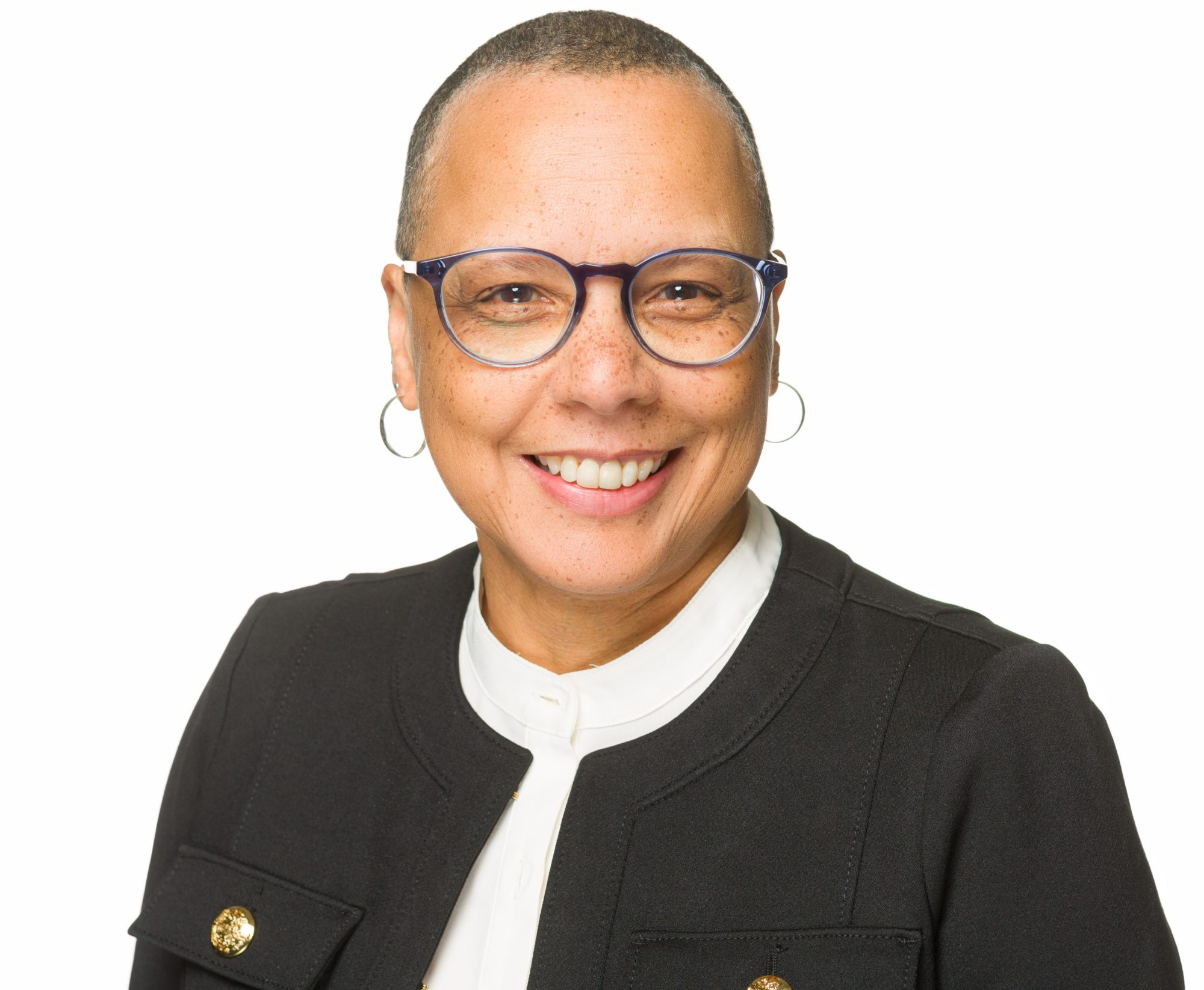
Tonya Jackson, With over 30 years of experience, Jackson is responsible for Lexmark’s award-winning imaging technology product delivery. She leads the combined hardware and supplies development, supply chain, manufacturing, and service delivery organizations. Jackson helps Improve the customer experience by integrating product lifecycle management strategies across the very talented Lexmark organization. Connect with Tonya on LinkedIn.
